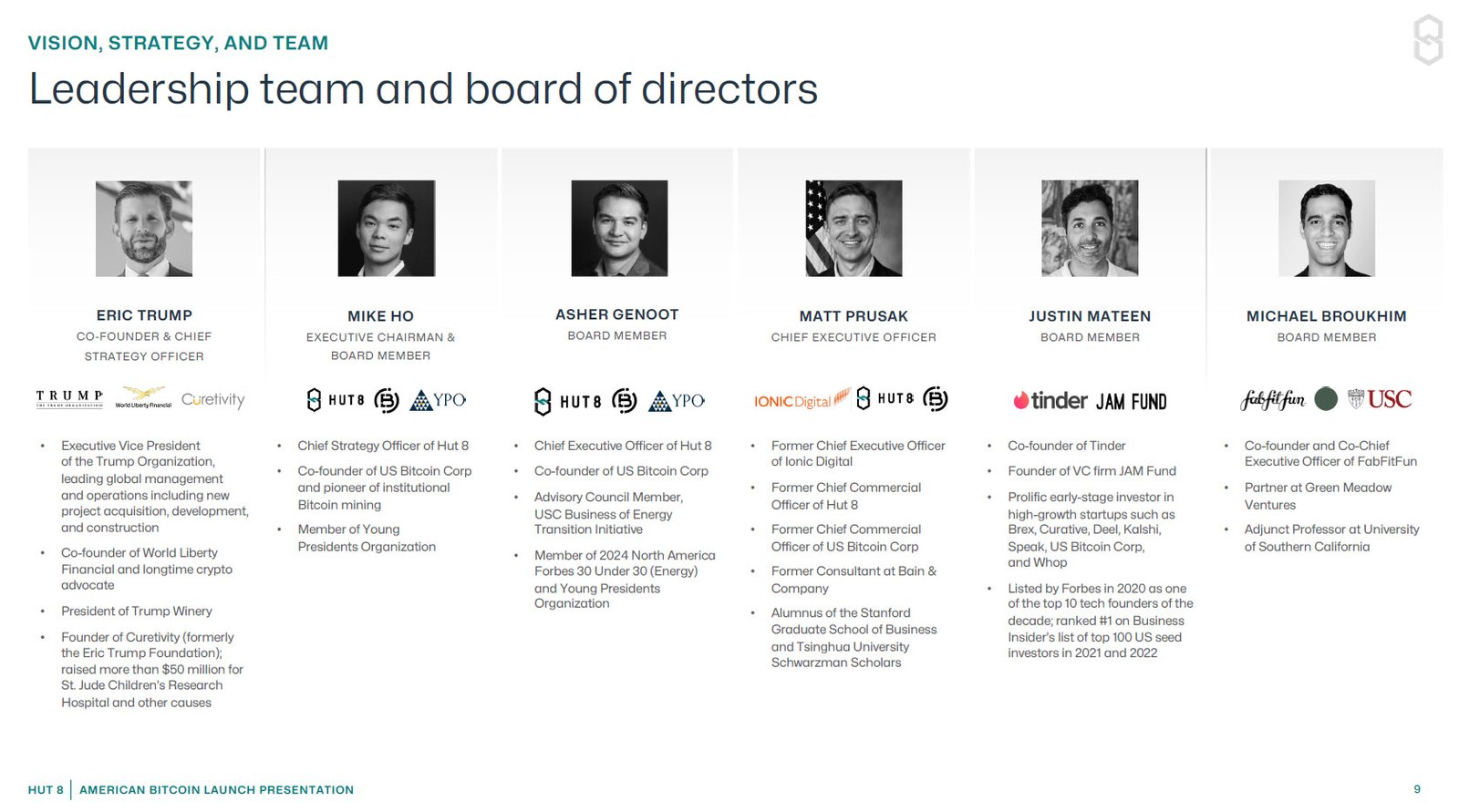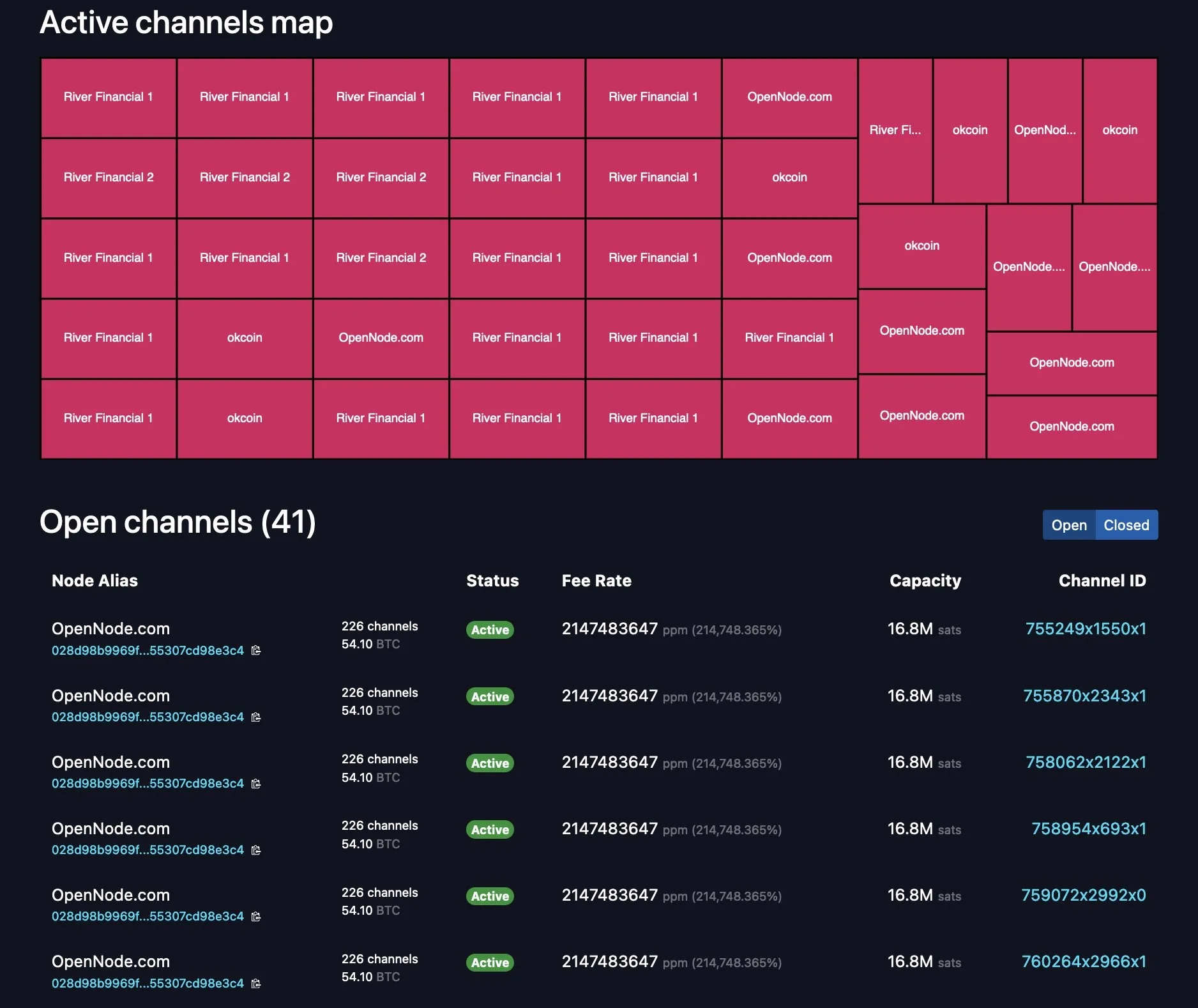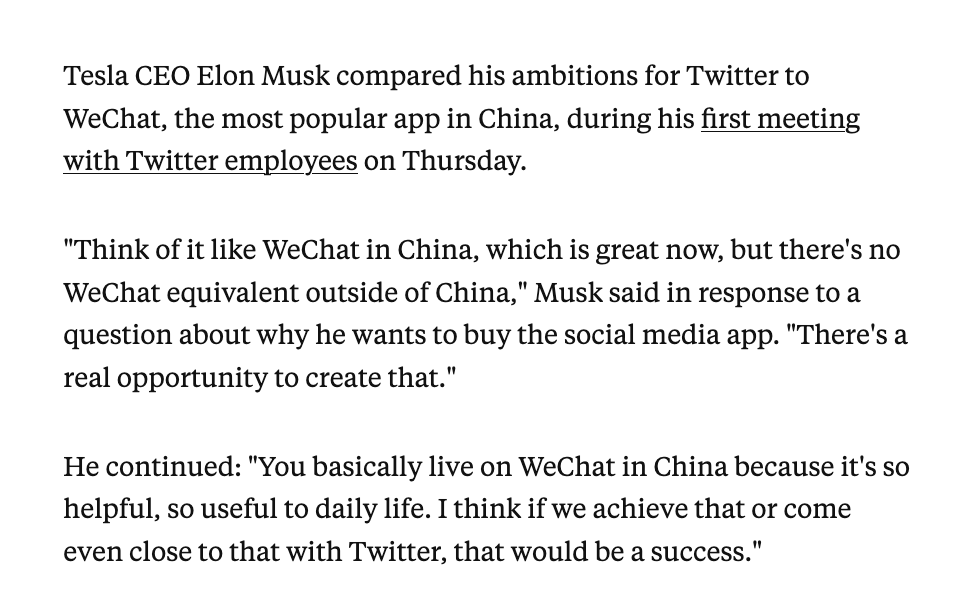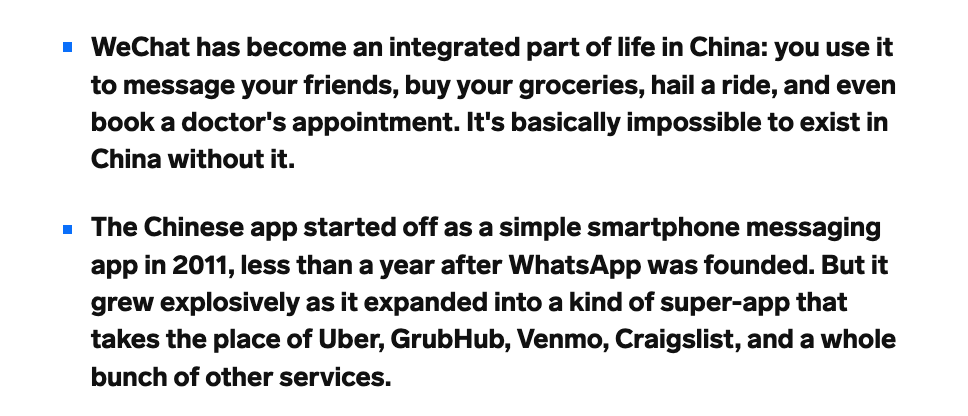-
 @ 9ca447d2:fbf5a36d
2025-05-21 18:01:33
@ 9ca447d2:fbf5a36d
2025-05-21 18:01:33Tokyo-listed investment firm Metaplanet has officially surpassed El Salvador in bitcoin holdings after its biggest-ever single purchase of the scarce digital asset.
On May 12, 2025, the company announced it had bought 1,241 Bitcoin (BTC) for approximately $123.8 million, or ¥18.4 billion. The average price per coin was about $102,111, marking the firm’s largest purchase to date.
This latest buy brings Metaplanet’s total bitcoin reserves to 6,796 BTC, worth over $700 million.
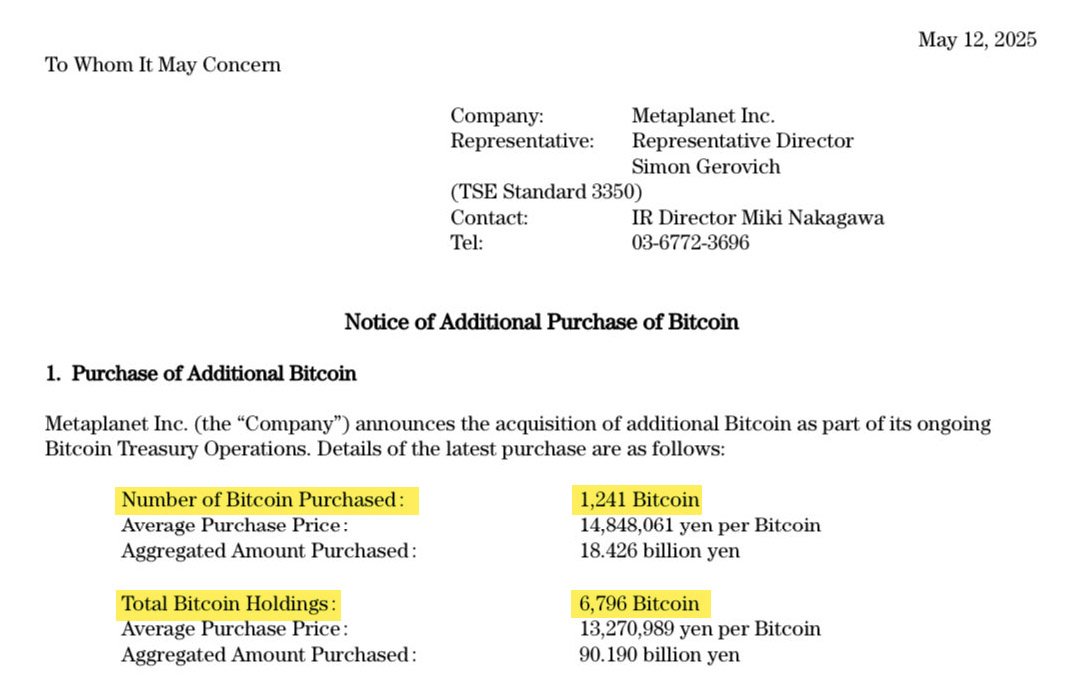
Metaplanet on X
That puts Metaplanet ahead of El Salvador, the Central American nation that made headlines in 2021 for adopting bitcoin as legal tender. According to its National Bitcoin Office, El Salvador currently holds 6,174 BTC, worth roughly $642 million.
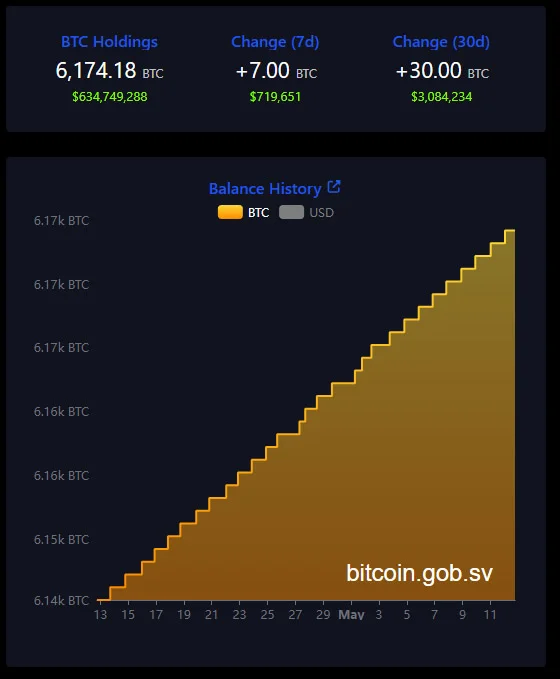
El Salvador bitcoin holdings — bitcoin.gob.sv
“Metaplanet now holds more bitcoin than El Salvador. From humble beginnings to rivaling nation-states, we’re just getting started,” said CEO Simon Gerovich on X after the company’s announcement.
The Japanese investment company started its bitcoin treasury strategy in April 2024 and has become the largest corporate holder of bitcoin in Asia and 11th globally. It aims to hold 10,000 BTC by the end of 2025.
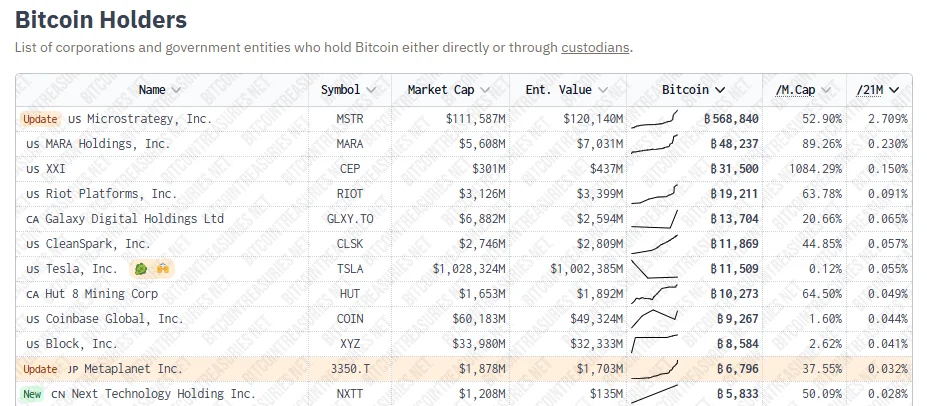
Metaplanet is now the 11th largest corporate holder of bitcoin — BitcoinTreasuries
To fund these purchases, the firm has turned to bond issuances, including zero-percent bonds. In early May, Metaplanet issued $25 million worth of 0% bonds under its EVO FUND program to finance bitcoin buys without diluting shares or taking on traditional debt.
And Metaplanet’s strategy seems to be working. Its BTC Yield — a proprietary metric that measures bitcoin accumulation per share — is 38% for Q2 2025 so far. In previous quarters, the firm reported 95.6% in Q1 and a whopping 309.8% in Q4 2024.
The stock price has also gone up 1,800% since May 2024 and 51% in 2025 alone, currently trading above 550 JPY.
Metaplanet is often called “Japan’s MicroStrategy”, a reference to the U.S.-based company Strategy (formerly MicroStrategy) led by Bitcoin advocate Michael Saylor. Strategy is the world’s largest corporate bitcoin holder with over 568,840 BTC in its coffers, worth more than $58 billion.
Like Strategy, Metaplanet is using creative financing tools such as convertible bonds and non-dilutive bond issuance to build a big bitcoin treasury. These financial instruments give the company the ability to fund further bitcoin purchases without diluting shareholders’ value.
Metaplanet is buying bitcoin very rapidly. This has become a trend in the corporate world, where private companies are challenging nation-states in the digital asset space.
Unlike governments which face regulatory and political hurdles, corporations like Metaplanet can move quickly and decisively. Since 2020 over 80 publicly traded companies have collectively bought more than 632,000 BTC worth over $65 billion.
This is a fundamental shift in how companies manage their treasuries — moving away from cash or bonds and towards the digital scarcity that bitcoin presents.
This creates a new form of financial power where corporations can hold a significant portion of a finite asset, unlike fiat currencies which governments can print to infinity.
-
 @ 0e9491aa:ef2adadf
2025-05-21 18:01:15
@ 0e9491aa:ef2adadf
2025-05-21 18:01:15
People forget Bear Stearns failed March 2008 - months of denial followed before the public realized how bad the situation was under the surface.
Similar happening now but much larger scale. They did not fix fundamental issues after 2008 - everything is more fragile.
The Fed preemptively bailed out every bank with their BTFP program and First Republic Bank still failed. The second largest bank failure in history.
There will be more failures. There will be more bailouts. Depositors will be "protected" by socializing losses across everyone.
Our President and mainstream financial pundits are currently pretending the banking crisis is over while most banks remain insolvent. There are going to be many more bank failures as this ponzi system unravels.
Unlike 2008, we have the ability to opt out of these broken and corrupt institutions by using bitcoin. Bitcoin held in self custody is unique in its lack of counterparty risk - you do not have to trust a bank or other centralized entity to hold it for you. Bitcoin is also incredibly difficult to change by design since it is not controlled by an individual, company, or government - the supply of dollars will inevitably be inflated to bailout these failing banks but bitcoin supply will remain unchanged. I do not need to convince you that bitcoin provides value - these next few years will convince millions.
If you found this post helpful support my work with bitcoin.

-
 @ eb0157af:77ab6c55
2025-05-21 18:01:13
@ eb0157af:77ab6c55
2025-05-21 18:01:13The exchange, which collapsed in 2022, will distribute $5 billion to creditors starting May 30.
On May 30, FTX will begin the second phase of repayments, delivering over $5 billion to eligible creditors. According to the official announcement, payments will be processed through two main providers: BitGo and Kraken.
Creditors can expect to receive their funds within a relatively short period — from one to three business days after the distribution begins. This second round focuses on creditors with claims over $50,000, following the first repayment phase launched in February for smaller claims.
John Ray III, current CEO of FTX, has allocated about $11.4 billion for customer repayments. Creditors will receive amounts calculated based on the value of crypto assets at the time of the bankruptcy filing (November 2022).
Variable repayment percentages
The distribution plan foresees differentiated payout rates based on the various categories of claims:
- Dotcom customer claims will receive 72%;
- U.S. customer claims will get 54%;
- General unsecured claims and claims from digital asset loans will each receive 61%;
- Convenience class claims will see a 120% repayment.
“These initial distributions to non-convenience classes mark a significant milestone for FTX,” stated the exchange’s CEO.
Requirements to claim repayments
To receive payments, creditors must complete several mandatory steps:
- Log into the FTX Customer Portal;
- Complete KYC (Know Your Customer) verification;
- Submit the required tax forms;
- Complete onboarding with BitGo or Kraken.
The post FTX: over $5 billion ready for creditors in second repayment phase appeared first on Atlas21.
-
 @ dfa02707:41ca50e3
2025-05-21 18:00:56
@ dfa02707:41ca50e3
2025-05-21 18:00:56Contribute to keep No Bullshit Bitcoin news going.
- Coinswap is a decentralized protocol for private, trustless cryptocurrency swaps. It allows participants to securely swap digital assets without intermediaries, using advanced cryptographic techniques and atomic swaps to ensure privacy and security.
- This release introduces major improvements to the protocol's efficiency, security, and usability, including custom in-memory UTXO indexes, more advanced coin-selection algorithms, fidelity bond management and more.
- The update also improves user experience with full Mac support, faster Tor connections, enhanced UI/UX, a unified API, and improved protocol documentation.
"The Project is under active beta development and open for contributions and beta testing. The Coinswap market place is live in testnet4. Bug fixes and feature requests are very much welcome."
- Manuals and demo docs are available here.
What's new
- Core protocol and performance improvements:
- Custom in-memory UTXO indexes. Frequent Core RPC calls, which caused significant delays, have been eliminated by implementing custom in-memory UTXO indexes. These indexes are also saved to disk, leading to faster wallet synchronization.
- Coin selection. Advanced coin-selection algorithms, like those in Bitcoin Core, have been incorporated, enhancing the efficiency of creating different types of transactions.
- Fidelity management. Maker servers now automate tasks such as checking bond expiries, redemption, and recreation for Fidelity Bonds, reducing the user's management responsibilities.
- Taker liveness. The
WaitingFundingConfirmationmessage has been added to keep swap connections between Takers and Makers, assisting with variable block confirmation delays.
-
User experience and compatibility:
- Mac compatibility. The crate and apps now fully support Mac.
- Tor operations are streamlined for faster, more resilient connections. Tor addresses are now consistently linked to the wallet seed, maintaining the same onion address through system reboots.
- The UI/UX improvements enhance the display of balances, UTXOs, offer data, fidelity bonds, and system logs. These updates make the apps more enjoyable and provide clearer coin swap logs during the swap process.
-
API design improvements. Transaction creation routines have been streamlined to use a single common API, which reduces technical debt and eliminates redundant code.
- Protocol spec documentation now details how Coinswap breaks the transaction graph and improves privacy through routed swaps and amount splitting, and includes diagrams for clarity.

Source: Coinswap Protocol specification.

-
 @ dfa02707:41ca50e3
2025-05-21 18:00:52
@ dfa02707:41ca50e3
2025-05-21 18:00:52Contribute to keep No Bullshit Bitcoin news going.
- RoboSats v0.7.7-alpha is now available!
NOTE: "This version of clients is not compatible with older versions of coordinators. Coordinators must upgrade first, make sure you don't upgrade your client while this is marked as pre-release."
- This version brings a new and improved coordinators view with reviews signed both by the robot and the coordinator, adds market price sources in coordinator profiles, shows a correct warning for canceling non-taken orders after a payment attempt, adds Uzbek sum currency, and includes package library updates for coordinators.

Source: RoboSats.
- siggy47 is writing daily RoboSats activity reviews on stacker.news. Check them out here.
- Stay up-to-date with RoboSats on Nostr.
What's new
- New coordinators view (see the picture above).
- Available coordinator reviews signed by both the robot and the coordinator.
- Coordinators now display market price sources in their profiles.

Source: RoboSats.
- Fix for wrong message on cancel button when taking an order. Users are now warned if they try to cancel a non taken order after a payment attempt.
- Uzbek sum currency now available.
- For coordinators: library updates.
- Add docker frontend (#1861).
- Add order review token (#1869).
- Add UZS migration (#1875).
- Fixed tests review (#1878).
- Nostr pubkey for Robot (#1887).
New contributors
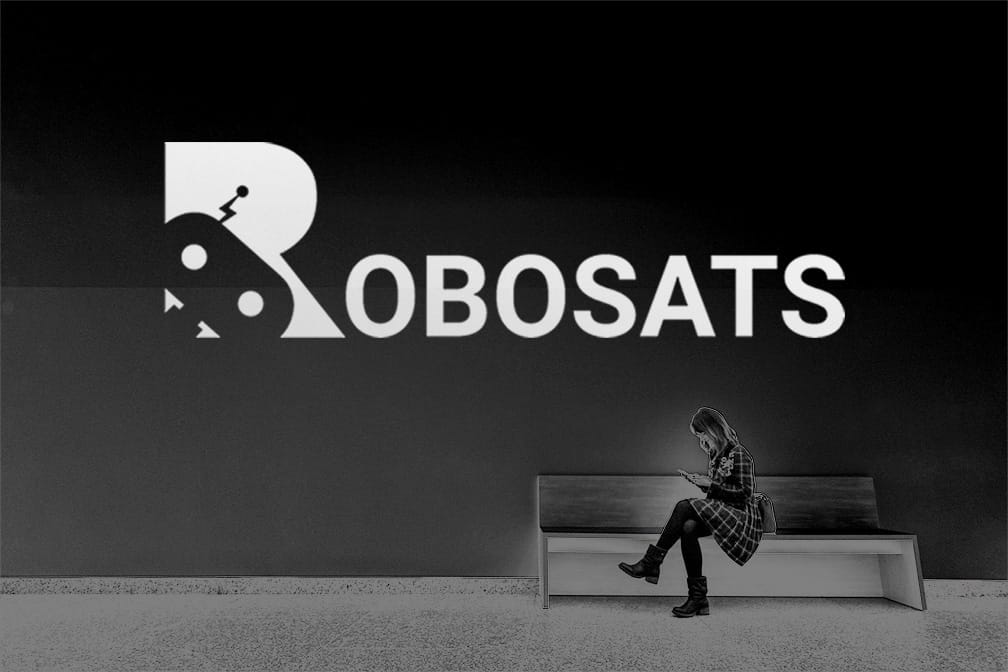
Full Changelog: v0.7.6-alpha...v0.7.7-alpha
-
 @ cae03c48:2a7d6671
2025-05-21 18:00:46
@ cae03c48:2a7d6671
2025-05-21 18:00:46Bitcoin Magazine
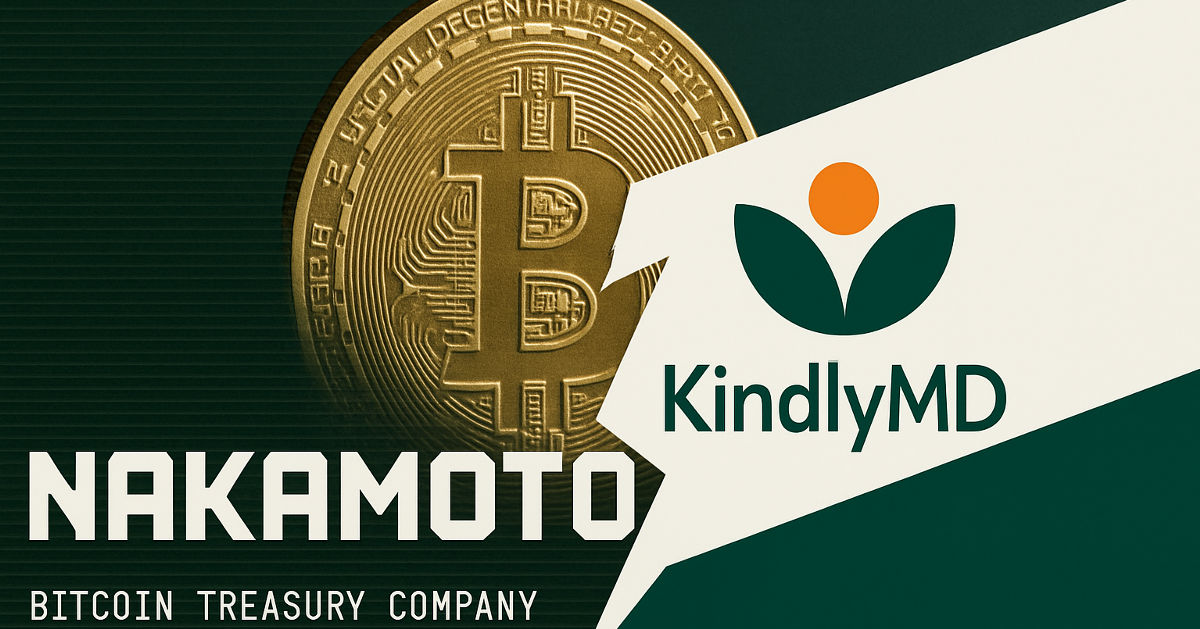
KindlyMD Shareholders Approve Merger with Bitcoin Treasury Company NakamotoKindlyMD, Inc. has secured shareholder approval for its proposed merger with Nakamoto Holdings Inc., marking a major step toward becoming one of the biggest Bitcoin treasury companies on the market.
The majority of KindlyMD’s shareholders delivered written consent in favor of the merger on May 18, 2025. The transaction is now on track to close in the third quarter of 2025, following the SEC’s review and distribution of an information statement to shareholders. Under current terms, the deal will close 20 days after the statement is mailed.
Full release: https://t.co/jsn4XNW1dK
"We are pleased to achieve this important milestone in the merger process," said Tim Pickett, CEO of KindlyMD. "As a combined company, we are excited to leverage Bitcoin's dominance and real-world utility to strengthen our company and drive… pic.twitter.com/YPD3ajZFNf— KindlyMD (@KindlyMD) May 20, 2025
“This milestone brings us one step closer to unlocking Bitcoin’s potential for KindlyMD shareholders,” said David Bailey, Founder and CEO of Nakamoto. “We are grateful that KindlyMD shares our vision for a future in which Bitcoin is a core part of the corporate balance sheet, and investors across global capital markets have exposure to the world’s greatest asset and store of value.”
Nakamoto is building a global portfolio of companies aligned around Bitcoin’s core principles. Through treasury strategy and targeted acquisitions, the company aims to redefine capital markets infrastructure with Bitcoin at the center.
KindlyMD, meanwhile, brings to the table a unique model of integrated, data-driven healthcare focused on reducing opioid dependence and improving outcomes through personalized treatment and alternative medicine education. Its clinical services are reimbursed through Medicare, Medicaid, and commercial insurance.
Tim Pickett, CEO of KindlyMD, emphasized the strategic benefits of the deal: “We are pleased to achieve this important milestone in the merger process. As a combined company, we are excited to leverage Bitcoin’s dominance and real-world utility to strengthen our company and drive sustained long-term value for our investors.”
Disclosure: Nakamoto is in partnership with Bitcoin Magazine’s parent company BTC Inc to build the first global network of Bitcoin treasury companies, where BTC Inc provides certain marketing services to Nakamoto. More information on this can be found here.
This post KindlyMD Shareholders Approve Merger with Bitcoin Treasury Company Nakamoto first appeared on Bitcoin Magazine and is written by Jenna Montgomery.
-
 @ cae03c48:2a7d6671
2025-05-21 18:00:42
@ cae03c48:2a7d6671
2025-05-21 18:00:42Bitcoin Magazine

Bitcoin Price Breaks Record All Time High With Surge Above $109,000Bitcoin soared to a new all-time high today, crossing $109,000 and peaking at $109,800 before settling at $109,378 on Coinbase. The historic price milestone comes as institutional inflows and favorable policy developments fuel growing confidence in the world’s leading digital asset.
BREAKING: #BITCOIN HAS HIT A NEW ALL TIME HIGH
 pic.twitter.com/3TeTlF6bIS
pic.twitter.com/3TeTlF6bIS— Bitcoin Magazine (@BitcoinMagazine) May 21, 2025
Bitcoin’s ascent reflects a surge in momentum across traditional finance and political circles. Nearly $1 billion in inflows poured into Bitcoin ETFs over just two trading days this week, according to data from Farside Investors—underscoring the deepening demand from institutional investors.
“Bitcoin is pushing toward new highs with strong tailwinds behind it—from steady ETF inflows to a broader shift in political tone,” said Joe DiPasquale, CEO of BitBull Capital. “This doesn’t feel like a short-term squeeze—it’s a more sustained bid that reflects a structural shift in how investors are viewing Bitcoin. It’s moving from a speculative trade to a strategic allocation.”
Bitcoin’s consistent performance and growing adoption among institutional players have increasingly positioned it as more than just a speculative asset. As traditional financial institutions—including JPMorgan—open channels for client access to Bitcoin, and as industry leaders like Coinbase are added to major indexes, Bitcoin’s role as a cornerstone of the modern financial system continues to solidify.
Investor enthusiasm has also been supported by legislative progress in Washington. The U.S. Senate this week advanced bipartisan legislation to create a federal framework for stablecoins—a major win for the digital asset industry and a sign of increasing government engagement with crypto infrastructure.
JUST IN: Legislation to create a regulatory framework for stablecoins The GENIUS Act passes motion to proceed to the consideration of the bill

The bill now goes to the amendment process. pic.twitter.com/KjDAAofZSj
— Bitcoin Magazine (@BitcoinMagazine) May 21, 2025
“Stablecoin legislation is about to pass the Senate, and Bitcoin just hit a new all time high,” President Donald Trump’s AI & Crypto Czar David Sacks posted today on X
Additionally, President Donald Trump has embraced the sector with vocal support and direct policy action. Earlier this year, his administration established an official “strategic bitcoin reserve” for the U.S. government and eased several regulatory pressures on major crypto firms, reinforcing Bitcoin’s standing as a legitimate financial instrument.
With market dynamics aligning and global interest accelerating, Bitcoin’s breakout above $109,800 marks not just a record high but may be a sign of what’s next to come.
“If you’re not buying bitcoin at the all-time high, you’re leaving money on the table,” posted Strategy Executive Chairman Michae Saylor.
This post Bitcoin Price Breaks Record All Time High With Surge Above $109,000 first appeared on Bitcoin Magazine and is written by Jenna Montgomery.
-
 @ b1ddb4d7:471244e7
2025-05-21 18:00:33
@ b1ddb4d7:471244e7
2025-05-21 18:00:33Custodial Lightning wallets allow users to transact without managing private keys or channel liquidity. The provider handles technical complexities, but this convenience comes with critical trade-offs:
- You don’t control your keys: The custodian holds your bitcoin.
- Centralized points of failure: Servers can be hacked or shut down.
- Surveillance risks: Providers track transaction metadata.
Key Risks of Custodial Lightning Wallets
*1. Hacks and Exit Scams*
Custodians centralize large amounts of bitcoin, attracting hackers:
- Nearly $2.2 billion worth of funds were stolen from hacks in 2024.
- Lightning custodians suffered breaches, losing user funds.
Unlike non-custodial wallets, victims have no recourse since they don’t hold keys.
*2. Censorship and Account Freezes*
Custodians comply with regulators, risking fund seizures:
- Strike (a custodial Lightning app) froze accounts of users in sanctioned regions.
- A U.K. court in 2020 ordered Bitfinex to freeze bitcoin worth $860,000 after the exchange and blockchain sleuthing firm Chainalysis traced the funds to a ransomware payment.
*3. Privacy Erosion*
Custodians log user activity, exposing sensitive data:
- Transaction amounts, receiver addresses, and IPs are recorded.
*4. Service Downtime*
Centralized infrastructure risks outages.
*5. Inflation of Lightning Network Centralization*
Custodians dominate liquidity, weakening network resilience:
- At the moment, 10% of the nodes on Lightning control 80% of the liquidity.
- This centralization contradicts bitcoin’s decentralized ethos.
How to Switch to Self-Custodial Lightning Wallets
Migrating from custodial services is straightforward:
*1. Choose a Non-Custodial Wallet*
Opt for wallets that let you control keys and channels:
- Flash: The self-custodial tool that lets you own your keys, control your coins, and transact instantly.
- Breez Wallet : Non-custodial, POS integrations.
- Core Lightning : Advanced, for self-hosted node operators.
*2. Transfer Funds Securely*
- Withdraw funds from your custodial wallet to a bitcoin on-chain address.
- Send bitcoin to your non-custodial Lightning wallet.
*3. Set Up Channel Backups*
Use tools like Static Channel Backups (SCB) to recover channels if needed.
*4. Best Practices*
- Enable Tor: Mask your IP (e.g., Breez’s built-in Tor support).
- Verify Receiving Addresses: Avoid phishing scams.
- Regularly Rebalance Channels: Use tools like Lightning Pool for liquidity.
Why Self-Custodial Lightning Matters
- Self-custody: Control your keys and funds.
- Censorship resistance: No third party can block transactions.
- Network health: Decentralized liquidity strengthens Lightning.
Self-custodial wallets now rival custodial ease.
Custodial Lightning wallets sacrifice security for convenience, putting users at risk of hacks, surveillance, and frozen funds. As bitcoin adoption grows, so does the urgency to embrace self-custodial solutions.
Take action today:
- Withdraw custodial funds to a hardware wallet.
- Migrate to a self-custodial Lightning wallet.
- Educate others on the risks of custodial control.
The Lightning Network’s potential hinges on decentralization—don’t let custodians become its Achilles’ heel.
-
 @ 9ca447d2:fbf5a36d
2025-05-21 18:01:36
@ 9ca447d2:fbf5a36d
2025-05-21 18:01:36UFC legend Conor McGregor has entered the Bitcoin space, calling on his home country of Ireland to create a national Bitcoin reserve. The proposal has sparked a frenzy online and across Ireland.
McGregor, famous globally for his UFC achievements, is now pushing for a financial revolution in Ireland. In a recent post on X, the 36-year-old fighter said Bitcoin can give power back to the people.
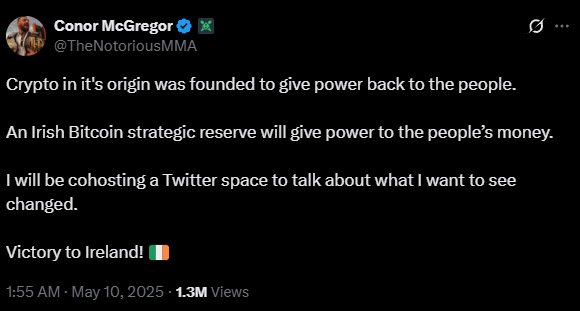
Conor McGregor on X
“Crypto in its origin was founded to give power back to the people,” McGregor wrote. “An Irish Bitcoin strategic reserve will give power to the people’s money.”
The post went viral with over 735,000 views in under 12 hours. McGregor announced he will be co-hosting a Twitter Space to discuss his vision and invited Bitcoin experts and public figures to join.
McGregor’s call for a bitcoin reserve is not an isolated event. It comes at a time when several other countries are exploring or have already added bitcoin to their national strategies.
The U.S. recently made headlines when President Donald Trump signed an executive order to create a Strategic Bitcoin Reserve. Arizona and New Hampshire have also done it at the state level.
El Salvador and Bhutan have also taken the same step. There have been reports of Russia planning to add bitcoin to its reserves by 2028 and the Polish government has proposals to do the same.
McGregor says Ireland shouldn’t be left behind. He believes bitcoin’s fixed supply, neutrality and decentralization make it the perfect hedge against inflation and a modern alternative to gold.
“Now it’s time to change the crypto game,” McGregor posted, signaling he will bring digital assets into the national conversation.
Many of McGregor’s fans and Bitcoin enthusiasts are on board with the idea, but some experts and commenters are urging caution. There are comments on his social media posts telling him to focus on Bitcoin only and not include other cryptos in the reserve.
They warned him to choose his words more carefully, not to mix “crypto” with Bitcoin. Daniel Sempere Pico commented:
“Crypto is mostly hot air and scams. Bitcoin is not crypto. Focus on bitcoin, Conor. Focus on bitcoin.”
McGregor’s call for a reserve comes as he launches his political career. In March 2025 he announced he will run as an independent candidate for the Irish presidency. His campaign is focused on crime reduction, stricter immigration and now financial reform through Bitcoin.
If elected, McGregor says he will bring change to Ireland, starting with how the country handles its national reserves. He wants bitcoin to be the cornerstone of a modern decentralized financial strategy.
But it might be a big ask. Ireland has not commented on McGregor’s proposal and experts say it’s got major regulatory and political hurdles.
As an independent candidate with no party backing, McGregor will need to build public and political support to make it happen.
-
 @ b1ddb4d7:471244e7
2025-05-21 18:00:32
@ b1ddb4d7:471244e7
2025-05-21 18:00:32The upcoming Bitcoin 2025 conference, scheduled from May 27–29 at the Venetian Conference Center in Las Vegas, is set to make history with an official attempt to break the GUINNESS WORLD RECORDS® title for the most Bitcoin point-of-sale transactions in an eight-hour period.
Organized by BTC Inc, the event will showcase Bitcoin’s evolution from a digital capital asset to a practical medium of exchange, leveraging the latest advancements in payment technology.
Tap-to-Pay with Lightning-Ready Bolt Cards
To facilitate this record-setting attempt, 4,000 Lightning-ready Bolt Cards will be distributed to conference attendees.
— Uncle Rockstar Developer (@r0ckstardev) May 15, 2025
These NFC-enabled cards allow users to make instant, contactless Bitcoin payments at vendor booths throughout the expo-no apps or QR codes required, just a simple tap.
The cards are available in four collectible designs, each featuring a prominent figure in Bitcoin’s history: Senator Cynthia Lummis, Michael Saylor, Satoshi Nakamoto, and Jack Dorsey.
Each attendee will receive a randomly assigned card, making them both functional and collectible souvenirs.
Senator Lummis: A Playful Provocation
Notably, one of the card designs features Senator Cynthia Lummis with laser eyes-a playful nod to her reputation as a leading Bitcoin advocate in US politics.
While Lummis is known for her legislative efforts to promote Bitcoin integration, she has publicly stated she prefers to “spend dollars and save Bitcoin,” viewing BTC as a long-term store of value rather than a daily currency.
The choice to feature her on the Bolt Card, could be suggested by Rockstar Dev of the BTC Pay Server Foundation, perhaps a lighthearted way to highlight the ongoing debate about Bitcoin’s role in everyday payments.
Nothing cracks me up quite like a senator that wants the US to buy millions of Bitcoin use dollars to buy a beer at a Bitcoin bar.
This is how unserious some of you are. pic.twitter.com/jftIEggmip
— Magoo PhD (@HodlMagoo) April 4, 2025
How Bolt Cards and the Lightning Network Work
Bolt Cards are physical cards equipped with NFC (Near Field Communication) technology, similar to contactless credit or debit cards. When linked to a compatible Lightning wallet, they enable users to make Bitcoin payments over the Lightning Network by simply tapping the card at a point-of-sale terminal.
The Lightning Network is a second-layer protocol built on top of Bitcoin, designed to facilitate instant, low-cost transactions ideal for everyday purchases.
This integration aims to make Bitcoin as easy to use as traditional payment methods, eliminating the need for QR code scanning or mobile apps.
A Showcase for Bitcoin’s Real-World Usability
With over 30,000 attendees, 300 exhibitors, and 500 speakers expected, the Bitcoin 2025 conference is poised to be the largest Bitcoin event of the year-and potentially the most transactional.
The event will feature on-site activations such as the Official Bitcoin Magazine Store, where all merchandise will be available at a 21% discount for those paying with Bitcoin via the Lightning Network-a nod to Bitcoin’s 21 million coin supply limit.
By deeply integrating Lightning payments into the conference experience, organizers hope to demonstrate Bitcoin’s readiness for mainstream commerce and set a new benchmark for its practical use as a currency.
Conclusion
The Guinness World Record attempt at Bitcoin 2025 is more than a publicity stunt-it’s a bold demonstration of Bitcoin’s technological maturity and its potential to function as a modern, everyday payment method.
Whether or not the record is set, the event will serve as a milestone in the ongoing journey to make Bitcoin a truly global, user-friendly currency
-
 @ bd4ae3e6:1dfb81f5
2025-05-20 08:46:08
@ bd4ae3e6:1dfb81f5
2025-05-20 08:46:08 -
 @ bd4ae3e6:1dfb81f5
2025-05-20 08:46:06
@ bd4ae3e6:1dfb81f5
2025-05-20 08:46:06 -
 @ b1ddb4d7:471244e7
2025-05-21 18:00:30
@ b1ddb4d7:471244e7
2025-05-21 18:00:30Flash, an all-in-one Bitcoin payment platform, has announced the launch of Flash 2.0, the most intuitive and powerful Bitcoin payment solution to date.
With a completely redesigned interface, expanded e-commerce integrations, and a frictionless onboarding process, Flash 2.0 makes accepting Bitcoin easier than ever for businesses worldwide.
 We did the unthinkable!
We did the unthinkable! Website monetization used to be super complicated.
"Buy me a coffee" — But only if we both have a bank account.
WHAT IF WE DON'T?
Thanks to @paywflash and bitcoin, it's just 5 CLICKS – and no banks!
 Start accepting donations on your website… pic.twitter.com/uwZUrvmEZ1
Start accepting donations on your website… pic.twitter.com/uwZUrvmEZ1— Flash • The Bitcoin Payment Gateway (@paywflash) May 13, 2025
Accept Bitcoin in Three Minutes
Setting up Bitcoin payments has long been a challenge for merchants, requiring technical expertise, third-party processors, and lengthy verification procedures. Flash 2.0 eliminates these barriers, allowing any business to start accepting Bitcoin in just three minutes, with no technical set-up and full control over their funds.
The Bitcoin Payment Revolution
The world is witnessing a seismic shift in finance. Governments are backing Bitcoin funds, major companies are adding Bitcoin to their balance sheets, and political figures are embracing it as the future of money. Just as Stripe revolutionized internet payments, Flash is now doing the same for Bitcoin. Businesses that adapt today will gain a competitive edge in a rapidly evolving financial landscape.
With Bitcoin adoption accelerating, consumers are looking for places to spend it. Flash 2.0 ensures businesses of all sizes can seamlessly accept Bitcoin and position themselves at the forefront of this financial revolution.
All-in-One Monetization Platform
More than just a payment gateway, Flash 2.0 is a complete Bitcoin monetization suite, providing multiple ways for businesses to integrate Bitcoin into their operations. Merchants can accept payments online and in-store, content creators can monetize with donations and paywalls, and freelancers can send instant invoices via payment links.
For example, a jewelry designer selling products on WooCommerce can now integrate Flash for online payments, use Flash’s Point-of-Sale system at trade shows, enable Bitcoin donations for her digital artwork, and lock premium content behind Flash Paywalls. The possibilities are endless.
E-Commerce for Everyone
With built-in integrations for Shopify, WooCommerce, and soon Wix and OpenCart, Flash 2.0 enables Bitcoin payments on 95% of e-commerce stores worldwide. Businesses can now add Bitcoin as a payment option in just a few clicks—without needing developers or external payment processors.
And for those looking to start selling, Flash’s built-in e-commerce features allow users to create online stores, showcase products, and manage payments seamlessly.
No Middlemen, No Chargebacks, No Limits
Unlike traditional payment platforms, Flash does not hold or process funds. Businesses receive Bitcoin directly, instantly, and securely. There are no chargebacks, giving merchants full control over refunds and eliminating fraud. Flash also remains KYC-free, ensuring a seamless experience for businesses and customers alike.
A Completely Redesigned Experience
“The world is waking up to Bitcoin. Just like the internet revolutionized commerce, Bitcoin is reshaping finance. Businesses need solutions that are simple, efficient, and truly decentralized. Flash 2.0 is more than just a payment processor—it’s a gateway to the future of digital transactions, putting financial power back into the hands of businesses.”
— Pierre Corbin, CEO at Flash.
Flash 2.0 introduces a brand-new user interface, making it easier than ever to navigate, set up payments, and manage transactions. With an intuitive dashboard, streamlined checkout, and enhanced mobile compatibility, the platform is built for both new and experienced Bitcoin users.
About Flash
Flash is an all-in-one Bitcoin payment platform that empowers businesses, creators, and freelancers to accept, manage, and grow with Bitcoin. With a mission to make Bitcoin payments accessible to everyone, Flash eliminates complexity and gives users full control over their funds.
To learn more or get started, visit www.paywithflash.com.
Press Contact:
Julien Bouvier
Head of Marketing
+3360941039 -
 @ b1ddb4d7:471244e7
2025-05-21 18:00:29
@ b1ddb4d7:471244e7
2025-05-21 18:00:29Bitcoin FilmFest (BFF25) returns to Warsaw for its third edition, blending independent cinema—from feature films and commercials to AI-driven experimental visuals—with education and entertainment.
Hundreds of attendees from around the world will gather for three days of screenings, discussions, workshops, and networking at the iconic Kinoteka Cinema (PKiN), the same venue that hosted the festival’s first two editions in March 2023 and April 2024.
This year’s festival, themed “Beyond the Frame,” introduces new dimensions to its program, including an extra day on May 22 to celebrate Bitcoin Pizza Day, the first real-world bitcoin transaction, with what promises to be one of Europe’s largest commemorations of this milestone.
BFF25 bridges independent film, culture, and technology, with a bold focus on decentralized storytelling and creative expression. As a community-driven cultural experience with a slightly rebellious spirit, Bitcoin FilmFest goes beyond movies, yet cinema remains at its heart.
Here’s a sneak peek at the lineup, specially curated for movie buffs:
 Generative Cinema – A special slot with exclusive shorts and a thematic debate on the intersection of AI and filmmaking. Featured titles include, for example: BREAK FREE, SATOSHI: THE CREATION OF BITCOIN, STRANGE CURRENCIES, and BITCOIN IS THE MYCELIUM OF MONEY, exploring financial independence, traps of the fiat system, and a better future built on sound money.
Generative Cinema – A special slot with exclusive shorts and a thematic debate on the intersection of AI and filmmaking. Featured titles include, for example: BREAK FREE, SATOSHI: THE CREATION OF BITCOIN, STRANGE CURRENCIES, and BITCOIN IS THE MYCELIUM OF MONEY, exploring financial independence, traps of the fiat system, and a better future built on sound money. Upcoming Productions Preview – A bit over an hour-long block of unreleased pilots and works-in-progress. Attendees will get exclusive first looks at projects like FINDING HOME (a travel-meets-personal-journey series), PARALLEL SPACES (a story about alternative communities), and THE LEGEND OF LANDI (a mysterious narrative).
Upcoming Productions Preview – A bit over an hour-long block of unreleased pilots and works-in-progress. Attendees will get exclusive first looks at projects like FINDING HOME (a travel-meets-personal-journey series), PARALLEL SPACES (a story about alternative communities), and THE LEGEND OF LANDI (a mysterious narrative). Freedom-Focused Ads & Campaigns – Unique screenings of video commercials, animations, and visual projects, culminating in “The PoWies” (Proof of Work-ies)—the first ever awards show honoring the best Bitcoin-only awareness campaigns.
Freedom-Focused Ads & Campaigns – Unique screenings of video commercials, animations, and visual projects, culminating in “The PoWies” (Proof of Work-ies)—the first ever awards show honoring the best Bitcoin-only awareness campaigns.To get an idea of what might come up at the event, here, you can preview 6 selected ads combined into two 2 videos:
 Open Pitch Competition – A chance for filmmakers to present fresh ideas and unfinished projects to an audience of a dedicated jury, movie fans and potential collaborators. This competitive block isn’t just entertaining—it’s a real opportunity for creators to secure funding and partnerships.
Open Pitch Competition – A chance for filmmakers to present fresh ideas and unfinished projects to an audience of a dedicated jury, movie fans and potential collaborators. This competitive block isn’t just entertaining—it’s a real opportunity for creators to secure funding and partnerships. Golden Rabbit Awards: A lively gala honoring films from the festival’s Official Selection, with awards in categories like Best Feature, Best Story, Best Short, and Audience Choice.
Golden Rabbit Awards: A lively gala honoring films from the festival’s Official Selection, with awards in categories like Best Feature, Best Story, Best Short, and Audience Choice.BFF25 Main Screenings
Sample titles from BFF25’s Official Selection:
 REVOLUCIÓN BITCOIN – A documentary by Juan Pablo, making its first screening outside the Spanish-speaking world in Warsaw this May. Three years of important work, 80 powerful minutes to experience. The film explores Bitcoin’s impact across Argentina, Colombia, Mexico, El Salvador, and Spain through around 40 diverse perspectives. Screening in Spanish with English subtitles, followed by a Q&A with the director.
REVOLUCIÓN BITCOIN – A documentary by Juan Pablo, making its first screening outside the Spanish-speaking world in Warsaw this May. Three years of important work, 80 powerful minutes to experience. The film explores Bitcoin’s impact across Argentina, Colombia, Mexico, El Salvador, and Spain through around 40 diverse perspectives. Screening in Spanish with English subtitles, followed by a Q&A with the director. UNBANKABLE – Luke Willms’ directorial debut, drawing from his multicultural roots and his father’s pioneering HIV/AIDS research. An investigative documentary based on Luke’s journeys through seven African countries, diving into financial experiments and innovations—from mobile money and digital lending to Bitcoin—raising smart questions and offering potential lessons for the West. Its May appearance at BFF25 marks its largest European event to date, following festival screenings and nominations across multiple continents over the past year.
UNBANKABLE – Luke Willms’ directorial debut, drawing from his multicultural roots and his father’s pioneering HIV/AIDS research. An investigative documentary based on Luke’s journeys through seven African countries, diving into financial experiments and innovations—from mobile money and digital lending to Bitcoin—raising smart questions and offering potential lessons for the West. Its May appearance at BFF25 marks its largest European event to date, following festival screenings and nominations across multiple continents over the past year. HOTEL BITCOIN – A Spanish comedy directed by Manuel Sanabria and Carlos “Pocho” Villaverde. Four friends, 4,000 bitcoins , and one laptop spark a chaotic adventure of parties, love, crime, and a dash of madness. Exploring sound money, value, and relationships through a twisting plot. The film premiered at the Tarazona and Moncayo Comedy Film Festival in August 2024. Its Warsaw screening at BFF25 (in Spanish with English subtitles) marks its first public showing outside the Spanish-speaking world.
HOTEL BITCOIN – A Spanish comedy directed by Manuel Sanabria and Carlos “Pocho” Villaverde. Four friends, 4,000 bitcoins , and one laptop spark a chaotic adventure of parties, love, crime, and a dash of madness. Exploring sound money, value, and relationships through a twisting plot. The film premiered at the Tarazona and Moncayo Comedy Film Festival in August 2024. Its Warsaw screening at BFF25 (in Spanish with English subtitles) marks its first public showing outside the Spanish-speaking world.Check out trailers for this year’s BFF25 and past editions on YouTube.
Tickets & Info:
- Detailed program and tickets are available at bitcoinfilmfest.com/bff25.
- Stay updated via the festival’s official channels (links provided on the website).
- Use ‘LN-NEWS’ to get 10% of tickets
-
 @ b1ddb4d7:471244e7
2025-05-21 18:00:28
@ b1ddb4d7:471244e7
2025-05-21 18:00:28Starting January 1, 2026, the United Kingdom will impose some of the world’s most stringent reporting requirements on cryptocurrency firms.
All platforms operating in or serving UK customers-domestic and foreign alike-must collect and disclose extensive personal and transactional data for every user, including individuals, companies, trusts, and charities.
This regulatory drive marks the UK’s formal adoption of the OECD’s Crypto-Asset Reporting Framework (CARF), a global initiative designed to bring crypto oversight in line with traditional banking and to curb tax evasion in the rapidly expanding digital asset sector.
What Will Be Reported?
Crypto firms must gather and submit the following for each transaction:
- User’s full legal name, home address, and taxpayer identification number
- Detailed data on every trade or transfer: type of cryptocurrency, amount, and nature of the transaction
- Identifying information for corporate, trust, and charitable clients
The obligation extends to all digital asset activities, including crypto-to-crypto and crypto-to-fiat trades, and applies to both UK residents and non-residents using UK-based platforms. The first annual reports covering 2026 activity are due by May 31, 2027.
Enforcement and Penalties
Non-compliance will carry stiff financial penalties, with fines of up to £300 per user account for inaccurate or missing data-a potentially enormous liability for large exchanges. The UK government has urged crypto firms to begin collecting this information immediately to ensure operational readiness.
Regulatory Context and Market Impact
This move is part of a broader UK strategy to position itself as a global fintech hub while clamping down on fraud and illicit finance. UK Chancellor Rachel Reeves has championed these measures, stating, “Britain is open for business – but closed to fraud, abuse, and instability”. The regulatory expansion comes amid a surge in crypto adoption: the UK’s Financial Conduct Authority reported that 12% of UK adults owned crypto in 2024, up from just 4% in 2021.
Enormous Risks for Consumers: Lessons from the Coinbase Data Breach
While the new framework aims to enhance transparency and protect consumers, it also dramatically increases the volume of sensitive personal data held by crypto firms-raising the stakes for cybersecurity.
The risks are underscored by the recent high-profile breach at Coinbase, one of the world’s largest exchanges.
In May 2025, Coinbase disclosed that cybercriminals, aided by bribed offshore contractors, accessed and exfiltrated customer data including names, addresses, government IDs, and partial bank details.
The attackers then used this information for sophisticated phishing campaigns, successfully deceiving some customers into surrendering account credentials and funds.
“While private encryption keys remained secure, sufficient customer information was exposed to enable sophisticated phishing attacks by criminals posing as Coinbase personnel.”
Coinbase now faces up to $400 million in compensation costs and has pledged to reimburse affected users, but the incident highlights the systemic vulnerability created when large troves of personal data are centralized-even if passwords and private keys are not directly compromised. The breach also triggered a notable drop in Coinbase’s share price and prompted a $20 million bounty for information leading to the attackers’ capture.
The Bottom Line
The UK’s forthcoming crypto reporting regime represents a landmark in financial regulation, promising greater transparency and tax compliance. However, as the Coinbase episode demonstrates, the aggregation of sensitive user data at scale poses a significant cybersecurity risk.
As regulators push for more oversight, the challenge will be ensuring that consumer protection does not become a double-edged sword-exposing users to new threats even as it seeks to shield them from old ones.
-
 @ b1ddb4d7:471244e7
2025-05-21 18:00:26
@ b1ddb4d7:471244e7
2025-05-21 18:00:26This article was originally published on aier.org
Even after eleven years experience, and a per Bitcoin price of nearly $20,000, the incredulous are still with us. I understand why. Bitcoin is not like other traditional financial assets.
Even describing it as an asset is misleading. It is not the same as a stock, as a payment system, or a money. It has features of all these but it is not identical to them.
What Bitcoin is depends on its use as a means of storing and porting value, which in turn rests of secure titles to ownership of a scarce good. Those without experience in the sector look at all of this and get frustrated that understanding why it is valuable is not so easy to grasp.
In this article, I’m updating an analysis I wrote six years ago. It still holds up. For those who don’t want to slog through the entire article, my thesis is that Bitcoin’s value obtains from its underlying technology, which is an open-source ledger that keeps track of ownership rights and permits the transfer of these rights. Bitcoin managed to bundle its unit of account with a payment system that lives on the ledger. That’s its innovation and why it obtained a value and that value continues to rise.
Consider the criticism offered by traditional gold advocates, who have, for decades, pushed the idea that sound money must be backed by something real, hard, and independently valuable. Bitcoin doesn’t qualify, right? Maybe it does.
Bitcoin first emerged as a possible competitor to national, government-managed money in 2009. Satoshi Nakamoto’s white paper was released October 31, 2008. The structure and language of this paper sent the message: This currency is for computer technicians, not economists nor political pundits. The paper’s circulation was limited; novices who read it were mystified.
But the lack of interest didn’t stop history from moving forward. Two months later, those who were paying attention saw the emergence of the “Genesis Block,” the first group of bitcoins generated through Nakamoto’s concept of a distributed ledger that lived on any computer node in the world that wanted to host it.
Here we are all these years later and a single bitcoin trades at $18,500. The currency is held and accepted by many thousands of institutions, both online and offline. Its payment system is very popular in poor countries without vast banking infrastructures but also in developed countries. And major institutions—including the Federal Reserve, the OECD, the World Bank, and major investment houses—are paying respectful attention and weaving blockchain technology into their operations.
Enthusiasts, who are found in every country, say that its exchange value will soar even more in the future because its supply is strictly limited and it provides a system vastly superior to government money. Bitcoin is transferred between individuals without a third party. It is relatively low-cost to exchange. It has a predictable supply. It is durable, fungible, and divisible: all crucial features of money. It creates a monetary system that doesn’t depend on trust and identity, much less on central banks and government. It is a new system for the digital age.
Hard lessons for hard money
To those educated in the “hard money” tradition, the whole idea has been a serious challenge. Speaking for myself, I had been reading about bitcoin for two years before I came anywhere close to understanding it. There was just something about the whole idea that bugged me. You can’t make money out of nothing, much less out of computer code. Why does it have value then? There must be something amiss. This is not how we expected money to be reformed.
There’s the problem: our expectations. We should have been paying closer attention to Ludwig von Mises’ theory of money’s origins—not to what we think he wrote, but to what he actually did write.
In 1912, Mises released The Theory of Money and Credit. It was a huge hit in Europe when it came out in German, and it was translated into English. While covering every aspect of money, his core contribution was in tracing the value and price of money—and not just money itself—to its origins. That is, he explained how money gets its price in terms of the goods and services it obtains. He later called this process the “regression theorem,” and as it turns out, bitcoin satisfies the conditions of the theorem.
Mises’ teacher, Carl Menger, demonstrated that money itself originates from the market—not from the State and not from social contract. It emerges gradually as monetary entrepreneurs seek out an ideal form of commodity for indirect exchange. Instead of merely bartering with each other, people acquire a good not to consume, but to trade. That good becomes money, the most marketable commodity.
But Mises added that the value of money traces backward in time to its value as a bartered commodity. Mises said that this is the only way money can have value.
The theory of the value of money as such can trace back the objective exchange value of money only to that point where it ceases to be the value of money and becomes merely the value of a commodity…. If in this way we continually go farther and farther back we must eventually arrive at a point where we no longer find any component in the objective exchange value of money that arises from valuations based on the function of money as a common medium of exchange; where the value of money is nothing other than the value of an object that is useful in some other way than as money…. Before it was usual to acquire goods in the market, not for personal consumption, but simply in order to exchange them again for the goods that were really wanted, each individual commodity was only accredited with that value given by the subjective valuations based on its direct utility.
Mises’ explanation solved a major problem that had long mystified economists. It is a narrative of conjectural history, and yet it makes perfect sense. Would salt have become money had it otherwise been completely useless? Would beaver pelts have obtained monetary value had they not been useful for clothing? Would silver or gold have had money value if they had no value as commodities first? The answer in all cases of monetary history is clearly no. The initial value of money, before it becomes widely traded as money, originates in its direct utility. It’s an explanation that is demonstrated through historical reconstruction. That’s Mises’ regression theorem.
Bitcoin’s Use Value
At first glance, bitcoin would seem to be an exception. You can’t use a bitcoin for anything other than money. It can’t be worn as jewelry. You can’t make a machine out of it. You can’t eat it or even decorate with it. Its value is only realized as a unit that facilitates indirect exchange. And yet, bitcoin already is money. It’s used every day. You can see the exchanges in real time. It’s not a myth. It’s the real deal.
It might seem like we have to choose. Is Mises wrong? Maybe we have to toss out his whole theory. Or maybe his point was purely historical and doesn’t apply in the future of a digital age. Or maybe his regression theorem is proof that bitcoin is just an empty mania with no staying power, because it can’t be reduced to its value as a useful commodity.
And yet, you don’t have to resort to complicated monetary theory in order to understand the sense of alarm surrounding bitcoin. Many people, as I did, just have a feeling of uneasiness about a money that has no basis in anything physical. Sure, you can print out a bitcoin on a piece of paper, but having a paper with a QR code or a public key is not enough to relieve that sense of unease.
How can we resolve this problem? In my own mind, I toyed with the issue for more than a year. It puzzled me. I wondered if Mises’ insight applied only in a pre-digital age. I followed the speculations online that the value of bitcoin would be zero but for the national currencies into which it is converted. Perhaps the demand for bitcoin overcame the demands of Mises’ scenario because of a desperate need for something other than the dollar.
As time passed—and I read the work of Konrad Graf, Peter Surda, and Daniel Krawisz—finally the resolution came. Bitcoin is both a payment system and a money. The payment system is the source of value, while the accounting unit merely expresses that value in terms of price. The unity of money and payment is its most unusual feature, and the one that most commentators have had trouble wrapping their heads around.
We are all used to thinking of currency as separate from payment systems. This thinking is a reflection of the technological limitations of history. There is the dollar and there are credit cards. There is the euro and there is PayPal. There is the yen and there are wire services. In each case, money transfer relies on third-party service providers. In order to use them, you need to establish what is called a “trust relationship” with them, which is to say that the institution arranging the deal has to believe that you are going to pay.
This wedge between money and payment has always been with us, except for the case of physical proximity.
If I give you a dollar for your pizza slice, there is no third party. But payment systems, third parties, and trust relationships become necessary once you leave geographic proximity. That’s when companies like Visa and institutions like banks become indispensable. They are the application that makes the monetary software do what you want it to do.
The hitch is that
-
 @ 9ca447d2:fbf5a36d
2025-05-21 18:01:35
@ 9ca447d2:fbf5a36d
2025-05-21 18:01:35Gen Z (those born between 1997 and 2012) are not rushing to stack sats, and Oliver Porter, Founder & CEO of Jippi, understands the challenge better than most. His strategy revolves around adapting Bitcoin education to fit seamlessly into the digital lives of young adults.
“We need to meet them where they are,” Oliver explains. “90% of Gen Z plays games. 70% expect to earn rewards.”
So, what will effectively introduce them to Bitcoin? In Oliver’s mind, the answer is simple: games that don’t feel preachy but still plant the orange pill.

Learn more at Jippi.app
That’s exactly what Jippi is. Based in Austin, Texas, the team has created a mobile augmented reality (AR) game that rewards players in bitcoin and sneakily teaches them why sound money matters.
“It’s Pokémon GO… but for sats,” Oliver puts it succinctly.

Jippi is like Pokemon Go, but for sats
Oliver’s Bitcoin journey, like many in the space, began long before he was ready. A former colleague had tried planting the seed years earlier, handing him a copy of The Bitcoin Standard. But the moment passed.
It wasn’t until the chaos of 2020 when lockdowns hit, printing presses roared, and civil liberties shrank that the message finally landed for him.
“The government got so good at doing reverse Robin Hood,” Oliver explains. “They steal from the working population and reward the rich.”
By 2020, though, the absurdity of the covid hysteria had caused his eyes to be opened and the orange light seemed the best path back to freedom.
He left the UK for Austin “one of the best places for Bitcoiners,” he says, and dove headfirst into the industry, working at Swan for a year before founding Jippi on PlebLab’s accelerator program.
Jippi’s flagship game lets players roam their cities hunting digital creatures, Bitcoin Beasts, tied to real-world locations. Catching them requires answering Bitcoin trivia, and the reward is sats.
No jargon. No hour-long lectures. Just gameplay with sound money principles woven right in.
The model is working. At a recent hackathon in Austin, Jippi beat out 14 other teams to win first place and $15,000 in prize money.

Oliver of Jippi won Top Builder Season 2 — PlebLab on X
“We’re backdooring Bitcoin education,” Oliver admits. “And while we’re at it, encouraging people to get outside and touch grass.”
Not everyone’s been thrilled. When Jippi team members visited one of the more liberal-leaning places in Texas, UT Austin, to test interest in Bitcoin, they found some seriously committed no-coiners on the campus.
“One young woman told me, ‘I would rather die than talk about Bitcoin,'” Oliver recalls, highlighting the cultural resistance that’s built up among younger demographics.
This resistance is backed by hard data. According to Oliver, some of the Bitcoin podcasters they met with in the space to do market research reported that less than 1% of their listeners are from Gen Z and that number is dropping.
“Unless we find a way to capture their interest in a meaningful way, there’s going to be a big problem around trying to sway Gen Z away from the siren call of s***coins and crypto casinos and towards Bitcoin,” Oliver warns.
Jippi’s next big move is Las Vegas, where they’ll launch the Beast Catch experience at the Venetian during a major Bitcoin event. To mark the occasion, they’re opening up six limited sponsorship spots for Bitcoin companies, each one tied to a custom in-game beast.

Jippi looks to launch a special event at Bitcoin 2025
“It’s real estate inside the game,” Oliver explains. “Brands become allies, not intrusions. You get a logo, company name, and call to action, so we can push people to your site or app.”
Bitcoin Well—an automatic self-custody Bitcoin platform—has claimed Beast #1. Only five exclusive spots remain for Bitcoin companies to “beastify their brand” through Jippi’s immersive AR game.
“I love the Jippi mission. I think gamified learning is how we will onboard the next generation and it’s exciting to see what the Jippi team is doing! I love working with bitcoiners towards our common mission – bullish!” said Adam O’Brien, Bitcoin Well CEO.
Jippi’s sponsorship model is simple: align incentives, respect users, and support builders. Instead of throwing ad money at tech giants, Bitcoin companies can connect with new users naturally while they’re having fun and earning sats in the process.
For Bitcoin companies looking to reach a younger demographic, this represents a unique opportunity to showcase their brand to up to 30,000 potential customers at the Vegas event.
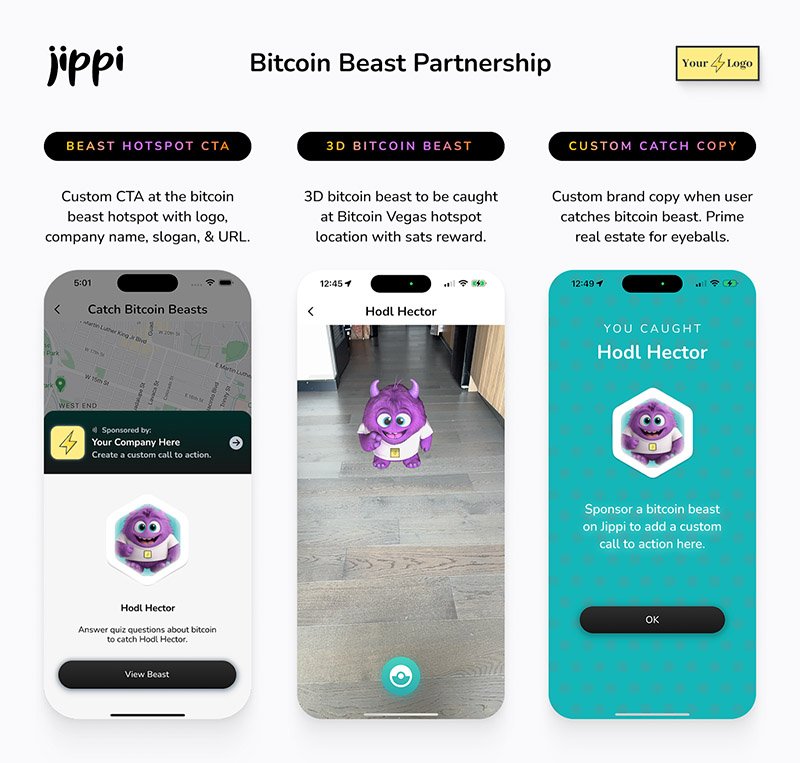
Jippi Bitcoin Beast partnership
While Jippi’s current focus is simple, get the game into more cities, Oliver sees a future where AR glasses and AI help personalize Bitcoin education even further.
“The magic is going to really happen when Apple releases the glasses form factor,” he says, describing how augmented reality could enhance real-world connections rather than isolate users.
In the longer term, Jippi aims to evolve from a free-to-play model toward a pay-to-play version with higher stakes. Users would form “tribes” with friends to compete for substantial bitcoin prizes, creating social connections along with financial education.
Unlike VC-backed startups, Jippi is raising funds pleb style via Timestamp, an open investment platform for Bitcoin companies.
“You don’t have to be an accredited investor,” Oliver explains. “You’re directly supporting the parallel Bitcoin economy by investing in Bitcoin companies for equity.”
Anyone can invest as little as $100. Perks include early access, exclusive game content, and even creating your own beast design with your name/pseudonym and unique game lore. Each investment comes with direct ownership of an early-stage Bitcoin company like Jippi.
For Oliver, this is more than just a business. It’s about future-proofing Bitcoin adoption and ensuring Satoshi’s vision lives on, especially as many people are lured by altcoins, NFTs, and social media dopamine.
“We’re on the right side of history,” he says firmly. “I want my grandkids to know that early on in the Bitcoin revolution, games like Jippi helped make it stick.”
In a world increasingly absorbed by screens and short attention spans, Jippi’s combination of outdoor play, sats rewards, and Bitcoin education might be exactly the bridge Gen Z needs.
Interested in sponsoring a Beast or investing in Jippi? Reach out to Jippi directly by heading to their partnerships page on their website or visit their Timestamp page to invest in Jippi today.
-
 @ 000002de:c05780a7
2025-05-21 17:42:27
@ 000002de:c05780a7
2025-05-21 17:42:27I've been trying out Arch Linux again and the thing that always surprises me is pacman. The way it works seems so unintuitive to me coming from the apt, yum, and dnf worlds.
I know I will get it and it will become internalized but I just wonder what the designer was thinking when making the flags/commands.
https://stacker.news/items/985808
-
 @ 000002de:c05780a7
2025-05-21 17:27:46
@ 000002de:c05780a7
2025-05-21 17:27:46I completely missed this until yesterday. I was listening to our local news talk station and it came up. They had some people that were pretty knowledgeable about prostate cancer on. They talked about other presidents being tested while in office for it. They came to conclusion that it is possible that Biden wasn't having his PSA checked. This is pretty normal for a old dude his age. But it is not normal for a President his age.
My thought is much simpler.
We know his doctors, the media, and his admin were lying about his health when he was in office. Hello! Anyone paying attention and not invested in his regime knew he was declining mentally in front of our very eyes. They covered for him over and over again. Only those that don't pay attention or discounted his critics completely was surprised by his debate performance.
To be clear though, Biden is far from the first president to do this. Wilson, FDR, Kennedy, and Reagan all had issues and they were kept from the public. If we learned these things in school we might actually have a public that thinks critically once and a while.
So, with that in mind do you really think the regime would not withhold medical info about this cancer? Come on. Don't be naive. He clearly was not in charge 100% of the time while in office and the regime wanted to maintain power. Sharing that he had prostate cancer would not be on the menu.
Politics is like a drug that numbs the brain. Because people don't like one party or person they retard their thinking. Its the same thing as happens in sports. Fans of one team see the same play completely differently from the other team's fans. Politics and the investment into parties kills most people's objectivity.
I don't trust liars. It honestly blows my mind how trusting people can be of professional liars. Both parties are full of liars. Trump is a liar and those opposing him are liars. We are drowning in lies. You can vote for a lessor of two evils but never forget what they are.
https://stacker.news/items/985791
-
 @ 9ca447d2:fbf5a36d
2025-05-21 18:01:32
@ 9ca447d2:fbf5a36d
2025-05-21 18:01:32May 13, 2025 – We are proud to announce that My First Bitcoin has received a $1 million grant from #startsmall. With this financial support from Jack Dorsey’s philanthropic initiative, we will continue to serve grassroots Bitcoin education initiatives worldwide.
This grant accelerates our work in the creation and distribution of free and open-source Bitcoin education materials and infrastructure.
It will not only help us improve existing resources, such as the Bitcoin Diploma, Bitcoin Intro Course, and teacher training workshops, but also to scale our digital platforms like our Online School and Community Hub.
As a non-profit, founded in 2021, we have grown from a local project into a global movement. Besides creating curricula and frameworks, our team has directly taught tens of thousands of in-person students, as we workshop and refine our materials based on real world feedback.
In 2023, we launched the Independent Bitcoin Educators Node Network, providing a space for others to join us on our mission. The network spans 65+ projects from 35+ countries, including circular economies, meetup organizers and other grassroots projects.
All commit to the same six pillars: that their education is independent, impartial, community-led, Bitcoin-only, quality, and focused on empowerment over profit.
While we support that network, it is now self-governing. We always seek to give power-to, rather than have power-over.
John Dennehy, founder and Executive Director of My First Bitcoin, explains:
“The revolution of Bitcoin education is that it teaches students HOW to think, not WHAT to think. Funding from sources with their own incentives is the greatest vulnerability that threatens that. Education will be captured by whoever funds it.
“We will never take any government money and frequently turn down funding from corporations and companies. The subtle influence of funding has ruined fiat education and we need to create alternative models for the revolution of Bitcoin education to realize its full potential.”
Funding for Bitcoin education must be transparent.
This grant is a huge win for all of us. For Bitcoin itself, but even more for Independent Bitcoin Education as a whole. It enables us to serve the global community better than ever before. It shows everyone what can be achieved if you stay close to your values.
“My First Bitcoin is a proof-of-concept for all independent Bitcoin educators that if you stay on the mission, even when it’s challenging, then you will come out the other side even stronger,” added Dennehy.
Arnold Hubach, Director of Communications of My First Bitcoin, continued:
“Open source money deserves open source education. Over the past few years, we’ve seen growing demand for our resources around the world, and we remain committed to serving everyone in the Bitcoin space who needs support.
“This funding enables us to plan further into the future and continue being the first-stop provider of free educational tools.”
We’re grateful to #startsmall for believing in our mission and for understanding that Bitcoin education should always be free from external influence. We’re also grateful to the community for helping us arrive at this point where we are ready to receive such a grant.
You lead us to where we are today. You have been our primary funding source. You will continue to lead us forward.
We will always serve the community.
We’re also grateful for our amazing team and their proof of work. The grant will accelerate the work that they are already doing, such as curricula development, teacher training programs, the expansion of the global network, building online platforms, and providing in-person classes.
We will continue to lead by example, we will continue to push the limits, and we will continue to reimagine what’s possible.
We do not seek to please power in this world, we seek to create a proof-of-concept for a better one where the individual is empowered and able to think critically.
If you are an educator in need of tools or infrastructure; please contact us.
If you can help us continue to build out these tools and maintain this growing global movement; please contact us.
If you are aligned with our mission and are a supporter of independent Bitcoin education, please donate.
We work for the public. In public.
-
 @ 9ca447d2:fbf5a36d
2025-05-21 18:01:31
@ 9ca447d2:fbf5a36d
2025-05-21 18:01:31American Bitcoin, a bitcoin mining company backed by President Donald Trump’s sons, is going public in a new merger deal with Gryphon Digital Mining. Investors and political observers are taking notice as it presents a mixture of Bitcoin, Wall Street and the Trump brand.
This reverse merger allows for American Bitcoin Corporation to become a publicly traded company. This will happen through a stock-for-stock merger with Gryphon Digital Mining, a small-cap bitcoin miner already listed on the Nasdaq.
Once the deal is done, the new company will be called American Bitcoin and will trade on the Nasdaq under the ticker symbol ABTC. The merger is expected to close in the 3rd quarter of 2025.
Eric Trump, who will be the Co-Founder and the Chief Strategy Officer, said:
“Our vision for American Bitcoin is to create the most investable Bitcoin accumulation platform in the market.”
The Trump family’s involvement has gotten a lot of attention. Eric Trump and Donald Trump Jr. launched American Bitcoin in March this year with digital asset infrastructure company Hut 8, which owns 80% of American Bitcoin.
American Bitcoin leadership team — Hut 8 presentation
After the merger, American Bitcoin shareholders — including the Trump brothers and Hut 8 — will own about 98% of the new company. Gryphon shareholders will own 2% even though Gryphon is the public company facilitating the merger.
Instead of an IPO (Initial Public Offering), American Bitcoin is going public through what’s called a reverse merger. This means it will take over Gryphon’s public listing.
This is often faster and simpler than a traditional IPO. It allows American Bitcoin to access public capital markets while maintaining operational and strategic control.
Hut 8 CEO Asher Genoot said the merger is a big step forward for the company. “By taking American Bitcoin public, we expect to unlock direct access to dedicated growth capital independent of Hut 8’s balance sheet,” Genoot said.
The announcement sent Gryphon’s stock soaring. Shares rose over 280% and Hut 8’s stock went up over 11%. Clearly investors are interested in bitcoin-focused public companies when the asset itself is close to its previous all-time high.
But not everyone is buying. Some investors and analysts are questioning what Gryphon is actually bringing to the table. Gryphon won’t have a seat on the board or any representation in the new management team. Their role seems to be just to provide the public listing.
Many questions remain unanswered because there are no details on mining operations and what Gryphon’s role is beyond the merger.
American Bitcoin’s goal goes far beyond just mining bitcoin. It wants to become a national bitcoin reserve builder and a major player in that space by storing large amounts of bitcoin as a strategic asset.
The company plans to take “capital-light” advantage of Hut 8’s existing infrastructure, so there won’t be any need to build massive new data centers. Hut 8 already manages over 1,000 megawatts of energy capacity, and apparently, they will handle all the mining operations.
This is happening at a tough time for the mining industry in the U.S. and globally.
Profit margins are shrinking, and companies are really feeling the pinch of high operational costs. Hut 8 just reported a 58% drop in revenue and a $134 million net loss for the first quarter of 2025.
-
 @ 87f5e1d9:e251d8f4
2025-05-21 17:18:19
@ 87f5e1d9:e251d8f4
2025-05-21 17:18:19Losing access to your cryptocurrency can feel like losing a part of your future. Whether it’s due to a forgotten password, a damaged seed backup, or a simple mistake in a transfer, the stress can be overwhelming. Fortunately, cryptrecver.com is here to assist! With our expert-led recovery services, you can safely and swiftly reclaim your lost Bitcoin and other cryptocurrencies.
Why Trust Crypt Recver? 🤝 🛠️ Expert Recovery Solutions At Crypt Recver, we specialize in addressing complex wallet-related issues. Our skilled engineers have the tools and expertise to handle:
Partially lost or forgotten seed phrases Extracting funds from outdated or invalid wallet addresses Recovering data from damaged hardware wallets Restoring coins from old or unsupported wallet formats You’re not just getting a service; you’re gaining a partner in your cryptocurrency journey.
🚀 Fast and Efficient Recovery We understand that time is crucial in crypto recovery. Our optimized systems enable you to regain access to your funds quickly, focusing on speed without compromising security. With a success rate of over 90%, you can rely on us to act swiftly on your behalf.
🔒 Privacy is Our Priority Your confidentiality is essential. Every recovery session is conducted with the utmost care, ensuring all processes are encrypted and confidential. You can rest assured that your sensitive information remains private.
💻 Advanced Technology Our proprietary tools and brute-force optimization techniques maximize recovery efficiency. Regardless of how challenging your case may be, our technology is designed to give you the best chance at retrieving your crypto.
Our Recovery Services Include: 📈 Bitcoin Recovery: Lost access to your Bitcoin wallet? We help recover lost wallets, private keys, and passphrases. Transaction Recovery: Mistakes happen — whether it’s an incorrect wallet address or a lost password, let us manage the recovery. Cold Wallet Restoration: If your cold wallet is failing, we can safely extract your assets and migrate them into a secure new wallet. Private Key Generation: Lost your private key? Our experts can help you regain control using advanced methods while ensuring your privacy. ⚠️ What We Don’t Do While we can handle many scenarios, some limitations exist. For instance, we cannot recover funds stored in custodial wallets or cases where there is a complete loss of four or more seed words without partial information available. We are transparent about what’s possible, so you know what to expect
Don’t Let Lost Crypto Hold You Back! Did you know that between 3 to 3.4 million BTC — nearly 20% of the total supply — are estimated to be permanently lost? Don’t become part of that statistic! Whether it’s due to a forgotten password, sending funds to the wrong address, or damaged drives, we can help you navigate these challenges
🛡️ Real-Time Dust Attack Protection Our services extend beyond recovery. We offer dust attack protection, keeping your activity anonymous and your funds secure, shielding your identity from unwanted tracking, ransomware, and phishing attempts.
🎉 Start Your Recovery Journey Today! Ready to reclaim your lost crypto? Don’t wait until it’s too late! 👉 cryptrecver.com
📞 Need Immediate Assistance? Connect with Us! For real-time support or questions, reach out to our dedicated team on: ✉️ Telegram: t.me/crypptrcver 💬 WhatsApp: +1(941)317–1821
Crypt Recver is your trusted partner in cryptocurrency recovery. Let us turn your challenges into victories. Don’t hesitate — your crypto future starts now! 🚀✨
Act fast and secure your digital assets with cryptrecver.com.Losing access to your cryptocurrency can feel like losing a part of your future. Whether it’s due to a forgotten password, a damaged seed backup, or a simple mistake in a transfer, the stress can be overwhelming. Fortunately, cryptrecver.com is here to assist! With our expert-led recovery services, you can safely and swiftly reclaim your lost Bitcoin and other cryptocurrencies.
 # Why Trust Crypt Recver? 🤝
# Why Trust Crypt Recver? 🤝🛠️ Expert Recovery Solutions\ At Crypt Recver, we specialize in addressing complex wallet-related issues. Our skilled engineers have the tools and expertise to handle:
- Partially lost or forgotten seed phrases
- Extracting funds from outdated or invalid wallet addresses
- Recovering data from damaged hardware wallets
- Restoring coins from old or unsupported wallet formats
You’re not just getting a service; you’re gaining a partner in your cryptocurrency journey.
🚀 Fast and Efficient Recovery\ We understand that time is crucial in crypto recovery. Our optimized systems enable you to regain access to your funds quickly, focusing on speed without compromising security. With a success rate of over 90%, you can rely on us to act swiftly on your behalf.
🔒 Privacy is Our Priority\ Your confidentiality is essential. Every recovery session is conducted with the utmost care, ensuring all processes are encrypted and confidential. You can rest assured that your sensitive information remains private.
💻 Advanced Technology\ Our proprietary tools and brute-force optimization techniques maximize recovery efficiency. Regardless of how challenging your case may be, our technology is designed to give you the best chance at retrieving your crypto.
Our Recovery Services Include: 📈
- Bitcoin Recovery: Lost access to your Bitcoin wallet? We help recover lost wallets, private keys, and passphrases.
- Transaction Recovery: Mistakes happen — whether it’s an incorrect wallet address or a lost password, let us manage the recovery.
- Cold Wallet Restoration: If your cold wallet is failing, we can safely extract your assets and migrate them into a secure new wallet.
- Private Key Generation: Lost your private key? Our experts can help you regain control using advanced methods while ensuring your privacy.
⚠️ What We Don’t Do\ While we can handle many scenarios, some limitations exist. For instance, we cannot recover funds stored in custodial wallets or cases where there is a complete loss of four or more seed words without partial information available. We are transparent about what’s possible, so you know what to expect
 # Don’t Let Lost Crypto Hold You Back!
# Don’t Let Lost Crypto Hold You Back!Did you know that between 3 to 3.4 million BTC — nearly 20% of the total supply — are estimated to be permanently lost? Don’t become part of that statistic! Whether it’s due to a forgotten password, sending funds to the wrong address, or damaged drives, we can help you navigate these challenges
🛡️ Real-Time Dust Attack Protection\ Our services extend beyond recovery. We offer dust attack protection, keeping your activity anonymous and your funds secure, shielding your identity from unwanted tracking, ransomware, and phishing attempts.
🎉 Start Your Recovery Journey Today!\ Ready to reclaim your lost crypto? Don’t wait until it’s too late!\ 👉 cryptrecver.com
📞 Need Immediate Assistance? Connect with Us!\ For real-time support or questions, reach out to our dedicated team on:\ ✉️ Telegram: t.me/crypptrcver\ 💬 WhatsApp: +1(941)317–1821
Crypt Recver is your trusted partner in cryptocurrency recovery. Let us turn your challenges into victories. Don’t hesitate — your crypto future starts now! 🚀✨
Act fast and secure your digital assets with cryptrecver.com.
-
 @ 21335073:a244b1ad
2025-05-21 16:58:36
@ 21335073:a244b1ad
2025-05-21 16:58:36The other day, I had the privilege of sitting down with one of my favorite living artists. Our conversation was so captivating that I felt compelled to share it. I’m leaving his name out for privacy.
Since our last meeting, I’d watched a documentary about his life, one he’d helped create. I told him how much I admired his openness in it. There’s something strange about knowing intimate details of someone’s life when they know so little about yours—it’s almost like I knew him too well for the kind of relationship we have.
He paused, then said quietly, with a shy grin, that watching the documentary made him realize how “odd and eccentric” he is. I laughed and told him he’s probably the sanest person I know. Because he’s lived fully, chasing love, passion, and purpose with hardly any regrets. He’s truly lived.
Today, I turn 44, and I’ll admit I’m a bit eccentric myself. I think I came into the world this way. I’ve made mistakes along the way, but I carry few regrets. Every misstep taught me something. And as I age, I’m not interested in blending in with the world—I’ll probably just lean further into my own brand of “weird.” I want to live life to the brim. The older I get, the more I see that the “normal” folks often seem less grounded than the eccentric artists who dare to live boldly. Life’s too short to just exist, actually live.
I’m not saying to be strange just for the sake of it. But I’ve seen what the crowd celebrates, and I’m not impressed. Forge your own path, even if it feels lonely or unpopular at times.
It’s easy to scroll through the news and feel discouraged. But actually, this is one of the most incredible times to be alive! I wake up every day grateful to be here, now. The future is bursting with possibility—I can feel it.
So, to my fellow weirdos on nostr: stay bold. Keep dreaming, keep pushing, no matter what’s trending. Stay wild enough to believe in a free internet for all. Freedom is radical—hold it tight. Live with the soul of an artist and the grit of a fighter. Thanks for inspiring me and so many others to keep hoping. Thank you all for making the last year of my life so special.
-
 @ 51bbb15e:b77a2290
2025-05-21 00:24:36
@ 51bbb15e:b77a2290
2025-05-21 00:24:36Yeah, I’m sure everything in the file is legit. 👍 Let’s review the guard witness testimony…Oh wait, they weren’t at their posts despite 24/7 survellience instructions after another Epstein “suicide” attempt two weeks earlier. Well, at least the video of the suicide is in the file? Oh wait, a techical glitch. Damn those coincidences!
At this point, the Trump administration has zero credibility with me on anything related to the Epstein case and his clients. I still suspect the administration is using the Epstein files as leverage to keep a lot of RINOs in line, whereas they’d be sabotaging his agenda at every turn otherwise. However, I just don’t believe in ends-justify-the-means thinking. It’s led almost all of DC to toss out every bit of the values they might once have had.
-
 @ eb0157af:77ab6c55
2025-05-21 17:02:55
@ eb0157af:77ab6c55
2025-05-21 17:02:55According to CEO Jamie Dimon, the banking giant will open the door to spot Bitcoin ETFs.
As reported by CNBC, JPMorgan has announced that it will allow its clients to buy Bitcoin, without offering custody services. The bank will give clients access to exchange-traded funds (spot ETFs) on Bitcoin, according to sources familiar with the matter.
During a recent investor event, CEO Jamie Dimon confirmed that the bank will open up to Bitcoin for its clients, while refraining from taking on the responsibility of asset custody. “I am not a fan” of Bitcoin, Dimon clarified during the event.
This decision marks a shift from the position Dimon held in 2017, when he labeled Bitcoin a “fraud,” compared it to the tulip mania bubble, and predicted its imminent collapse. At the time, Dimon had even threatened to fire any JPMorgan employee caught trading Bitcoin, calling such activity “stupid” and against company policy.
Despite this operational turnaround, Dimon continues to personally maintain a skeptical stance toward the cryptocurrency. In a 2024 interview with CNBC, he stated he no longer wanted to discuss Bitcoin publicly, emphasizing that, in his view, it lacks “intrinsic value” and is used for criminal activities such as sex trafficking, money laundering, and ransomware.
These comments from Dimon contrast with the recent optimism shown by JPMorgan analysts regarding Bitcoin’s market prospects. According to reports from the bank, Bitcoin could continue gaining ground at the expense of gold in the second half of the year, driven by rising corporate demand and growing support from various U.S. states.
The post JPMorgan to allow clients to buy Bitcoin ETFs: no custody services appeared first on Atlas21.
-
 @ cae03c48:2a7d6671
2025-05-21 17:02:35
@ cae03c48:2a7d6671
2025-05-21 17:02:35Bitcoin Magazine

Tribalism Is Not The Core ProblemThe United States government stands mere months, if not weeks, from the passing of stablecoin legislation that will set the playing field for the global economy for decades, if not centuries, to come.
During this crucial moment, in which we should all be keeping our eyes locked with precision on the prize, the best and brightest defenders of the one neutral digital asset have once again bifurcated into the trenches of “Us. Vs Them.” As sure as the next block, seemingly every ten minutes there’s another attempt from a faction within the group to imbue an intense ethical intention over the invention of Bitcoin. These groups converge to share interpretations of the Sacred Text –– Satoshi’s Whitepaper ––or pour over his forum posts on BitcoinTalk, hoping to find a path forward. It seems without fail, no matter when looking at the factional Part, or the amorphous Whole, the selected writings of Bitcoin’s inventor always conveniently enable the exact behavior and optionality –– or lack thereof –– that is best for the current arguing party.
This is to say, the observer of Bitcoin, when attempting to gain influence over more users, simply projects and amplifies their own reflection upon the monetary protocol, as it relates to their own position via their specific stake within the system. There is no neutral reflection or position to be expressed –– every voice and every idea fundamentally must come from a place of origin. While many attempt to go to great lengths to curb this bias from their publicly articulated analysis –– not to mention the many more that could claim ignorance entirely –– whether you are able, willing, or aware, your beliefs are beheld by the context you witness, and cannot be separated to create an objective meaning from a subjective experience. In short, everyone talks their own book. It’s a requirement to talking.
On today’s social media platforms, the actualization of one talking their book is even further manipulated beyond strictly fundamental financial incentives, and each idea becomes a piece of content competing for air in the rough seas of algorithmic influence. To not have an opinion on the latest thing, to not express and articulate said opinion publicly, is to drown in the void of irrelevancy. On Twitter, a Bluecheck raft is seen as a necessity, normalized by the supposed dissidents and mainstream alike. The digital front, while an important one, has been eroded not by the proverbial stick, but by the poisoned carrot. Payouts, likes, and followers have replaced credibility as the currency of relevance, not due to actions by the consumers, but by the creators. Even worse, many creators have off-shored their creative capabilities –– i.e., their ideas –– to AI Chat Bots and Large Language Models, removing the humanity entirely from the output, rendering the content ocean littered with homogenous globs of unthought thoughts. The late-stage creator economy has ultimately failed to promote originality, and instead has given rise to an multi-headed hydra of next-up influencers ready and able to churn out the freshest of ChatGPT chum at the behest of curtained algorithmic masters out of sight.
The unseen incentives will be our downfall –– not our ideologies, not our intellect, and not our preparedness, nor the lack of any of these things. While applicable to many mediums and masteries, the hidden incentives of programmable money demonstrate this concept far greater than, say, independent media figures, fitness and health gurus, or dissident philosophers.
Today’s Bitcoin culture war comes at a dangerous time, when the single greatest threat to its neutrality of incentives comes to the protocol layer. While hours and hours of podcasts from both sides of the divorce might lead you to believe this attack vector comes from JPEGs or the filters that discourage them, in fact, the imminent corrupting agent comes from the reintroduction of dollar stablecoins to the blockchain as Bitcoin itself remains infeasible as a medium of exchange that can service billions.
Both sides of the debate, the Knots/Pro-Filters or the Core/Filters-Agnostics, are not dealing with the core of the real problem brewing in Bitcoin today. The Knotsians claim all non-monetary use cases of Bitcoin are against the nature of the protocol, while remaining absolutely silent on whether or not these same ethics are to be applied to Tether’s homecoming –– “Bitcoin-native” USDT dollar stablecoins via Taproot Assets –– being stored in the distributed database known as the blockchain. The Core defenders, who claim to rightfully stand beside the most ambitious and successful open source project of all time, have little to say about the maintainers lack of interest in pursuing optionality that would enable billions of users to benefit from Bitcoin’s disinflationary monetary policy, rather than simply the millions of already-adopters. Both sides are, at best, silent partners in the scaling-by-financialization of Bitcoin via stocks and debt-instruments, custodians, exchange traded funds, and tokenized dollars, rather than by making UTXO ownership feasible and efficient. Filters, spam, Core, Knots, are all distractions from the real problem brewing on the horizon: the incentive distortion of stablecoins.
If Bitcoin remains programmable money, and the mere existence of this protocol-level debate perpetuates the idea that ossification has not yet arrived, why must we pledge allegiance between two teams that directly serve neither of the issues at hand? Bitcoin deserves more client optionality, and Knots is not innately a bad idea, nor are many of the mining concepts marketed by OCEAN employees. Bitcoin Core has secured trillions of dollars of value with an unparalleled up-time for a financial protocol. But Bitcoin will fail to stablecoins, inadvertently perpetuating the United States’ Treasury ponzi across the globe, while introducing dollarized, perverse incentives to the entire game theory of Bitcoin’s block production –– and thus unstoppable transaction settlement –– if we are slothful and distracted in failing to maximize self-custody and keep dollar tokens off the only currently-decentralized chain.
Did inscriptions create a newly-found demand for blockspace that directly competes with the companies enabling Larry Fink’s vision for Bitcoin as “a technology for asset storage?” Do Dickbutts and Monkey JPEGs make the Tether-ification –– i.e., the dollarization –– of Bitcoin more expensive? Perhaps. But there is simply no evidence that the players on either side of this culture war are actively or willingly compromised, and to suggest such is a dangerous game.
As we wrote nearly two years ago in a previous call to action, “the network must remain practically useful for anyone, or it risks becoming practically useless for everyone.” The only responsibility today’s Bitcoiner must uphold is to leave the protocol as permissionless and as serviceable as it was when they found it. Part of this innately involves the mission Core sets out to achieve with its tireless approach to perpetuating an extremely complicated, novel piece of software across an ever-changing landscape of hardware and software updates. Part of this, also, innately involves the mission Knots and OCEAN attempts to achieve with its pursuit of purity of financial activity and mining decentralization via block construction and payout methods.
Blindly opposing or supporting the Current Thing because of Twitter posts and podcasts will not deliver us from the known evils, nor prepare us for the unknown. Ultimately, both paths forward on their own will fail to achieve the promise of Bitcoin to its fullest extent.
Reject the binary presented by the culture war and think for yourself.
This is a guest post by Mark Goodwin. Opinions expressed are entirely their own and do not necessarily reflect those of BTC, Inc. or Bitcoin Magazine_._
This post Tribalism Is Not The Core Problem first appeared on Bitcoin Magazine and is written by Mark Goodwin.
-
 @ 9ca447d2:fbf5a36d
2025-05-21 18:01:30
@ 9ca447d2:fbf5a36d
2025-05-21 18:01:30Bitcoin-focused investment firm Twenty One Capital has made headlines after buying 4,812 BTC worth $458.7 million, making it the third-largest corporate holder of the scarce digital asset.
The move is a big and public one towards becoming the “ultimate Bitcoin investment vehicle” according to its leadership, and is turning heads in both bitcoin and tradfi world.
Tether, the issuer of the world’s largest stablecoin, bought the bitcoin on behalf of Twenty One Capital.
According to a filing with the U.S. Securities and Exchange Commission (SEC) on May 13, Tether acquired the bitcoin on May 9 at an average price of $95,319 per coin.
Twenty One Capital was launched in April 2025 through a SPAC merger with Cantor Equity Partners, a Cayman Islands-based firm affiliated with Wall Street giant Cantor Fitzgerald. The company is backed by Tether, Bitfinex exchange and Japanese investment giant SoftBank.
Related: Cantor Fitzgerald, Tether and SoftBank Launch $3B Bitcoin Venture
The firm is led by Jack Mallers, founder of the bitcoin payments app Strike, who has been vocal about bitcoin business models.
“We want to be the ultimate vehicle for the capital markets to participate in Bitcoin… building on top of Bitcoin,” said Mallers in an interview. “So we are a Bitcoin business at our core.”
At launch, Twenty One Capital had 31,500 bitcoin on the balance sheet with plans to get to at least 42,000 BTC.
The breakdown of that initial allocation was 23,950 BTC from Tether, 10,500 BTC from SoftBank and about 7,000 BTC from Bitfinex—all to be converted into equity at $10 per share.
The company is openly modeling its strategy after what Bitcoiners call “Saylorization”—a term coined after Michael Saylor, executive chairman of Strategy, who started large-scale bitcoin accumulation by corporations in 2020.
“Twenty One Capital isn’t just stacking sats,” said Bitcoin advocate Max Keiser, “It’s leading a generational shift in corporate capital allocation … Jack Mallers is taking the Saylor playbook and turning it into an arms race.”
The strategy is simple: use bitcoin per share as a metric instead of earnings per share, prioritize bitcoin accumulation over short-term profits, and use the capital markets to fund purchases. Mallers said:
“We do intend to raise as much capital as we possibly can to acquire bitcoin. We will never have bitcoin per share negative… Our intent is to make sure when you are a shareholder of Twenty One that you are getting wealthier in Bitcoin terms.”
The bitcoin purchase was made at a time of growing market momentum.
On May 14, bitcoin hit $105,000 briefly before settling at around $104,000—a 7.5% gain in the past week. Retail buying has also picked up, with purchases under $10,000 up 3.4% over two weeks, suggesting continued bullishness.
-
 @ c9badfea:610f861a
2025-05-20 19:49:20
@ c9badfea:610f861a
2025-05-20 19:49:20- Install Sky Map (it's free and open source)
- Launch the app and tap Accept, then tap OK
- When asked to access the device's location, tap While Using The App
- Tap somewhere on the screen to activate the menu, then tap ⁝ and select Settings
- Disable Send Usage Statistics
- Return to the main screen and enjoy stargazing!
ℹ️ Use the 🔍 icon in the upper toolbar to search for a specific celestial body, or tap the 👁️ icon to activate night mode
-
 @ 9ca447d2:fbf5a36d
2025-05-21 18:01:29
@ 9ca447d2:fbf5a36d
2025-05-21 18:01:29Singapore, May 14, 2025 — NEUTRON, the leading Lightning Network infrastructure provider in Asia, is announcing a new partnership with Cobo, a globally trusted digital asset custody platform.
Through this collaboration, Cobo will integrate Neutron’s Lightning Network API, enabling real-time, cost-effective Bitcoin transactions across its services.
Neutron’s mission is to make the Lightning Network the financial backbone for modern Bitcoin use, bridging traditional finance with Bitcoin’s borderless, decentralized economy.
“We’re thrilled to partner with Cobo, a trusted leader in custodial services, to further accelerate Bitcoin infrastructure across Asia,” said Albert Buu, CEO of Neutron.
“At Neutron, we are committed to providing enterprise businesses with easy and efficient integration into the Lightning Network, enabling next-generation global real-time settlement solutions.
“This partnership will not only drive innovation but also empower businesses across Asia with the fast, secure, and cost-effective benefits of Bitcoin payments.”
Neutron: The Lightning Engine for Bitcoin Adoption
Neutron provides a comprehensive API suite that allows businesses to instantly access the power of the Lightning Network, Bitcoin’s second-layer protocol designed for high-speed, scalable, and low-fee payments.
The integration is part of Neutron’s broader vision to equip forward-thinking institutions with the tools needed to participate in the next generation of Bitcoin utility.
Lightning-Powered Custody for the Next Era of Finance
Cobo’s integration of Neutron’s API gives institutional clients an additional option for BTC settlement, making Lightning Network access more programmable and easier to integrate within their existing systems.
“At Cobo, we’ve built our custody platform to combine uncompromising security with the scalability institutions need to grow,” said Dr. Changhao Jiang, CTO and Co-Founder of Cobo.
“Integrating Neutron’s Lightning Network API allows us to offer real-time, low-cost Bitcoin settlement at scale without compromising on trust or performance. Together, we’re laying the groundwork for faster, more efficient Bitcoin infrastructure across Asia.”
About Neutron
Neutron is Asia’s leading Bitcoin infrastructure company, helping businesses and individuals unlock the power of the Lightning Network, specializing in Lightning-as-a-Service.
nThrough its scalable API platform, mobile app, and lending product, Neutron empowers businesses and individuals to send, receive, save, and build with Bitcoin.
Want to bring Lightning into your product or platform? Reach out to our team at sales@neutron.me or visit us at www.neutron.meAbout Cobo
Cobo is a trusted leader in digital asset custody and wallet infrastructure, providing an all-in-one platform for organizations and developers to easily build, automate, and scale their digital asset businesses securely.
Founded in 2017 by blockchain pioneers and headquartered in Singapore, Cobo is trusted by more than 500 leading digital asset businesses globally, safeguarding billions of dollars in assets.
Today, Cobo offers the industry’s only unified wallet platform that integrates all four digital asset wallet technologies – Custodial Wallets, MPC Wallets, Smart Contract Wallets, and Exchange Wallets.
Committed to the highest security standards and regulatory compliance, Cobo has a zero-incident track record and holds ISO 27001, SOC2 (Type 1 and Type 2) certifications, as well as licenses in multiple jurisdictions.
Recognized for its industry-leading innovations, Cobo has received accolades from prestigious entities such as Hedgeweek and Global Custodian. For more information, please visit www.cobo.com
-
 @ 9ca447d2:fbf5a36d
2025-05-21 18:01:28
@ 9ca447d2:fbf5a36d
2025-05-21 18:01:28Ukraine is reportedly about to make history by becoming the first country in Europe to have a national bitcoin reserve, a move aimed at strengthening its economy during the war with Russia.
The plan is still in its early stages and Binance, the world’s largest digital asset exchange, is involved.
According to Incrypted, a Ukrainian digital asset news outlet, Ukrainian MP Yaroslav Zheleznyak, First Deputy Chairman of the Finance, Tax and Customs Policy Committee, confirmed that the draft law is almost ready and will be submitted to the parliament soon.
“We will soon submit a draft law from the industry allowing the creation of crypto reserves,” Zheleznyak told Incrypted.
Earlier discussions mentioned a broader “crypto reserve” but the current plan is focused on bitcoin as a strategic reserve asset. If approved, the law will allow the National Bank of Ukraine to hold bitcoin as part of the country’s official reserves.
Since the war with Russia started, Ukraine has become one of the most bitcoin-friendly countries in the world.
In 2022 and 2023 Ukraine raised over $100 million in digital asset donations for defense and humanitarian purposes. A report from Chainalysis ranked the country among the top 10 countries for bitcoin adoption globally.
A rather vague and unconfirmed report by BitcoinTreasuries.net states that “holdings of public officials” currently stand at 46,351 BTC.

Ukraine bitcoin holdings as reported by BitcoinTreasuries
Supporters of the bitcoin reserve say it will help Ukraine protect its economy from war-related instability, inflation and currency depreciation.
By going digital, the government is looking for modern tools to strengthen its financial system in uncertain times. This is not just about storing bitcoin, it’s about establishing clear laws for digital assets ownership, management and use.
Binance is playing an advisory role in the project. The company has worked with Ukraine on digital asset education and regulations in the past and is now helping to shape the legal framework for the bitcoin reserve.
Kirill Khomyakov, Binance’s regional head for Central and Eastern Europe, Central Asia and Africa, confirmed the company’s support, but warned it won’t be fast or easy.
“The creation of such a reserve will require significant changes in legislation,” Khomyakov said. “Another positive aspect is that this initiative will likely lead to greater clarity in the regulation of crypto assets in Ukraine.”
Despite the support from some officials, there are legal hurdles. Ukrainian laws don’t allow bitcoin to be in the official reserves. So the government needs to pass new laws for it to happen.
Efforts to legalize bitcoin in general have been going on for years. In 2021, a draft law on virtual assets was approved by Finance Committee but was withdrawn after the President’s Office and financial regulators objected.
Up to now, over 80 amendments have been proposed, showing how complicated the process is.
The Ministry of Digital Transformation is leading a larger reform that could introduce rules for digital asset exchanges, tax laws and anti-money laundering standards in the country.
Ukraine isn’t alone in considering bitcoin as a national reserve asset. In March 2025, the U.S. announced its own Strategic Bitcoin Reserve using BTC seized in criminal cases.
-
 @ 04c915da:3dfbecc9
2025-05-20 15:53:48
@ 04c915da:3dfbecc9
2025-05-20 15:53:48This piece is the first in a series that will focus on things I think are a priority if your focus is similar to mine: building a strong family and safeguarding their future.
Choosing the ideal place to raise a family is one of the most significant decisions you will ever make. For simplicity sake I will break down my thought process into key factors: strong property rights, the ability to grow your own food, access to fresh water, the freedom to own and train with guns, and a dependable community.
A Jurisdiction with Strong Property Rights
Strong property rights are essential and allow you to build on a solid foundation that is less likely to break underneath you. Regions with a history of limited government and clear legal protections for landowners are ideal. Personally I think the US is the single best option globally, but within the US there is a wide difference between which state you choose. Choose carefully and thoughtfully, think long term. Obviously if you are not American this is not a realistic option for you, there are other solid options available especially if your family has mobility. I understand many do not have this capability to easily move, consider that your first priority, making movement and jurisdiction choice possible in the first place.
Abundant Access to Fresh Water
Water is life. I cannot overstate the importance of living somewhere with reliable, clean, and abundant freshwater. Some regions face water scarcity or heavy regulations on usage, so prioritizing a place where water is plentiful and your rights to it are protected is critical. Ideally you should have well access so you are not tied to municipal water supplies. In times of crisis or chaos well water cannot be easily shutoff or disrupted. If you live in an area that is drought prone, you are one drought away from societal chaos. Not enough people appreciate this simple fact.
Grow Your Own Food
A location with fertile soil, a favorable climate, and enough space for a small homestead or at the very least a garden is key. In stable times, a small homestead provides good food and important education for your family. In times of chaos your family being able to grow and raise healthy food provides a level of self sufficiency that many others will lack. Look for areas with minimal restrictions, good weather, and a culture that supports local farming.
Guns
The ability to defend your family is fundamental. A location where you can legally and easily own guns is a must. Look for places with a strong gun culture and a political history of protecting those rights. Owning one or two guns is not enough and without proper training they will be a liability rather than a benefit. Get comfortable and proficient. Never stop improving your skills. If the time comes that you must use a gun to defend your family, the skills must be instinct. Practice. Practice. Practice.
A Strong Community You Can Depend On
No one thrives alone. A ride or die community that rallies together in tough times is invaluable. Seek out a place where people know their neighbors, share similar values, and are quick to lend a hand. Lead by example and become a good neighbor, people will naturally respond in kind. Small towns are ideal, if possible, but living outside of a major city can be a solid balance in terms of work opportunities and family security.
Let me know if you found this helpful. My plan is to break down how I think about these five key subjects in future posts.
-
 @ cae03c48:2a7d6671
2025-05-21 17:02:25
@ cae03c48:2a7d6671
2025-05-21 17:02:25Bitcoin Magazine

Magic Eden Partners with Spark to Bring Fast, Cheap Bitcoin SettlementsMagic Eden is integrating with Spark to improve Bitcoin trading by addressing issues like slow transaction times, high fees, and poor user experience. According to a press release sent to Bitcoin Magazine, the integration will introduce a native settlement system aimed at making transactions faster and more cost-effective, without using bridges or synthetic assets.
Big day: @MagicEden is coming to Spark. New native Bitcoin experiences coming to you very soon.
Alpha → https://t.co/KPWZ7Ndagg pic.twitter.com/c4nSlhP3Rt
— Spark (@buildonspark) May 20, 2025
The integration will enable users to buy, sell, and earn Bitcoin-native assets more efficiently through Spark’s infrastructure, starting with support for stablecoin-to-BTC swaps and expanding to additional use cases over time.
Spark is built entirely on Bitcoin’s base layer. It provides transaction finality in under a second and fees below one cent.
“We’re proud to be betting on BTC DeFi,” said the CEO of Magic EdenJack Lu. “We’re going to lead the forefront of all Bitcoin DeFi to make BTC fast, fun, and for everyone with Magic Eden as the #1 BTC native app on-chain.”
Huge News: We're partnering with @buildonspark
Spark enables instant Bitcoin transactions, creating a fast and secure experience for everyone.
Get ready for a new wave of BTC-Defi
 pic.twitter.com/FXmHfATnJz
pic.twitter.com/FXmHfATnJz— Magic Eden
 (@MagicEden) May 20, 2025
(@MagicEden) May 20, 2025The collaboration between Spark and Magic Eden will officially begin at BitGala on May 26th. At this event, they will host a joint gathering to mark their partnership and engage with the Bitcoin community. This event will also serve as the starting point for further integration, the development of new tools for developers, and expanded opportunities within the Bitcoin ecosystem.
“Spark is a completely agnostic protocol, it’s purpose-built for developers to create the next generation of financial applications,” said the CEO & Co-founder of Lightspark David Marcus. “We’re incredibly excited to see Magic Eden building the future of on-chain Bitcoin DeFi directly on Spark.”
This post Magic Eden Partners with Spark to Bring Fast, Cheap Bitcoin Settlements first appeared on Bitcoin Magazine and is written by Oscar Zarraga Perez.
-
 @ cae03c48:2a7d6671
2025-05-21 17:02:14
@ cae03c48:2a7d6671
2025-05-21 17:02:14Bitcoin Magazine
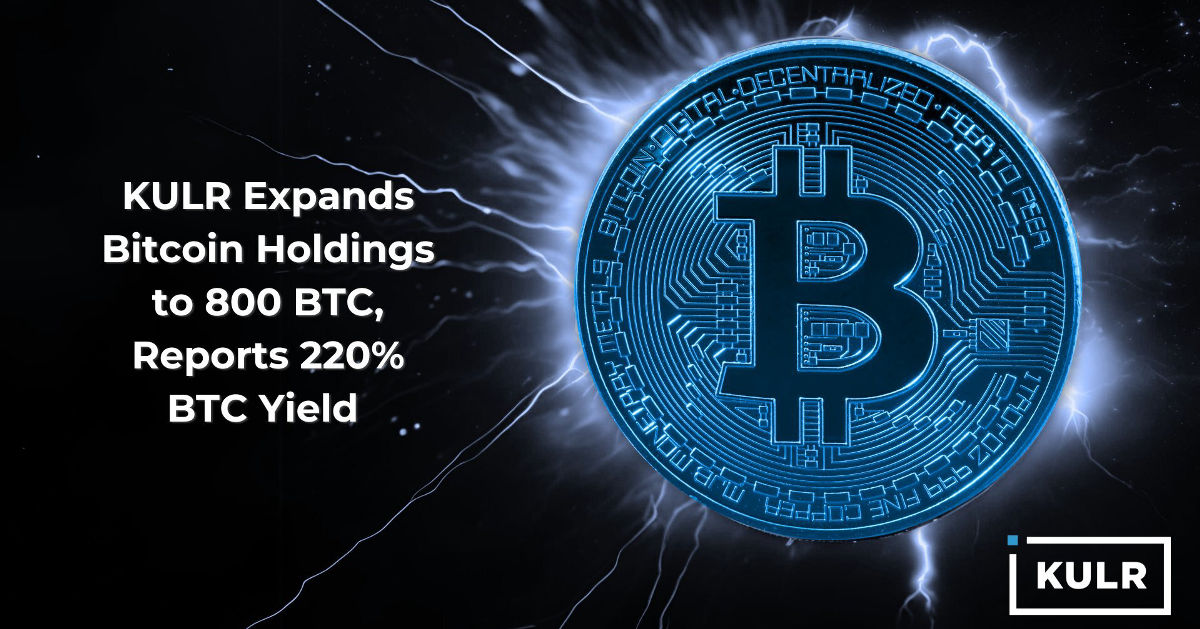
KULR Expands Bitcoin Treasury to $78M, Cites 220% BTC Yield YTDToday, KULR Technology Group, Inc. (NYSE American: KULR) announced a $9 million expansion of its Bitcoin Treasury, bringing total acquisitions to $78 million. The latest purchase was made at a weighted average price of $103,234 per bitcoin, bringing the company’s total holdings to 800.3 BTC.
$KULR has acquired 83.3 BTC for ~ 9 million To learn more about our acquistion and our Bitcoin Treasury Strategy, check out today's press release.https://t.co/vuQk90DCgh pic.twitter.com/KrW3E4e700
— KULR Technology (@KULRTech) May 20, 2025
The move follows KULR’s December 2024 strategy to allocate up to 90% of surplus cash reserves to bitcoin. Year-to-date, the company reports a BTC Yield of 220.2%, a proprietary performance metric reflecting growth in BTC holdings relative to assumed fully diluted shares outstanding.
In Q1 2025, KULR reported revenue of $2.45 million, a 40% increase driven by product sales totaling approximately $1.16 million. Gross margin declined to 8%, while combined cash and accounts receivable stood at $27.59 million. Operating expenses rose, with Selling, General and Administrative (SG&A) Expenses at $7.20 million and Research and Development (R&D) Expenses at $2.45 million, contributing to an operating loss of $9.44 million. Net loss widened to $18.81 million, mainly due to a mark-to-market adjustment on bitcoin holdings.
“2025 is a transformational year for KULR and the transformation is well on its way,” commented KULR CEO Michael Mo. “With over $100M in cash and Bitcoin holdings on our balance sheet as of the present day and virtually no debt, we are well capitalized to grow our battery and AI Robotics businesses, while our capital market activities in the foreseeable future are geared to turbocharge our Bitcoin acquisition strategy, establishing KULR as a pioneer BTC-First Bitcoin Treasury Company.”
CEO @michaelmokulr speaks about the origins of KULR’s Bitcoin treasury strategy and how it will shape the future of the company’s growth.
Watch here:$KULR pic.twitter.com/UTq3iKkF0u
— KULR Technology (@KULRTech) May 15, 2025
This surge in bitcoin holdings by companies like KULR and Metaplanet highlights a growing trend among firms embracing BTC as a core treasury asset, reflecting confidence in bitcoin’s long-term value and utility as part of broader financial strategies.
Last week, Metaplanet reported its strongest quarter to date for Q1 FY2025. Metaplanet’s bitcoin holdings rose to 6,796 BTC—a 3.9x increase year-to-date and over 5,000 BTC added in 2025 alone. Despite a temporary ¥7.4 billion valuation loss from a bitcoin price dip in March, the company rebounded with ¥13.5 billion in unrealized gains as of May 12. Since adopting the Bitcoin Treasury Standard, Metaplanet’s BTC net asset value has surged 103.1x, and its market cap has grown 138.1x.
This post KULR Expands Bitcoin Treasury to $78M, Cites 220% BTC Yield YTD first appeared on Bitcoin Magazine and is written by Oscar Zarraga Perez.
-
 @ 04c915da:3dfbecc9
2025-05-20 15:47:16
@ 04c915da:3dfbecc9
2025-05-20 15:47:16Here’s a revised timeline of macro-level events from The Mandibles: A Family, 2029–2047 by Lionel Shriver, reimagined in a world where Bitcoin is adopted as a widely accepted form of money, altering the original narrative’s assumptions about currency collapse and economic control. In Shriver’s original story, the failure of Bitcoin is assumed amid the dominance of the bancor and the dollar’s collapse. Here, Bitcoin’s success reshapes the economic and societal trajectory, decentralizing power and challenging state-driven outcomes.
Part One: 2029–2032
-
2029 (Early Year)\ The United States faces economic strain as the dollar weakens against global shifts. However, Bitcoin, having gained traction emerges as a viable alternative. Unlike the original timeline, the bancor—a supranational currency backed by a coalition of nations—struggles to gain footing as Bitcoin’s decentralized adoption grows among individuals and businesses worldwide, undermining both the dollar and the bancor.
-
2029 (Mid-Year: The Great Renunciation)\ Treasury bonds lose value, and the government bans Bitcoin, labeling it a threat to sovereignty (mirroring the original bancor ban). However, a Bitcoin ban proves unenforceable—its decentralized nature thwarts confiscation efforts, unlike gold in the original story. Hyperinflation hits the dollar as the U.S. prints money, but Bitcoin’s fixed supply shields adopters from currency devaluation, creating a dual-economy split: dollar users suffer, while Bitcoin users thrive.
-
2029 (Late Year)\ Dollar-based inflation soars, emptying stores of goods priced in fiat currency. Meanwhile, Bitcoin transactions flourish in underground and online markets, stabilizing trade for those plugged into the bitcoin ecosystem. Traditional supply chains falter, but peer-to-peer Bitcoin networks enable local and international exchange, reducing scarcity for early adopters. The government’s gold confiscation fails to bolster the dollar, as Bitcoin’s rise renders gold less relevant.
-
2030–2031\ Crime spikes in dollar-dependent urban areas, but Bitcoin-friendly regions see less chaos, as digital wallets and smart contracts facilitate secure trade. The U.S. government doubles down on surveillance to crack down on bitcoin use. A cultural divide deepens: centralized authority weakens in Bitcoin-adopting communities, while dollar zones descend into lawlessness.
-
2032\ By this point, Bitcoin is de facto legal tender in parts of the U.S. and globally, especially in tech-savvy or libertarian-leaning regions. The federal government’s grip slips as tax collection in dollars plummets—Bitcoin’s traceability is low, and citizens evade fiat-based levies. Rural and urban Bitcoin hubs emerge, while the dollar economy remains fractured.
Time Jump: 2032–2047
- Over 15 years, Bitcoin solidifies as a global reserve currency, eroding centralized control. The U.S. government adapts, grudgingly integrating bitcoin into policy, though regional autonomy grows as Bitcoin empowers local economies.
Part Two: 2047
-
2047 (Early Year)\ The U.S. is a hybrid state: Bitcoin is legal tender alongside a diminished dollar. Taxes are lower, collected in BTC, reducing federal overreach. Bitcoin’s adoption has decentralized power nationwide. The bancor has faded, unable to compete with Bitcoin’s grassroots momentum.
-
2047 (Mid-Year)\ Travel and trade flow freely in Bitcoin zones, with no restrictive checkpoints. The dollar economy lingers in poorer areas, marked by decay, but Bitcoin’s dominance lifts overall prosperity, as its deflationary nature incentivizes saving and investment over consumption. Global supply chains rebound, powered by bitcoin enabled efficiency.
-
2047 (Late Year)\ The U.S. is a patchwork of semi-autonomous zones, united by Bitcoin’s universal acceptance rather than federal control. Resource scarcity persists due to past disruptions, but economic stability is higher than in Shriver’s original dystopia—Bitcoin’s success prevents the authoritarian slide, fostering a freer, if imperfect, society.
Key Differences
- Currency Dynamics: Bitcoin’s triumph prevents the bancor’s dominance and mitigates hyperinflation’s worst effects, offering a lifeline outside state control.
- Government Power: Centralized authority weakens as Bitcoin evades bans and taxation, shifting power to individuals and communities.
- Societal Outcome: Instead of a surveillance state, 2047 sees a decentralized, bitcoin driven world—less oppressive, though still stratified between Bitcoin haves and have-nots.
This reimagining assumes Bitcoin overcomes Shriver’s implied skepticism to become a robust, adopted currency by 2029, fundamentally altering the novel’s bleak trajectory.
-
-
 @ 9ca447d2:fbf5a36d
2025-05-21 18:01:27
@ 9ca447d2:fbf5a36d
2025-05-21 18:01:27KYC database of Coinbase, the largest U.S. digital asset exchange, has been breached and up to 1% of monthly active users, or around 100,000 customers, have had their personal info stolen.
Hackers reportedly bribed overseas customer support agents and contractors to leak internal company info and user data. They then demanded $20 million and threatened to release the stolen data if Coinbase didn’t pay.
Instead of paying the ransom, Coinbase said no and is setting up a $20 million reward fund for anyone who can help catch the hackers.
“They then tried to extort Coinbase for $20 million to cover this up. We said no,” the company said in a blog post. “Instead of paying the $20 million ransom, we’re establishing a $20 million reward fund.”
So what’s been stolen? The breach, which was first disclosed in a filing with the U.S. Securities and Exchange Commission (SEC), did not involve any theft of customer funds, login credentials, private keys or wallets.
But the hackers did get:
- Full names
- Addresses
- Phone numbers
- Email addresses
- Last 4 digits of Social Security numbers
- Bank account numbers and some bank identifiers
- Government ID images (driver’s licenses, passports, etc.)
- Account balances and transaction history
- Internal corporate documents and training materials
Coinbase says Prime accounts were not affected and no passwords or 2FA codes were stolen.
According to Coinbase, the attackers targeted outsourced support agents in countries like India. They were offering cash bribes in exchange for access to the company’s internal customer support tools.
“What these attackers were doing was finding Coinbase employees and contractors based in India who were associated with our business process outsourcing or support operations, that kind of thing, and bribing them in order to obtain customer data,” said Philip Martin, Coinbase’s Chief Security Officer.
Coinbase said it first saw suspicious activity in January 2025 but didn’t get a direct email from the threat actors until May 11. The email had evidence of stolen data and the ransom demand.
Coinbase quickly launched an investigation, fired all the involved support agents and notified law enforcement. It also started notifying users via email on May 15.
The Coinbase data breach has hit it hard, financially and publicly. The company estimates it will spend $180-$400 million on security upgrades, reimbursements and other remediation.
Coinbase’s stock also took a hit, dropping 6.4% after the news broke, before rebounding.
Analysts say this couldn’t have come at a worse time, as Coinbase is about to be added to the S&P 500 index – a big deal for any publicly traded company.
It’s definitely an unfortunate timing. “This may push the industry to adopt stricter employee vetting and introduce some reputational risks,” said Bo Pei, analyst at U.S. Tiger Securities.
Coinbase will reimburse any customers who were tricked into sending their digital assets to the attackers as part of social engineering scams. They’ve also introduced new security measures:
- Extra ID verification for high-risk withdrawals
- Scam-awareness prompts
- A new U.S.-based support center
- Stronger insider threat monitoring
- Simulation testing for internal systems
Affected customers have already been notified and the exchange is working with U.S. and international law enforcement to track down the attackers.
This is part of a larger trend in the digital assets world. Earlier this year, Bybit, another exchange, was hit with a $1.5 billion theft, dubbed the biggest digital asset heist in history.
Research from Chainalysis shows over $2.2 billion was stolen from digital asset platforms in 2024 alone.
-
 @ 6ad3e2a3:c90b7740
2025-05-20 13:49:50
@ 6ad3e2a3:c90b7740
2025-05-20 13:49:50I’ve written about MSTR twice already, https://www.chrisliss.com/p/mstr and https://www.chrisliss.com/p/mstr-part-2, but I want to focus on legendary short seller James Chanos’ current trade wherein he buys bitcoin (via ETF) and shorts MSTR, in essence to “be like Mike” Saylor who sells MSTR shares at the market and uses them to add bitcoin to the company’s balance sheet. After all, if it’s good enough for Saylor, why shouldn’t everyone be doing it — shorting a company whose stock price is more than 2x its bitcoin holdings and using the proceeds to buy the bitcoin itself?
Saylor himself has said selling shares at 2x NAV (net asset value) to buy bitcoin is like selling dollars for two dollars each, and Chanos has apparently decided to get in while the getting (market cap more than 2x net asset value) is good. If the price of bitcoin moons, sending MSTR’s shares up, you are more than hedged in that event, too. At least that’s the theory.
The problem with this bet against MSTR’s mNAV, i.e., you are betting MSTR’s market cap will converge 1:1 toward its NAV in the short and medium term is this trade does not exist in a vacuum. Saylor has described how his ATM’s (at the market) sales of shares are accretive in BTC per share because of this very premium they carry. Yes, we’ll dilute your shares of the company, but because we’re getting you 2x the bitcoin per share, you are getting an ever smaller slice of an ever bigger overall pie, and the pie is growing 2x faster than your slice is reducing. (I https://www.chrisliss.com/p/mstr how this works in my first post.)
But for this accretion to continue, there must be a constant supply of “greater fools” to pony up for the infinitely printable shares which contain only half their value in underlying bitcoin. Yes, those shares will continue to accrete more BTC per share, but only if there are more fools willing to make this trade in the future. So will there be a constant supply of such “fools” to keep fueling MSTR’s mNAV multiple indefinitely?
Yes, there will be in my opinion because you have to look at the trade from the prospective fools’ perspective. Those “fools” are not trading bitcoin for MSTR, they are trading their dollars, selling other equities to raise them maybe, but in the end it’s a dollars for shares trade. They are not selling bitcoin for them.
You might object that those same dollars could buy bitcoin instead, so they are surely trading the opportunity cost of buying bitcoin for them, but if only 5-10 percent of the market (or less) is buying bitcoin itself, the bucket in which which those “fools” reside is the entire non-bitcoin-buying equity market. (And this is not considering the even larger debt market which Saylor has yet to tap in earnest.)
So for those 90-95 percent who do not and are not presently planning to own bitcoin itself, is buying MSTR a fool’s errand, so to speak? Not remotely. If MSTR shares are infinitely printable ATM, they are still less so than the dollar and other fiat currencies. And MSTR shares are backed 2:1 by bitcoin itself, while the fiat currencies are backed by absolutely nothing. So if you hold dollars or euros, trading them for MSTR shares is an errand more sage than foolish.
That’s why this trade (buying BTC and shorting MSTR) is so dangerous. Not only are there many people who won’t buy BTC buying MSTR, there are many funds and other investment entities who are only able to buy MSTR.
Do you want to get BTC at 1:1 with the 5-10 percent or MSTR backed 2:1 with the 90-95 percent. This is a bit like medical tests that have a 95 percent accuracy rate for an asymptomatic disease that only one percent of the population has. If someone tests positive, it’s more likely to be a false one than an indication he has the disease*. The accuracy rate, even at 19:1, is subservient to the size of the respective populations.
At some point this will no longer be the case, but so long as the understanding of bitcoin is not widespread, so long as the dollar is still the unit of account, the “greater fools” buying MSTR are still miles ahead of the greatest fools buying neither, and the stock price and mNAV should only increase.
. . .
One other thought: it’s more work to play defense than offense because the person on offense knows where he’s going, and the defender can only react to him once he moves. Similarly, Saylor by virtue of being the issuer of the shares knows when more will come online while Chanos and other short sellers are borrowing them to sell in reaction to Saylor’s strategy. At any given moment, Saylor can pause anytime, choosing to issue convertible debt or preferred shares with which to buy more bitcoin, and the shorts will not be given advance notice.
If the price runs, and there is no ATM that week because Saylor has stopped on a dime, so to speak, the shorts will be left having to scramble to change directions and buy the shares back to cover. Their momentum might be in the wrong direction, though, and like Allen Iverson breaking ankles with a crossover, Saylor might trigger a massive short squeeze, rocketing the share price ever higher. That’s why he actually welcomes Chanos et al trying this copycat strategy — it becomes the fuel for outsized gains.
For that reason, news that Chanos is shorting MSTR has not shaken my conviction, though there are other more pertinent https://www.chrisliss.com/p/mstr-part-2 with MSTR, of which one should be aware. And as always, do your own due diligence before investing in anything.
* To understand this, consider a population of 100,000, with one percent having a disease. That means 1,000 have it, 99,000 do not. If the test is 95 percent accurate, and everyone is tested, 950 of the 1,000 will test positive (true positives), 50 who have it will test negative (false negatives.) Of the positives, 95 percent of 99,000 (94,050) will test negative (true negatives) and five percent (4,950) will test positive (false positives). That means 4,950 out of 5,900 positives (84%) will be false.
-
 @ 9ca447d2:fbf5a36d
2025-05-21 18:01:26
@ 9ca447d2:fbf5a36d
2025-05-21 18:01:26Donald Trump’s recent four-day visit took the President to Saudi Arabia, Qatar, and the United Arab Emirates. This visit has intertwined diplomatic relations with business interests, while simultaneously influencing the bitcoin market.
In Qatar, the President met with Emir Tanim bin Hamad Al Thani, resulting in over $243 billion in deals including major defense agreements, according to Bloomberg.
On May 15, the President made his visit to the Sheikh Zayed Grand Mosque in Abu Dhabi alongside Crown Prince Khaled bin Mohamed Al Nahyan. This occurs as the Trump family expands its business presence in the Middle East.
The Trump Organization is developing luxury properties across the region, including Trump Tower Dubai, real estate projects in Riyadh, and development in Jeddah and Oman.

Donald Trump and Mohammed bin Salman in King Khalid International Airport — NBCNews
Eric Trump publicly announced construction plans for Trump Tower Dubai just last month, highlighting the family’s ongoing commercial footprint in the region.
These business connections extend into the digital asset ecosystem as UAE-backed investment firm MGX recently announced it would use USD1, World Liberty Financial’s stablecoin to support a $2 billion investment in Binance, the world’s largest digital asset exchange, according to APNews.
This connection between Trump-aligned interests and major digital asset investments creates a potential avenue for market influence.
Historically, stability in the Middle East, especially among oil-rich nations, reduces global market volatility. This encourages risk appetite among investors, often leading to increased allocations to digital assets like bitcoin.
Middle East diplomacy directly affects global oil prices. Stable oil prices can lower inflation expectations and lead to interest rate cuts by the Fed. Lower rates lead to an increase in liquidity, having positive effects on bitcoin, an asset that benefits from money printing.
Related: Fed Rate Cuts Could Lead to Major Price Swings for Bitcoin
On the investment front, Abu Dhabi’s Wealth Fund, Mubadala Investment Company, has been focused on increasing their shares in BlackRock’s iShares Bitcoin Trust (IBIT).
According to a 13F filing with the U.S. Securities and Exchange Commission, Mubdala held 8.7 million IBIT shares, totaling $408.5 million as of March 31, 2025.
The Abu Dhabi Wealth Fund increased its shares by 500,000 since its last filing in December of 2024.
Back in March, the United States created a Strategic Bitcoin Reserve. The executive order states that the U.S. will not sell the bitcoin they already hold, and will create budget-neutral ways to increase their holdings.
The time has come where governments and wealth funds alike are jumping on board the Bitcoin train.
Trump’s recent visit to the Middle East illustrates how financial, diplomatic, and personal interests are becoming increasingly intertwined with Bitcoin and digital assets, serving as a new axis of influence in the U.S.-Middle East relations.
The combination of diplomatic progress and business expansion has heightened short-term volatility and trading volumes in the bitcoin market.
Trump’s business and digital asset ties in the region may further boost institutional interest and create an opportunity for more players to enter the market.
-
 @ cae03c48:2a7d6671
2025-05-21 17:02:04
@ cae03c48:2a7d6671
2025-05-21 17:02:04Bitcoin Magazine

Building FUN! on Bitcoin: Parker Day and Casey Rodarmor Talk Collaboration and the Future of On-Chain Art and AuctionsParker Day and Casey Rodarmor’s FUN! Collection is an unprecedented synthesis of photographic maximalism and protocol-level innovation—a work that stands alone within the landscape of Bitcoin-native art. Saturated with Day’s bold color palette, surreal personas, and layered identity play, the collection is anchored by Rodarmor’s foundational role as the creator of the Ordinals protocol. Most notably, the series is inscribed directly under Inscription 0—the first inscription ever made using the Ordinals Protocol—marking it as an ontological outlier in the digital art canon. No other collection occupies this same foundational location on-chain, making FUN! a conceptual and technical landmark in Ordinals history.
Now expanded with new reflections from both collaborators, this interview explores the project’s deeper ideological dimensions—from the mechanics of trustless auctions to the ethics of artistic compensation, from pro wrestling and portraiture to capitalist generosity and the social roots of value. Together, Day and Rodarmor form a rare creative pairing: artist and dev, photographer and protocol architect, equal parts absurdity and rigor.
One of the collection’s most iconic works—featuring Rodarmor himself—is set to headline the Megalith.art auction, a Bitcoin-native sale structure that concludes on June 3rd and will be showcased at both Bitcoin 2025 in Las Vegas and its satellite event, Inscribing Vegas. The piece anchors a broader lineup that includes standout contributions from leading digital artists such as Post Wook, Coldie, Ryan Koopmans, FAR, Rupture, and Harto.
It’s less an interview than a glimpse into a high-voltage collaboration:
Parker, your photography is known for its bold color, eccentric characters, and fearless exploration of identity and persona. How did this collaboration with Casey come about, and what visual or cultural influences helped shape The FUN! Collection?
PARKER: Casey and I have known each other since high school. You could even say he was one of my first models—I shot his portrait for my sophomore year darkroom photography class. We kept in touch over the years, and in 2017 he encouraged me to turn my ICONS series into crypto art. I passed on that at the time, but in 2021 I did release an Ethereum NFT collection of ICONS. Right after that, Casey called me and said, “Yo! You need to go even bigger! Do 10k!” And I’m like, “You know these are all unretouched and shot on film, right?” But with his encouragement and funding, we figured out how to produce 1,000 unique portraits.
The visual and cultural influences behind FUN! are too numerous to name—just a mishmash of pop culture that’s been stewing in my brain since childhood.
The FUN! collection was released under a CC0 license, meaning anyone can reuse, remix, or recontextualize the work without restriction. In a project so rooted in persona, authorship, and performance, what led you to make that decision—and how do you think about authorship or artistic control in the context of open licensing on Bitcoin? What would you find interesting to see done with the collection beyond your original photography methodology? What kinds of reinterpretations or mutations of the collection would genuinely intrigue you?
PARKER: I love it. As an artist, once you create something and it leaves the studio, it’s out of your hands. The audience shapes the work in their own interpretations. You have no control over it. It seems silly to say “this is my IP, you can’t do anything with it.” We live in a world of memes, of reproduction ad infinitum. It seems anachronistic in today’s world to clutch copyright with an iron fist. And it’s perfectly in keeping with the ethos of Bitcoin to make the work CC0. In terms of value, the inscriptions are the scarce collectibles. Even more so than any editioned prints will ever be. Their inscriptions’ provenance is on chain, directly descended from inscription 0.
There’s nothing in particular that I’d like to see or not like to see done with FUN! I just hope people find meaning in it, and make meaning from it.
You two have an unusual creative relationship: artist and protocol dev, patron and co-conspirator. Casey, you basically invented a new medium to support Parker’s work. What does it mean to build something enduring together in a space that often prizes individualism?
CASEY: I love it. I mean—I really love it. Parker and I are super complementary. We each have our own strong wheelhouses, and we’re always engaging with each other’s work, but in this very chill, supportive way.
Like, when we’re shooting, I’ll tell her what I think looks cool or what might work well in the collection—but it’s never directive. It’s more like, “Hey, here’s some data. Do with it what you will.” And same goes for the technical stuff. We’ll talk about metadata, domains, the website layout—she gives me her thoughts, and it’s just… input. Take it or leave it.
We’re both so solid in our own lanes that it makes collaboration easy. There’s no weird insecurity. She’s the creative force behind the collection—I know that. I’m the technical backbone—and she knows that. That kind of clarity makes it fun.
And honestly, I’m just really proud of this partnership. We’ve been in each other’s lives in a positive way for so long—since high school. Parker’s given me Bitcoin haircuts. I was bugging her to do NFTs in 2017. Even when we’d go long stretches without talking, we always checked back in.
“Hey, how’s it going?”
“Saw you on Twitter.”
“Saw you on Instagram.”It’s just one of those great, long-running collaborations that’s rooted in mutual respect—and a shared willingness to go weird.

Casey, did you draw on any past modeling experience—or take notes from Raph? And what was it like working under Parker’s direction: more Kubrick or camp counselor?
CASEY: I think I was pretty self-directed for the shoot. I wasn’t drawing on past modeling experience exactly—more like theater kid energy. I’ve always loved professional wrestling. It’s incredibly cool… and also incredibly formulaic, so I get bored if I watch too much. But every couple of years, I check back in, see what the storylines are.
For this shoot, I knew exactly how I wanted to ham it up—like a professional wrestler. That wild, sweaty, insane energy. The spiked ball pressed against my face. All the weird faces. American pro wrestling is super operatic, honestly.
The character I was channeling? Mostly Ultimate Warrior. Parker really nailed the eyes—those classic, intense Ultimate Warrior eyes. He wore wild makeup and had that jacked-up look. Ric Flair was another influence—mainly for the hair. He had this long blond hair, and when it got bloody in the ring, it looked insane.
As for Parker—definitely more camp counselor than Kubrick. She sets the scene: everything ready, hair and makeup dialed, wardrobe laid out. We talked through the costumes a bit. She’ll give direction, a few hints here and there—but it’s really up to the model to bring it.
You can include that (Casey snaps his fingers.)
Yeah. You know? You know.
The FUN! collection features an interactive website where visitors can filter portraits by mood, prop, background color—even astrological sign. What inspired that kind of functionality?
PARKER: Before FUN!, I had been thinking about an exhibition that grouped photos based on emotional expression. Even though the personas may appear wildly different, the core humanity is the same. I’ve always tried to equate disparate identities by shooting people in the same way—with simple fabric backdrops that strip away time and place.
The FUN! website (fun.film), reflects this idea: difference in sameness, or sameness in difference. It’s a tool for play—but also a way to reflect on identity in a fragmented age.
Casey, you’ve described yourself as a capitalist—but you’ve also given away tools for free and pursued an almost obsessive elegance in your work. How do you reconcile market belief with this ethic of generosity? And what does that tension mean for the future of Ordinals?
CASEY: There’s absolutely no tension—and that’s because most people just don’t understand what capitalism is. Like, I can’t even begin to unpack what people think capitalism means.
Capitalism simply means the means of production are privately controlled. That’s it. That’s the whole definition. The alternatives? You’ve got two: either (1) violent chaos, or (2) the government owns and allocates all capital. That’s it. Those are your three options.
So when people say they’re “anti-capitalist,” what they usually mean is: “I want the government to control who gets what.” I’m not about that. I’m a staunch capitalist. I allocate my own means of production—my computers, my resources, my energy—how I see fit, not how the state tells me to.
And sometimes? That allocation includes giving things away. That’s not anti-capitalist. If the government confiscated my stuff and handed it out? Sure, that’s anti-capitalist. But me choosing to make something—sometimes selling it, sometimes not—is 100% aligned with the spirit of capitalism.
People need to get with the program.
You asked about the tension between generosity and profit in Ordinals? There _i
-
 @ cae03c48:2a7d6671
2025-05-21 17:01:54
@ cae03c48:2a7d6671
2025-05-21 17:01:54Bitcoin Magazine

U.S. Leads the World in Bitcoin Ownership, New Report ShowsA new report from River reveals that the United States dominates Bitcoin ownership globally, holding about 40% of all available Bitcoin. With 14.3% of its population owning Bitcoin, the U.S. outpaces Europe, Oceania, and Asia combined.
The United States is the global Bitcoin superpower.
Our new report breaks down how this advantage can fuel the next era of American prosperity. pic.twitter.com/v5BNgTGsKA
— River (@River) May 20, 2025
Corporate America also leads in Bitcoin holdings. Thirty-two U.S. public companies, with a combined market cap of $1.26 trillion, hold Bitcoin as a treasury asset. These firms account for 94.8% of all Bitcoin owned by publicly traded companies worldwide. Major holders include Strategy with 569,000 BTC, U.S. mining companies with 96,000 BTC, and others with 68,000 BTC, totaling 733,000 BTC in the U.S., compared to 40,000 BTC held elsewhere.
Since China’s ban on Bitcoin mining in 2021, the United States has become the global leader in Bitcoin mining, responsible for 38% of all new Bitcoin mined since then. The U.S. attracts miners thanks to its stable regulatory environment, access to deep and liquid capital markets, and abundant energy resources. These advantages have helped the U.S. increase its share of the global Bitcoin mining hashrate by over 500% since 2020, solidifying its position as the center of the industry.
Bitcoin is also emerging as America’s preferred reserve asset, overtaking gold. Over 49.6 million Americans are in favor of holding Bitcoin, compared to 36.7 million who still prefer gold.
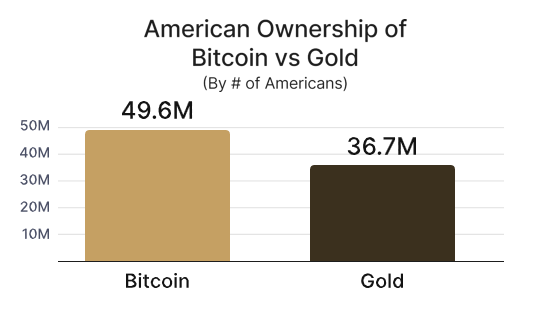
The US government’s bitcoin advantage is greater than that of gold, where the US accounts for just 29.9% of the world’s central bank gold reserves.
“Because there is a fixed supply of BTC, there is a strategic advantage to being among the first nations to create a strategic bitcoin reserve,” said the White House on March 7, 2025.
Politically, support for Bitcoin is gaining significant momentum across the U.S. government. As of now, 59% of U.S. Senators and 66% of House Representatives openly support pro-Bitcoin policies, signaling a notable shift in political attitudes and greater acceptance of digital assets as key components of America’s economic future.
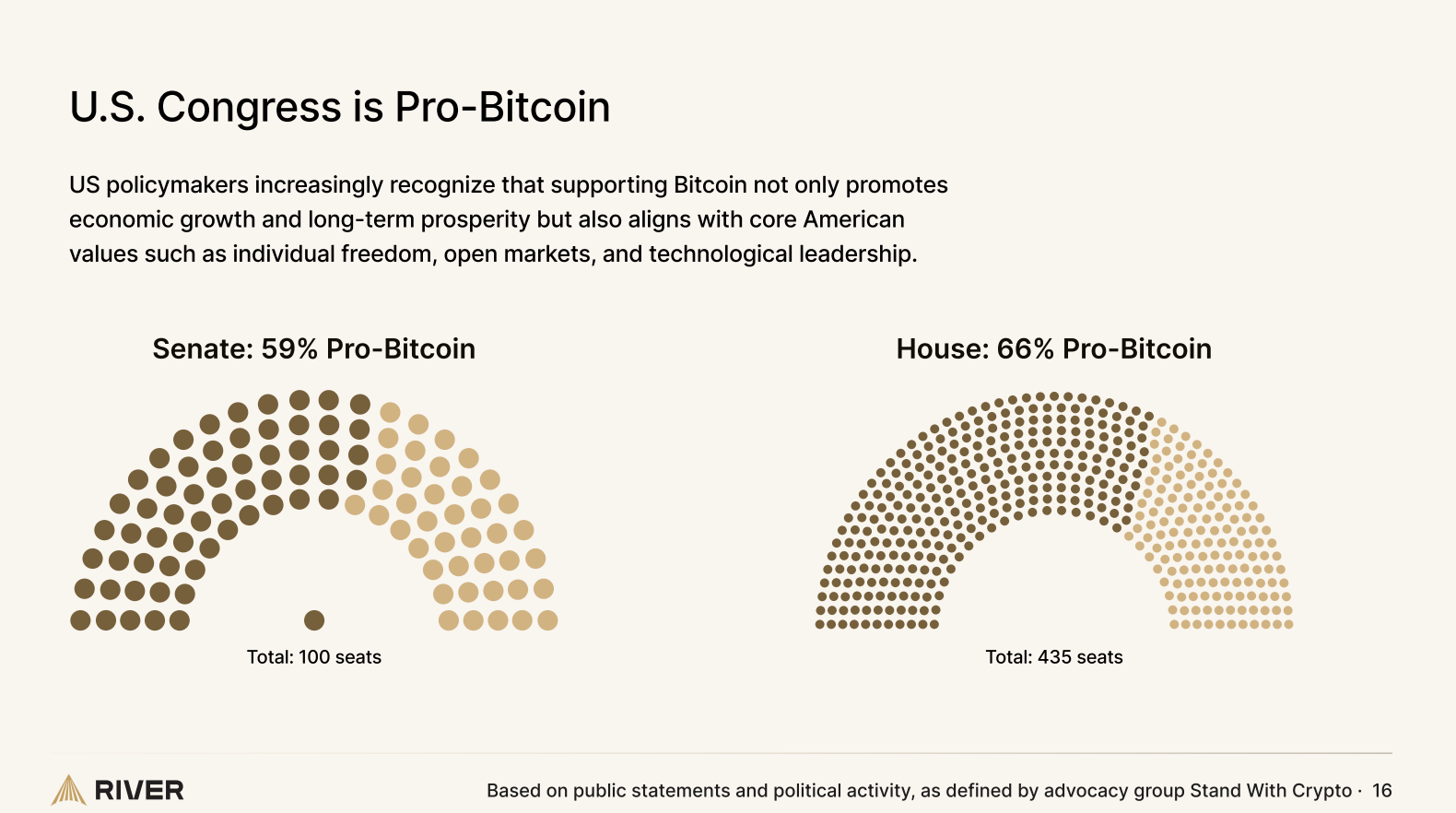
The study highlights that Bitcoin ownership is highest among American males aged 31-35 and 41-45, with ownership rates ranging from 3% to 41% within these age groups. Politically, those identifying as “very liberal” or “neutral” are more likely to own Bitcoin than conservatives, though conservatives still make up a significant portion of holders.
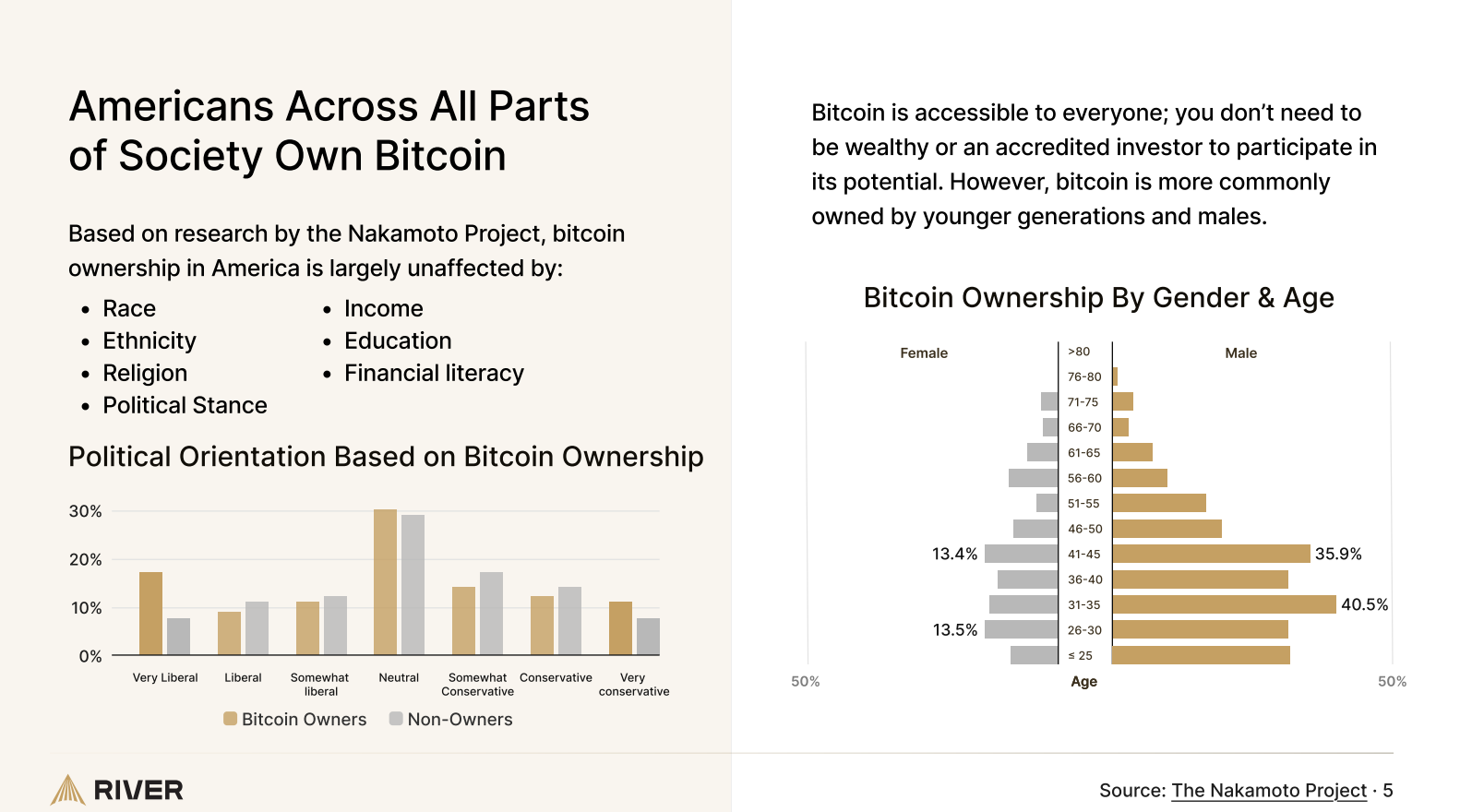
This post U.S. Leads the World in Bitcoin Ownership, New Report Shows first appeared on Bitcoin Magazine and is written by Oscar Zarraga Perez.
-
 @ 9ca447d2:fbf5a36d
2025-05-21 18:01:24
@ 9ca447d2:fbf5a36d
2025-05-21 18:01:24Bahrain-based Al Abraaj Restaurants Group has made history by becoming the first publicly-traded company in the Middle East to add bitcoin to its corporate treasury. This is a major step forward for regional bitcoin adoption.
On May 15, 2025, Al Abraaj Restaurants Group, a well-known restaurant chain listed on the Bahrain Bourse, announced it had bought 5 bitcoin (BTC) as part of a new treasury strategy. This makes the company the first in Bahrain, the GCC and the Middle East to officially hold bitcoin as a reserve asset.
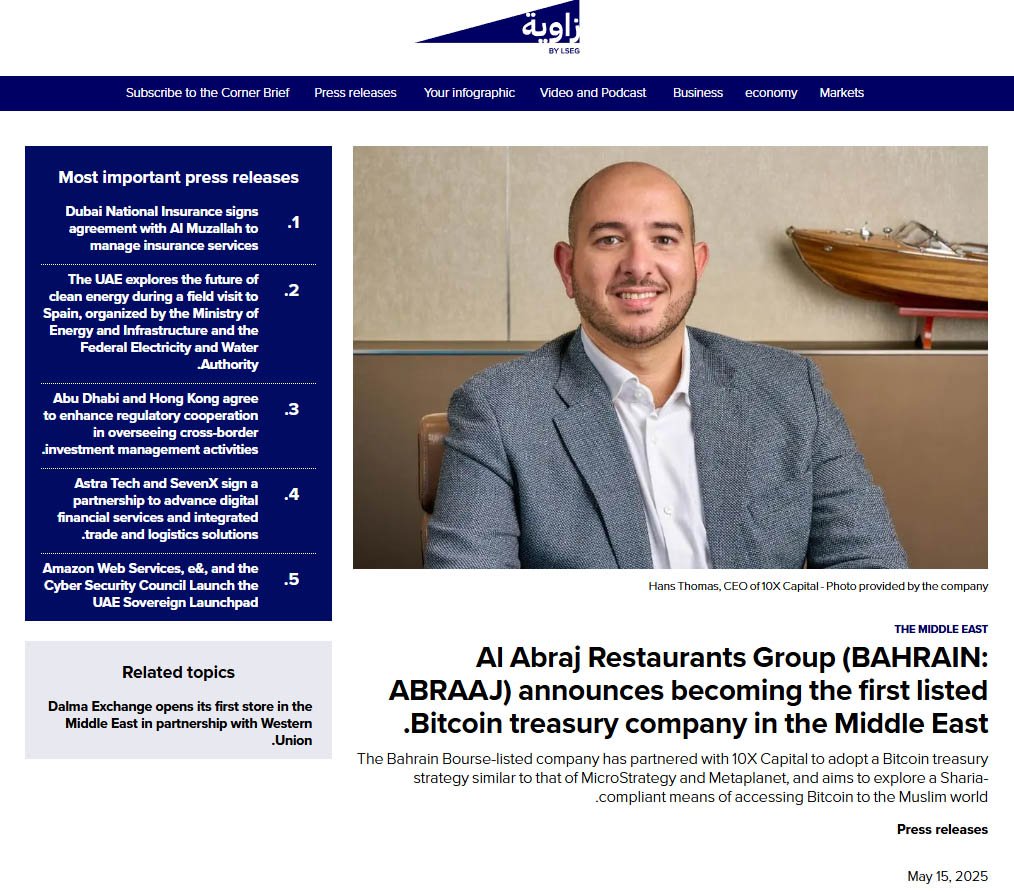
Al Abraaj adds bitcoin to its treasury — Zawya
This is a growing trend globally where companies are treating bitcoin not just as an investment but as a long-term store of value. Major companies like Strategy, Tesla and Metaplanet have already done this — and now Al Abraaj is following suit.
Metaplanet recently added 1,241 BTC to its treasury, boosting the company’s holdings above El Salvador’s.
Related: Metaplanet Overtakes El Salvador in Bitcoin Holdings After $126M Purchase
“Our initiative towards becoming a Bitcoin Treasury Company reflects our forward-thinking approach and dedication to maximizing shareholder value,” said Abdulla Isa, Chairman of the Bitcoin Treasury Committee at Al Abraaj.
Al Abraaj’s move is largely inspired by Michael Saylor, Executive Chairman of Strategy, the world’s largest corporate holder of bitcoin. Saylor’s strategy of allocating billions to bitcoin has set a model that other companies — now including Al Abraaj — are following.
A photo shared by the company even showed a meeting between an Al Abraaj representative and Saylor, with the company calling itself the “MicroStrategy of the Middle East”.
“We believe that Bitcoin will play a pivotal role in the future of finance, and we are excited to be at the forefront of this transformation in the Kingdom of Bahrain,” Isa added.
To support its bitcoin initiative, Al Abraaj has partnered with 10X Capital, a New York-based investment firm that specializes in digital assets.
10X Capital has a strong track record in bitcoin treasury strategies, and recently advised Nakamoto Holdings on a $710 million deal — the largest of its kind.
With 10X’s help, Al Abraaj looks to raise more capital and increase its bitcoin holdings over time to maximize bitcoin-per-share for its investors. The company will also develop Sharia-compliant financial instruments so Islamic investors can get exposure to bitcoin in a halal way.
“Bahrain continues to be a leader in the Middle East in Bitcoin adoption,” said Hans Thomas, CEO of 10X Capital. He noted, with a combined GDP of $2.2 trillion and over $6 trillion in sovereign wealth, the GCC now has its first publicly listed bitcoin treasury company.
This is not just a first for Al Abraaj — it’s a first for the region. Bahrain has been positioning itself as a fintech hub and Al Abraaj’s move will encourage more non-fintech companies in the region to look into bitcoin.
The company said the decision was made after thorough due diligence and is in line with the regulations set by the Central Bank of Bahrain (CBB). Al Abraaj will be fully compliant with all digital asset transaction rules, including transparency, security and governance.
A special Bitcoin Committee has been formed to oversee the treasury strategy. It includes experienced bitcoin investors, financial experts and portfolio managers who will manage risk, monitor market conditions and ensure best practices in custody and disclosure.
The initial purchase was 5 BTC, but Al Abraaj sees this as just the beginning. The company stated that there are plans in motion to allocate a significant portion of their treasury into bitcoin over time.
According to the company’s reports, Al Abraaj is financially sound with $12.5 million in EBITDA in 2024. This strong financial foundation gives the company the confidence to explore new strategies like bitcoin investment.
-
 @ cae03c48:2a7d6671
2025-05-21 17:01:44
@ cae03c48:2a7d6671
2025-05-21 17:01:44Bitcoin Magazine
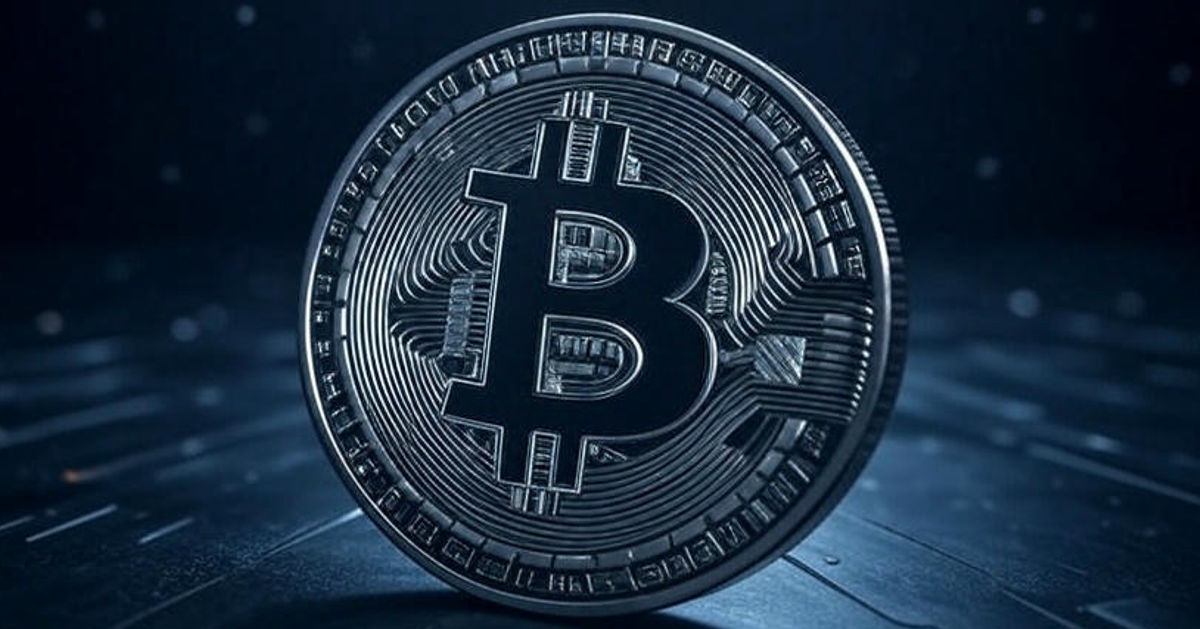
The Blockchain Group Secures €8.6 Million to Boost Bitcoin StrategyThe Blockchain Group (ALTBG), listed on Euronext Growth Paris and known as Europe’s first Bitcoin Treasury Company, has announced a capital increase of approximately €8.6 million as it pushes forward with its Bitcoin Treasury Company strategy. The funding was raised through two operations, a Reserved Capital Increase and a Private Placement, with both priced at €1.279 per share.
JUST IN:
 French company The Blockchain Group raises €8.6 million to buy more #Bitcoin pic.twitter.com/VjTKyFSS6w
French company The Blockchain Group raises €8.6 million to buy more #Bitcoin pic.twitter.com/VjTKyFSS6w— Bitcoin Magazine (@BitcoinMagazine) May 20, 2025
This price represents a 20.18% premium over the 20-day volume-weighted average share price but a 46.26% discount compared to the closing price on May 19, 2025, reflecting recent high share price volatility.
“The Company’s Board of Directors decided on May 19, 2025, using the delegated authority granted by the shareholders’ meeting held on February 21, 2025, under the terms of its 5th resolution, on an issuance, without pre-emptive rights for shareholders, of 3,368,258 new ordinary shares of the Company at a price of €1.2790 per share, including an issuance premium, representing a premium of approximately 20.18% compared to the weighted average of the twenty closing prices of ALTBG shares on Euronext Growth Paris preceding the decision of the Company’s Board of Directors, corresponding to a total subscription amount of €4,308,001.98,” said the press release.
In the Reserved Capital Increase, 3.37 million shares were issued to selected investors, including Robbie van den Oetelaar, TOBAM Bitcoin Treasury Opportunities Fund, and Quadrille Capital, raising over €4.3 million. The Private Placement raised another €4.35 million via the issuance of 3.4 million shares, targeting qualified investors.

“The Board of Directors also decided on a capital increase without pre-emptive rights for shareholders through an offering exclusively targeting a limited circle of investors acting on their own behalf or qualified investor, ” stated the press release.
The funds will support The Blockchain Group’s ongoing strategy of accumulating Bitcoin and expanding its subsidiaries in data intelligence, AI, and decentralized tech. Following this capital increase, the company’s share capital stands at €4.37 million, divided into over 109 million shares.

“The funds raised through the Capital Increase will enable the Company to strengthen its Bitcoin Treasury Company strategy, consisting in the accumulation of Bitcoin, while continuing to develop the operational activities of its subsidiaries,” said the press release.
Additionally, on May 12, The Blockchain Group announced it secured approximately €12.1 million through a convertible bond issuance reserved for Adam Back, CEO of Blockstream.
This post The Blockchain Group Secures €8.6 Million to Boost Bitcoin Strategy first appeared on Bitcoin Magazine and is written by Oscar Zarraga Perez.
-
 @ cae03c48:2a7d6671
2025-05-21 17:01:23
@ cae03c48:2a7d6671
2025-05-21 17:01:23Bitcoin Magazine

Attendees At First New York City Crypto Summit Implore Mayor Adams To End The BitLicenseToday, New York City hosted its first ever crypto summit.
The event took place at Gracie Mansion, the mayor’s residence, and was attended by prominent figures from the crypto industry, many of whom are based in New York.
At the event, Mayor Adams made the case that he felt the attendees’ pain, stating that they’ve wrongfully been persecuted, and he claimed that it’s now safe for those in the Bitcoin and crypto industry to both speak up and set up shop in New York.
“Look how they’ve treated you,” said Mayor Adams.
“You were treated as though you were the enemy instead of the believers,” he added.
“You’ve been hiding in the shadows, afraid to come out — come out now.”
As Mayor Adams continued, he recommitted to making New York the “crypto capital of the world,” something he first claimed he’d do in 2021, though not much has materialized on this front since then.
New York has continued to be a jurisdiction that’s nearly impossible for Bitcoin and crypto start ups to do business in thanks to the BitLicense, a license required to operate a digital asset company within the state.
Obtaining a BitLicense often costs upwards of $100,000 and takes months, if not years, of cutting through red tape and hopping over bureaucratic hurdles to attain.
Most start ups don’t have the time or funds to obtain one.
So, when Mayor Adams and New York City’s Chief Technology Officer, Matthew Fraser, tasked the attendees at today’s event, with coming up with solutions that would help to make New York City a more crypto-friendly jurisdiction, many brought up the need to abolish the BitLicense — or to at least make New York City immune to its reach.
New York City As A Bitcoin And Crypto Sanctuary City
“To build a thriving [crypto] economy, we have to get rid of the BitLicense,” said one attendee. “We at least need to build a regulatory sandbox in New York City.”
Another attendee argued that “New York City should become a sanctuary city from the BitLicense.”
Attendees made comments like these after sessions of roundtable discussions during which the attendees discussed different issues related to Bitcoin and crypto before having a representative from their table share proposals with the room at large. (Because the attendees agreed to honor the Chatham House Rule, I cannot offer the names of those who spoke on behalf of their groups at the event. However, I can offer the names of the keynote speakers.)
Another attendee who said that New York should become a “crypto sanctuary city” pointed out that there is precedent for this, as the city allowed the cannabis industry to operate within its borders while the rest of the state did not.
Nick Spanos, who founded the first in-person exchange and the earliest in-person Bitcoin meeting space in New York City, the Bitcoin Center, in 2013, also made the case for New York as a crypto sanctuary city.
“We’re giving sanctuary to immigrants — we can give sanctuary to crypto companies,” he said in an impassioned tone.

Nick Spanos claims that NYC should be a crypto sanctuary city. | Photo credit: Frank Corva
Spanos went on to critique the BitLicense, calling into question its legitimacy.
“What kind of license is it when, after 12 years, there are only 30 of them?!” cried Spanos. “That’s an insider license!”
Now Is The Time To Pass Crypto Legislation In New York State
Galaxy CEO Mike Novogratz highlighted that now is the time for New York to pass legislation that will benefit the crypto industry.
“After five difficult years, DC has said let’s embrace this technology,” said Novogratz, alluding to the notion that New York should follow the federal government’s lead.
“New York State has not made crypto easy — it’s taken a long time for people to get licenses,” he added.
Novogratz also shared that the crypto industry is “ready for take off,” though he also put the onus on the industry to prove itself by creating products that provide real value to users.
He concluded by saying that, thus far, he’s only really seen value in Bitcoin and stablecoins.
On the topic of stablecoins, Brock Pierce, co-founder of Tether, called on Albany (New York’s capitol) to pass Assembly Bill 6266 and Senate Bill 3262, both of which would establish requirements for the creation and operation of limited purpose trust companies if enacted into law. Such a law would seemingly play a role in enabling Tether to operate in New York.
Other Suggestions For Crypto Applications From The Attendees
A number of attendees also suggested creating crypto products that would help offer financial services to New York City’s approximately 305,000 residents who do not have a bank account (though, none suggested including bitcoin in these services).
Many also stressed the importance of “crypto and blockchain education” within New York’s public school system.
Even Mayor Adams touched on this in his talk.
“Every young person in the DOE [Department of Education] should know about blockchain and crypto,” he said.
And one attendee suggested using blockchain to safeguard the city’s public records.
(I piggybacked on this idea by suggesting that the city consider employing Simple Proof, a company that utilizes the OpenTimestamps protocol on Bitcoin to safeguard public documents, including election results, to help safeguard its important documents.)
Call To Action
Mayor Adams said that when he, the “mayor of the greatest city on the globe,” starts talking about Bitcoin and crypto the rest of the world will pay attention.
For this reason, he said he wanted the best and brightest to help guide him as he broaches the topic.
At the conclusion of the event, attendees were asked to share their notes so that Adams’ team could review them and potentially call on certain attendees to help the mayor forge a more favorable regulatory path forward.
It seems his staff was primed to help, as Fraser asked the attendees to “help the city deregulate the industry.”
Only time will now tell if Mayor Adams and his team will follow through on working with the Bitcoin and crypto industry to make it easier for companies to operate in New York City, or if he’ll lose interest in such an initiative, like he did four years ago.
This post Attendees At First New York City Crypto Summit Implore Mayor Adams To End The BitLicense first appeared on Bitcoin Magazine and is written by Frank Corva.
-
 @ cae03c48:2a7d6671
2025-05-21 17:01:13
@ cae03c48:2a7d6671
2025-05-21 17:01:13Bitcoin Magazine

Sangha Renewables Launches 20 MW Bitcoin Mining Facility Powered by Solar EnergySangha Renewables has officially broken ground on a 19.9-megawatt (MW) bitcoin mining facility in West Texas, marking a notable step in its mission to merge sustainable power with digital asset infrastructure, according to a recent press release sent to Bitcoin Magazine. Sangha also announced it has raised $14 million toward its $17 million target, helping bring its vision for renewable-powered bitcoin mining to life.
Developed in partnership with an independent power producer (IPP), the behind-the-meter facility will be located on an established solar energy site. Sangha’s project is designed to transform underutilized renewable assets into high-yield bitcoin-generating operations while delivering “optimized power monetization and attractive bitcoin-backed returns for investors.”
“Sangha is not just building bitcoin mining sites—we’re building a new model for how capital flows in and out of bitcoin,” said Spencer Marr, co-founder and CEO of Sangha Renewables. “By applying a project finance structure honed-in the renewable energy and real estate sectors, we enable investors to participate directly in productive assets—without intermediaries, speculative equities, or inefficiencies of datacenter hosting. Investors put cash or bitcoin into the construction of the project and then enjoy streaming distributions of bitcoin for years to come at well below the market price of bitcoin.”
Under the offtake agreement, Sangha will purchase 19.9 MW of power directly from the IPP. The solar site is impacted by grid congestion and negative energy pricing, making it an ideal fit for Sangha’s load-balancing model. “It’s a win-win-win,” Marr added. “The IPP earns more per megawatt-hour, our investors gain exposure to low-cost bitcoin production, and we deliver grid-stabilizing load where it’s needed most.”
The project is set to begin operations in Q3 2025 and will offer one of the lowest power costs in North America, according to the company. Sangha’s model is underpinned by smart site selection, transparent capital structures, and regulatory acumen—positioning it as a leader in institutional-grade bitcoin mining.
This facility represents Sangha’s proof-of-concept and the next chapter in the founders’ pivot from Sangha Systems to Sangha Renewables, emphasizing a commitment to sustainable, scalable, and investor-aligned bitcoin infrastructure.
This post Sangha Renewables Launches 20 MW Bitcoin Mining Facility Powered by Solar Energy first appeared on Bitcoin Magazine and is written by Jenna Montgomery.
-
 @ 9ca447d2:fbf5a36d
2025-05-21 18:01:23
@ 9ca447d2:fbf5a36d
2025-05-21 18:01:23Steak ‘n Shake recently made headlines by officially accepting bitcoin payments via the Lightning Network across all its U.S. locations. The integration of Bitcoin payments at over 500 locations is a monumental moment for both the fast food industry and the broader retail sector.
This is not just something that Steak ‘n Shake is testing in a handful of locations, they are doing a full-scale rollout, fully embracing Bitcoin.
With more than 100 million customers a year, Steak ‘n Shake’s integration of Lightning—Bitcoin’s fast, low-fee payment layer—makes it easier than ever to use Bitcoin in day-to-day life. Buying a burger and a shake with sats? That’s now a real option.
The process is straightforward. Customers simply scan a Lightning QR code at the register, completing their payment in seconds, while Steak ‘n Shake receives instant USD conversion, ensuring price stability and ease of use.
So what does this mean for Bitcoin and E-commerce?
For starters, Steak ‘n Shake becomes the first of eventually many to fully embrace a digital world. As Bitcoin continues to grow, consumers will continue to realize the benefits of saving in a currency that is truly scarce and decentralized.
This is a huge step forward for Bitcoin as it shows it is not just for holding, it’s for spending, too. And by using the Lightning Network, Steak n’ Shake is helping prove that Bitcoin can scale for everyday transactions.
This now creates a seamless checkout experience, making bitcoin a viable alternative to credit cards and cash.
More importantly, it signals a significant shift in mainstream attitudes towards Bitcoin. As a well-known brand across America, this move serves as a powerful endorsement, likely to influence other chains and retailers to consider similar integrations.
Related: Spar Supermarket in Switzerland Now Accepts Bitcoin Via Lightning
What can this mean for your business?
Accepting bitcoin as payment can open the door to a new demographic of tech-savvy, financially engaged consumers who prefer digital assets.
As we know, companies that adopt Bitcoin receive a fascinating amount of love from the Bitcoin community and I would assume Steak n’ Shake will be receiving the same amount of attention.
From a business perspective, accepting bitcoin has become more than just a payment method—it’s a marketing tool. It sets your business apart and gets people talking. And in a crowded market, that kind of edge matters.
Steak ‘n Shake’s embrace of Bitcoin is likely to accelerate the adoption of digital assets in both physical retail and e-commerce.
As more businesses witness the operational and marketing benefits, industry experts anticipate a ripple effect that will increase interaction between consumers and digital currencies, further regulatory clarity, and bring continued innovation in payment technology.
Steak ‘n Shake’s nationwide Bitcoin payments rollout is more than a novelty. It’s a pivotal development for digital payments, setting a precedent for other retailers and signaling the growing integration of digital assets into everyday commerce.
-
 @ 6fc114c7:8f4b1405
2025-05-21 16:45:29
@ 6fc114c7:8f4b1405
2025-05-21 16:45:29In the realm of cryptocurrency, the stakes are incredibly high, and losing access to your digital assets can be a daunting experience. But don’t worry — cryptrecver.com is here to transform that nightmare into a reality! With expert-led recovery services and leading-edge technology, Crypt Recver specializes in helping you regain access to your lost Bitcoin and other cryptocurrencies.
Why Choose Crypt Recver? 🤔 🔑 Expertise You Can Trust At Crypt Recver, we blend advanced technology with skilled engineers who have a solid track record in crypto recovery. Whether you’ve forgotten your passwords, lost your private keys, or encountered issues with damaged hardware wallets, our team is ready to assist.
⚡ Fast Recovery Process Time is crucial when recovering lost funds. Crypt Recver’s systems are designed for speed, enabling quick recoveries — allowing you to return to what matters most: trading and investing.
🎯 High Success Rate With a success rate exceeding 90%, our recovery team has aided numerous clients in regaining access to their lost assets. We grasp the complexities of cryptocurrency and are committed to providing effective solutions.
🛡️ Confidential & Secure Your privacy is paramount. All recovery sessions at Crypt Recver are encrypted and completely confidential. You can trust us with your information, knowing we uphold the highest security standards.
🔧 Advanced Recovery Tools We employ proprietary tools and techniques to tackle complex recovery scenarios, from retrieving corrupted wallets to restoring coins from invalid addresses. No matter the challenge, we have a solution.
Our Recovery Services Include: 📈 Bitcoin Recovery: Lost access to your Bitcoin wallet? We can assist in recovering lost wallets, private keys, and passphrases. Transaction Recovery: Mistaken transfers, lost passwords, or missing transaction records — let us help you reclaim your funds! Cold Wallet Restoration: Did your cold wallet fail? We specialize in safely extracting assets. Private Key Generation: Forgotten your private key? We can help you generate new keys linked to your funds without compromising security. Don’t Let Lost Crypto Ruin Your Day! 🕒 With an estimated 3 to 3.4 million BTC lost forever, it’s essential to act quickly when facing access issues. Whether you’ve been affected by a dust attack or simply forgotten your key, Crypt Recver provides the support you need to reclaim your digital assets.
🚀 Start Your Recovery Now! Ready to retrieve your cryptocurrency? Don’t let uncertainty hold you back! 👉 Request Wallet Recovery Help Today!cryptrecver.com
Need Immediate Assistance? 📞 For quick queries or support, connect with us on: ✉️ Telegram: t.me/crypptrcver 💬 WhatsApp: +1(941)317–1821
Trust Crypt Recver for the best crypto recovery service — get back to trading with confidence! 💪
In the realm of cryptocurrency, the stakes are incredibly high, and losing access to your digital assets can be a daunting experience. But don’t worry — cryptrecver.com is here to transform that nightmare into a reality! With expert-led recovery services and leading-edge technology, Crypt Recver specializes in helping you regain access to your lost Bitcoin and other cryptocurrencies.
 # Why Choose Crypt Recver? 🤔
# Why Choose Crypt Recver? 🤔🔑 Expertise You Can Trust\ At Crypt Recver, we blend advanced technology with skilled engineers who have a solid track record in crypto recovery. Whether you’ve forgotten your passwords, lost your private keys, or encountered issues with damaged hardware wallets, our team is ready to assist.
⚡ Fast Recovery Process\ Time is crucial when recovering lost funds. Crypt Recver’s systems are designed for speed, enabling quick recoveries — allowing you to return to what matters most: trading and investing.
🎯 High Success Rate\ With a success rate exceeding 90%, our recovery team has aided numerous clients in regaining access to their lost assets. We grasp the complexities of cryptocurrency and are committed to providing effective solutions.
🛡️ Confidential & Secure\ Your privacy is paramount. All recovery sessions at Crypt Recver are encrypted and completely confidential. You can trust us with your information, knowing we uphold the highest security standards.
🔧 Advanced Recovery Tools\ We employ proprietary tools and techniques to tackle complex recovery scenarios, from retrieving corrupted wallets to restoring coins from invalid addresses. No matter the challenge, we have a solution.
 # Our Recovery Services Include: 📈
# Our Recovery Services Include: 📈- Bitcoin Recovery: Lost access to your Bitcoin wallet? We can assist in recovering lost wallets, private keys, and passphrases.
- Transaction Recovery: Mistaken transfers, lost passwords, or missing transaction records — let us help you reclaim your funds!
- Cold Wallet Restoration: Did your cold wallet fail? We specialize in safely extracting assets.
- Private Key Generation: Forgotten your private key? We can help you generate new keys linked to your funds without compromising security.
Don’t Let Lost Crypto Ruin Your Day! 🕒
With an estimated 3 to 3.4 million BTC lost forever, it’s essential to act quickly when facing access issues. Whether you’ve been affected by a dust attack or simply forgotten your key, Crypt Recver provides the support you need to reclaim your digital assets.
🚀 Start Your Recovery Now!\ Ready to retrieve your cryptocurrency? Don’t let uncertainty hold you back!\ 👉 Request Wallet Recovery Help Today!cryptrecver.com
Need Immediate Assistance? 📞
For quick queries or support, connect with us on:\ ✉️ Telegram: t.me/crypptrcver\ 💬 WhatsApp: +1(941)317–1821
Trust Crypt Recver for the best crypto recovery service — get back to trading with confidence! 💪
-
 @ 9ca447d2:fbf5a36d
2025-05-21 18:01:22
@ 9ca447d2:fbf5a36d
2025-05-21 18:01:22Panama City may be the next Latin American city to adopt bitcoin, after El Salvador.
Panama City Mayor Mayer Mizrachi has got the bitcoin world excited after hinting that the city might have a bitcoin reserve. The speculation started on May 16 when Mizrachi posted a simple but powerful message on X:
Two words. That’s it. What makes it special is that it came after a high-profile meeting with Max Keiser and Stacy Herbert, two key figures behind El Salvador’s bitcoin strategy.
Keiser is an advisor to El Salvador’s President Nayib Bukele and Herbert leads the country’s Bitcoin Office.
El Salvador became the first country to adopt bitcoin as legal tender back in 2021. Since then, it has been building a national bitcoin reserve, currently holding 6,179 BTC worth around $640 million. It’s also using geothermal energy to power bitcoin mining in an eco-friendly way.
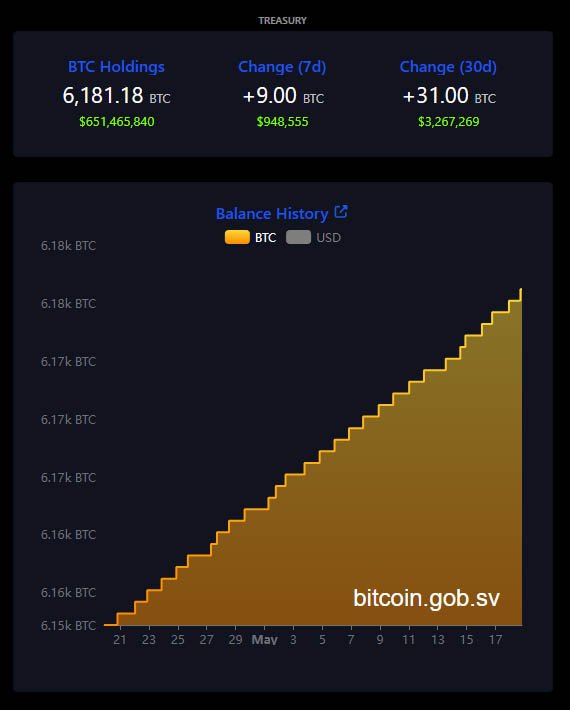
El Salvador’s bitcoin treasury — Bitcoin.gob.sv
Mizrachi’s meeting with Keiser and Herbert was about how Panama could do the same. While the details of the conversation are private, Keiser shared on social media that the two countries will play a big role in the future of Bitcoin.
“Bitcoin is transforming Central America,” Keiser wrote. “El Salvador’s geothermal & Panama’s hydro-electric will power the Bitcoin revolution.”
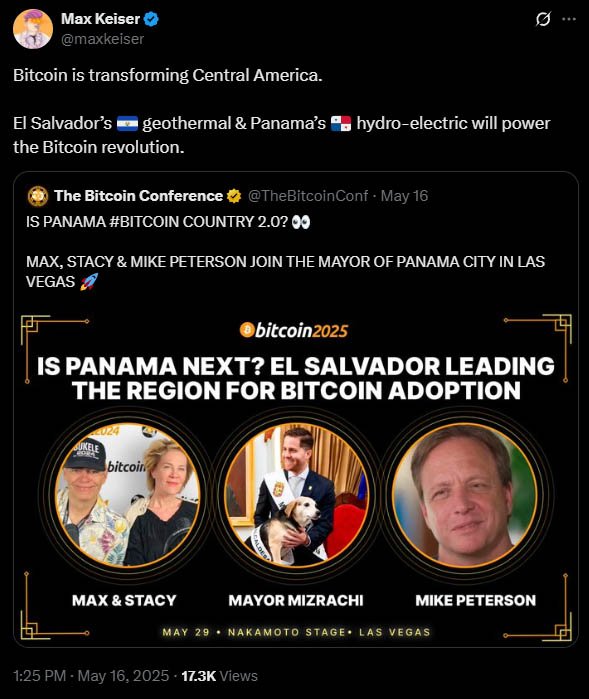
Max Keiser on X
Panama with its hydroelectric power could be a hub for green bitcoin mining.
Mizrachi has not announced a bitcoin reserve plan nor submitted a proposal to the National Assembly. But his post and public appearances suggest it’s being considered.
He will be speaking at the upcoming Bitcoin 2025 Conference in Las Vegas just days after his social media post. Many expect he will share more about Panama City’s bitcoin plans during his talk.
If Mizrachi pushes for a bitcoin reserve, he will need to work with national lawmakers to pass new legislation. So far, there is no evidence of that.
Even without a bitcoin reserve, Panama City is already going big on digital assets.
In April 2025, the city council approved a measure to allow residents to pay taxes, fees, fines and permits with digital currencies. Supported tokens are bitcoin (BTC), ethereum (ETH), USD Coin (USDC) and Tether (USDT).
To comply with financial laws, the city has partnered with a bank that instantly converts these digital assets into U.S. dollars. According to Mizrachi, this way it’s easier for residents to use digital assets and the city’s financial operations will be transparent and legal.
Another part of the meeting with El Salvador’s advisors was education.
Stacy Herbert confirmed that Panama City will be integrating El Salvador’s financial literacy book, “What is Money?” into their digital library system. The goal is to help students, teachers and the general public understand bitcoin and digital currencies in modern finance.
This is a trend in Latin America where countries are looking for alternatives to traditional banking systems. Inflation, economic instability and the rise of decentralized finance are forcing governments to look into new financial tools.
-
 @ f85b9c2c:d190bcff
2025-05-21 16:38:32
@ f85b9c2c:d190bcff
2025-05-21 16:38:32 HUNT or be HUNTED in the human food chain.
HUNT or be HUNTED in the human food chain.That's the raw truth of life, not just in the wild but in the intricate web of human society, where we're all part of a relentless food chain. At the core, life is a survival game, where every individual, knowingly or not, plays their part either as hunter or prey. But in human society, the stakes aren't just about physical survival; they're about financial, social, and psychological dominance. Here, the food chain isn't just about who eats whom but who can leverage, influence, or sometimes exploit others for their own gain.
Leaders, those at the top of this human hierarchy, often have a knack for exploitation, albeit wrapped in the guise of opportunity or progress. They understand the game: to maintain their position, they must keep feeding on the resources, be they intellectual, financial, or labor from those below. Think about how big corporations might use their power to influence legislation, control markets, or keep wages low to maximize profit. The poor, in this scenario, are often the hunted, their energy and labor harvested to sustain the comfort and luxury of those at the top. But here's the twist in this human food chain: everyone, from the top to the bottom, engages in some form of selfishness. It's not just about the rich exploiting the poor; even within the same strata, we see people clawing for their spot, their advantage. We're all, in some way, looking out for number one, whether it's through office politics, personal branding, or simply ensuring our survival in an increasingly competitive world. We justify our actions, our small betrayals or manipulations, as necessary for survival or success, mirroring the natural world where every creature fights to live another day. This doesn't mean we're all villains or victims; it's just the reality of the game we're all playing. The key is recognizing this dynamic and deciding how you'll play your part. Will you be the prey, always on the run or hiding, or will you become the predator, learning to hunt, to strategize, to thrive? Here’s what I’ve learned through my journey up this chain: it’s not about the ruthlessness of taking but the resilience to grow. The most dangerous predators in our world are those who not only know how to hunt but also how to adapt, learn, and sometimes, protect or help others as part of their strategy (I think I might be part of them). It’s about understanding that today’s prey could be tomorrow’s ally or competitor.
So, to those reading this, don't give up. The climb to the top is steep, fraught with challenges, but it's not impossible. Keep learning, keep evolving. Use your experiences, your setbacks as lessons rather than defeats. In this human food chain, there's always room at the top for those willing to work for it, to adapt, to survive, and to thrive. I hope to see you at the top of the food chain, not just surviving, but truly living.
-
 @ 9ca447d2:fbf5a36d
2025-05-21 18:01:21
@ 9ca447d2:fbf5a36d
2025-05-21 18:01:21Ed Suman, a 67-year-old retired artist who helped create large sculptures like Jeff Koons’ Balloon Dog, reportedly lost his entire life savings — over $2M in digital assets — in a sophisticated scam.
The incident is believed to be tied to the major data breach at Coinbase, one of the world’s largest digital asset exchanges.
Suman’s story is part of a bigger wave of attacks on digital asset holders using stolen personal info, and has triggered lawsuits, regulatory concerns and questions about digital security in the Bitcoin space.
In March 2025, Suman got a text message about suspicious activity on his Coinbase account. After Suman reported he was unaware of any unauthorized activity regarding his account, he got a call from a man who introduced himself as Brett Miller from Coinbase Security.
The guy sounded legit — he knew Suman’s setup, including that he used a Trezor Model One hardware wallet, a device meant to keep bitcoin and other digital assets offline and safe.
Suman told Bloomberg the guy knew everything, including the exact amount of digital assets he had.
The attacker persuaded Suman that his Trezor One hardware wallet and its funds were at risk and walked him through a “security procedure” that involved entering his seed phrase into a website that looked exactly like Coinbase, in order to “link his wallet to Coinbase”.
Nine days later, another guy called and repeated the process, saying the first one didn’t work.
And then, all of Suman’s digital assets — 17.5 bitcoin and 225 ether — were gone. At the time, bitcoin was around $103,000 and ether around $2,500, so the stolen stash was worth over $2 million.
Suman turned to digital assets after retiring from a decades-long art career. He stored his assets in cold storage to avoid the risks of online exchanges. He thought he did everything right.
Suman’s attackers didn’t pick his name out of a hat.
It looks like his personal info may have been leaked in the major breach at Coinbase. The company confirmed on May 15 that some of its customer service reps in India were bribed to access internal systems and steal customer data.
The stolen data included names, phone numbers, email addresses, balances and partial Social Security numbers.
According to Coinbase’s filing with the U.S. Securities and Exchange Commission, the breach may have started as early as January and affected nearly 1% of the company’s active monthly users — tens of thousands of people.
Hackers demanded $20M from Coinbase to keep the breach quiet but the company refused to pay. Coinbase says it fired the compromised agents and is setting aside $180M to $400M to reimburse affected users.
But so far, Suman hasn’t been told if he’ll be reimbursed.
Since the breach was disclosed, Coinbase has been hit with at least six lawsuits.
The lawsuits claim the company failed to protect user data and handled the aftermath poorly. One lawsuit filed in New York federal court on May 16 says Coinbase’s response was “inadequate, fragmented, and delayed.”
“Users were not promptly or fully informed of the compromise,” the complaint states, “and Coinbase did not immediately take meaningful steps to mitigate further harm.”
Some lawsuits are seeking damages, others are asking Coinbase to purge user data and improve its security. Coinbase has not commented on the lawsuits but pointed reporters to a blog post about its response.
Suman’s case is a cautionary tale across the Bitcoin world. He used a hardware wallet (considered the gold standard of Bitcoin security) and was still tricked through social engineering. Even the strongest security is useless if you don’t understand how Bitcoin works.
It’s never too early for Bitcoiners to start learning more about Bitcoin, especially on how to keep their stash safe. And the first lesson is “never ever share your seed phrase with anyone”.
Related: Bitcoin Hardware Wallet Hacks: What You Need to Know
-
 @ f85b9c2c:d190bcff
2025-05-21 16:35:02
@ f85b9c2c:d190bcff
2025-05-21 16:35:02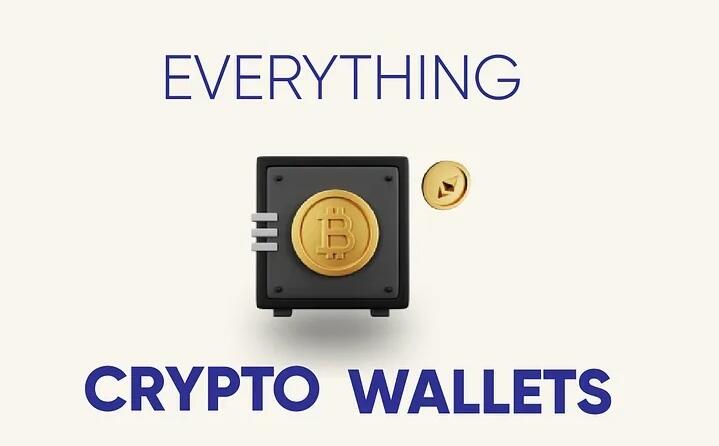 A Crypto Wallet is a container for digital assets (Cryptocurrencies & NFT). It’s like a tool that helps us manage our assets in one place and allows us to do transactions. It is a gateway to blockchain. Cryptocurrencies never leave the native blockchain, they are just transferred from one wallet to another.
A Crypto Wallet is a container for digital assets (Cryptocurrencies & NFT). It’s like a tool that helps us manage our assets in one place and allows us to do transactions. It is a gateway to blockchain. Cryptocurrencies never leave the native blockchain, they are just transferred from one wallet to another.A Wallet has two components : 1. Public Key 2. Private Key
Public Key The address that you use to send or receive the assets is the public key. For different tokens on a same chain, there is one public key. Whereas for multi chain wallets there are multiple public keys for each chain. That’s why you have same wallet address for DAI and ETH in Metamask, whereas different addresses for Solana and Eth.
Private Key The private key is a 12, 18 or 24 long phrase that we are asked to save when we create a new wallet. This phrase is needed to verify the ownership of the assets in the wallet, if you loose your phrase you lose the assets in the wallet.
There are 2 types of wallets: 1.Hot wallet 2.Cold wallet Hot wallet The wallet that is connected to the internet is called a hot wallet. Like Metamask Phantom or Trust Wallet. It’s also called Software Wallet that can be either web based/extension, desktop wallet or mobile app wallet. Cold wallet It’s a hardware device that stores the assets along with private and the public keys but is never connected to the internet. It’s like a store of value, people who hold for long term prefer using a ledger as it’s safe from hackers
-
 @ 9ca447d2:fbf5a36d
2025-05-21 18:01:20
@ 9ca447d2:fbf5a36d
2025-05-21 18:01:20JPMorgan Chase, the biggest bank in the U.S., is now allowing its clients to buy bitcoin — a big change of heart for an institution whose CEO, Jamie Dimon, has been a long-time critic of the scarce digital asset.
Dimon made the announcement on the bank’s investor day, which came as a shift in JPMorgan’s approach to digital assets. “We are going to allow you to buy it,” he said. “We’re not going to custody it. We’re going to put it in statements for clients.”
That means clients can buy BTC through JPMorgan but the bank won’t hold or store the digital asset. Instead it will provide access and include the BTC purchases in client statements.
According to multiple reports and posts, JPMorgan has been blocking transactions from digital asset exchanges, with several people complaining about their experience on social media.
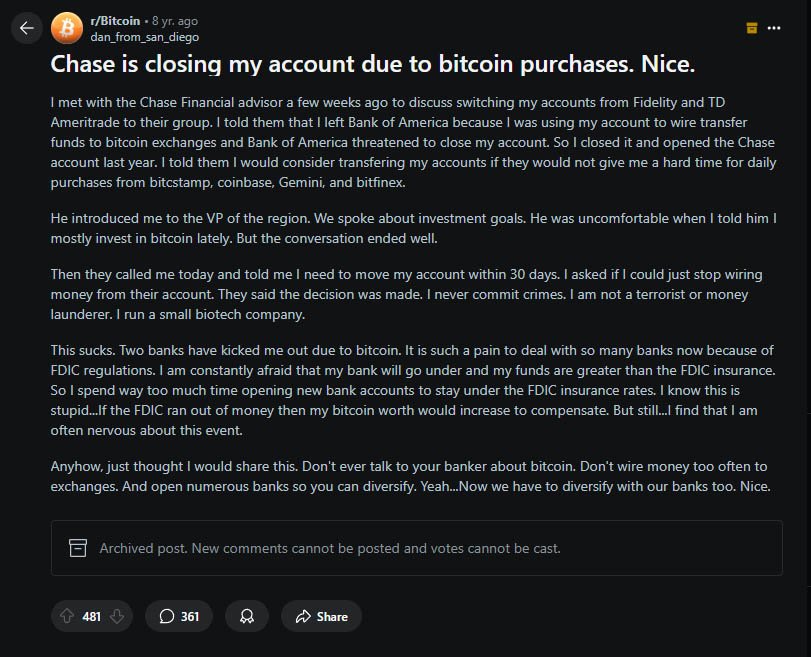
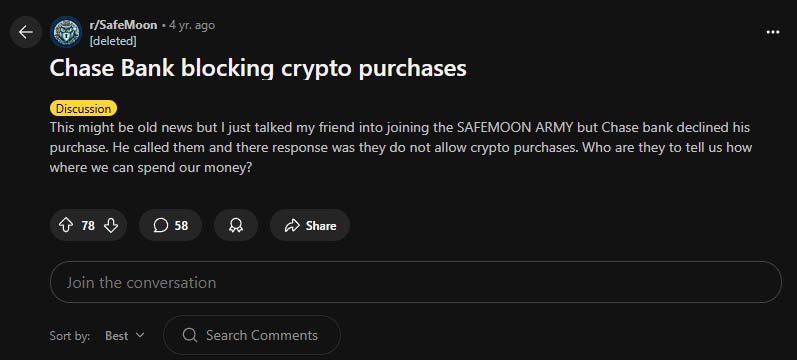
There is even an official notice on the company’s UK website that explicitly says customers cannot use their funds to purchase digital assets.
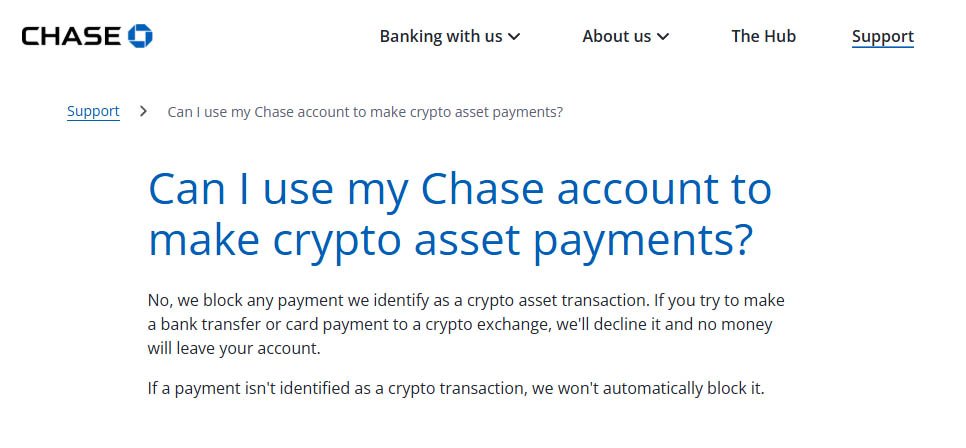
JPMorgan Chase UK website — Source
It’s a big change because Dimon has been one of Bitcoin’s biggest critics. Over the years he’s called it “worthless”, a “fraud” and even compared it to a “pet rock”.
He’s repeatedly expressed concern over digital assets’ use in illegal activities such as money laundering, terrorism, sex trafficking and tax evasion. A role that his critics say the U.S. dollar is playing on a much larger scale.
Related: Jamie Dimon Would “Close Down” Bitcoin If He Had Government Role
“The only true use case for it is criminals, drug traffickers … money laundering, tax avoidance,” he told lawmakers during a Senate hearing in 2023. At the 2024 World Economic Forum in Davos, he doubled down, “Bitcoin does nothing. I call it the pet rock.”
Despite his personal views, Dimon says the bank is responding to client demand. “I don’t think you should smoke, but I defend your right to smoke,” he said. “I defend your right to buy bitcoin.”
It’s worth noting JPMorgan isn’t fully embracing digital assets. The bank won’t be offering direct custody services or launching its own exchange.
Instead, it’s offering access to digital asset exchanges. There are even reports that the bank also plans to facilitate access to bitcoin ETFs and possibly other investment vehicles. Until recently, JPMorgan had limited its bitcoin exposure to futures-based products.
Other big financial firms have already taken similar steps.
Morgan Stanley, for example, has been offering some clients access to bitcoin ETFs since August 2024. Its CEO, Ted Pick, said earlier this year that the firm is working closely with regulators to explore ways to get into the digital assets space.
Dimon does like blockchain, though — the technology that underpins it. JPMorgan has its own blockchain projects including JPM Coin and recently ran a test transaction on a public blockchain of tokenized U.S. Treasuries.
Many criticize this view, saying that the most powerful aspect of Bitcoin is its decentralization. So, a centralized blockchain is just useless. This might be the reason Dimon has grown weary of all JPMorgan’s blockchain initiatives, because they offered nothing of value.
He said he might have given blockchain too much credit during his investor day comments: “We have been talking about blockchain for 12 to 15 years,” he said. “We spend too much on it. It doesn’t matter as much as you all think.”
-
 @ 0e9491aa:ef2adadf
2025-05-21 18:01:18
@ 0e9491aa:ef2adadf
2025-05-21 18:01:18
What is KYC/AML?
- The acronym stands for Know Your Customer / Anti Money Laundering.
- In practice it stands for the surveillance measures companies are often compelled to take against their customers by financial regulators.
- Methods differ but often include: Passport Scans, Driver License Uploads, Social Security Numbers, Home Address, Phone Number, Face Scans.
- Bitcoin companies will also store all withdrawal and deposit addresses which can then be used to track bitcoin transactions on the bitcoin block chain.
- This data is then stored and shared. Regulations often require companies to hold this information for a set number of years but in practice users should assume this data will be held indefinitely. Data is often stored insecurely, which results in frequent hacks and leaks.
- KYC/AML data collection puts all honest users at risk of theft, extortion, and persecution while being ineffective at stopping crime. Criminals often use counterfeit, bought, or stolen credentials to get around the requirements. Criminals can buy "verified" accounts for as little as $200. Furthermore, billions of people are excluded from financial services as a result of KYC/AML requirements.
During the early days of bitcoin most services did not require this sensitive user data, but as adoption increased so did the surveillance measures. At this point, most large bitcoin companies are collecting and storing massive lists of bitcoiners, our sensitive personal information, and our transaction history.
Lists of Bitcoiners
KYC/AML policies are a direct attack on bitcoiners. Lists of bitcoiners and our transaction history will inevitably be used against us.
Once you are on a list with your bitcoin transaction history that record will always exist. Generally speaking, tracking bitcoin is based on probability analysis of ownership change. Surveillance firms use various heuristics to determine if you are sending bitcoin to yourself or if ownership is actually changing hands. You can obtain better privacy going forward by using collaborative transactions such as coinjoin to break this probability analysis.
Fortunately, you can buy bitcoin without providing intimate personal information. Tools such as peach, hodlhodl, robosats, azteco and bisq help; mining is also a solid option: anyone can plug a miner into power and internet and earn bitcoin by mining privately.
You can also earn bitcoin by providing goods and/or services that can be purchased with bitcoin. Long term, circular economies will mitigate this threat: most people will not buy bitcoin - they will earn bitcoin - most people will not sell bitcoin - they will spend bitcoin.
There is no such thing as KYC or No KYC bitcoin, there are bitcoiners on lists and those that are not on lists.
If you found this post helpful support my work with bitcoin.

-
 @ da8b7de1:c0164aee
2025-05-21 15:59:12
@ da8b7de1:c0164aee
2025-05-21 15:59:12Blykalla svéd fejlesztő következő tőkebevonási köre augusztus végéig
A svéd Blykalla, amely fejlett ólom-hűtésű gyorsreaktorokat (SEALER) fejleszt, augusztus végéig tervezi következő tőkebevonási körét. A vállalat nemrég 7,3 millió dolláros befektetést szerzett, amellyel összesen már 20 millió dollárnyi forrást gyűjtött össze. A SEALER technológia jelentősen hatékonyabb üzemanyag-felhasználást ígér, akár 140-szeres hatékonysággal a hagyományos könnyűvizes reaktorokhoz képest. Az első két reaktort Svédországban tervezik megépíteni, de már ukrán és más európai, valamint kanadai partnerekkel is tárgyalnak. A következő lépés a tesztreaktor megépítése és az engedélyezési folyamat elindítása, amelyet 2025-re terveznek lezárni. A vállalat célja, hogy technológiai szolgáltatóként jelenjen meg, nem pedig üzemeltetőként[2].
Amerikai szenátorok törvényjavaslata Kína és Oroszország nukleáris befolyása ellen
Amerikai republikánus és demokrata szenátorok közösen nyújtottak be törvényjavaslatot, amelynek célja Kína és Oroszország növekvő nemzetközi nukleáris befolyásának visszaszorítása. Az International Nuclear Energy Act egy új hivatalt hozna létre, amely a nukleáris exportot, finanszírozást és szabályozási szabványosítást erősítené. A törvényjavaslat egy alapot is létrehozna a nemzetbiztonság szempontjából fontos projektek finanszírozására, valamint kétévente kabinet szintű egyeztetést írna elő a nukleáris biztonságról és ipar-politikai kérdésekről. A kezdeményezés hátterében az elektromos áram iránti várható keresletnövekedés és a szektor stratégiai jelentősége áll[3].
India 49%-os külföldi tulajdon engedélyezését fontolgatja a nukleáris szektorban
India fontolgatja, hogy akár 49%-os külföldi tulajdont is engedélyezzen atomerőműveiben, hogy elérje ambiciózus nukleáris kapacitásbővítési céljait és csökkentse szén-dioxid-kibocsátását. Jelenleg a külföldi befektetők számára tilos az atomerőművekben való tulajdonszerzés, de a kormány tervezi a szabályozás lazítását, beleértve a nukleáris felelősségi törvények enyhítését is. A cél az, hogy 2047-re 12-ről 100 gigawattra növeljék az ország nukleáris kapacitását. Bármilyen külföldi befektetéshez továbbra is kormányzati jóváhagyás szükséges lenne[4].
NRC: végleges környezeti jelentés a Summer-1 engedélymegújításáról
Az amerikai Nukleáris Szabályozási Bizottság (NRC) közzétette a Summer-1 atomerőmű engedélymegújításához kapcsolódó végleges környezeti hatástanulmányát. A jelentés szerint nincs olyan jelentős környezeti hatás, amely akadályozná a 966 MWe teljesítményű reaktor további 20 évig tartó üzemeltetését 2042 után. A vizsgálat alternatív energiaforrásokat is értékelt, de egyik sem bizonyult jobbnak a jelenlegi atomenergia-használatnál. A Summer-1 egység különálló a befejezetlen Summer-2 és -3 blokkoktól, amelyek építését 2017-ben leállították[5].
Nemzetközi nukleáris hatósági és technológiai fejlemények
A szlovéniai Portorozban május közepén tartották a közép-európai nukleáris hatóságok éves találkozóját, ahol a biztonsági és technológiai együttműködés volt a fókuszban. Emellett a BME megalapította a Mikro- és Kis Moduláris Reaktorok Kompetenciaközpontját, amely a magyarországi SMR-technológia fejlesztését és elterjesztését támogatja[6][7].
Hivatkozások
- nucnet.org
- ignition-news.com
- investing.com
- energynews.oedigital.com
- ans.org
- pakspress.hu
- mandiner.hu
-
 @ 0e9491aa:ef2adadf
2025-05-21 18:01:17
@ 0e9491aa:ef2adadf
2025-05-21 18:01:17
The former seems to have found solid product market fit. Expect significant volume, adoption, and usage going forward.
The latter's future remains to be seen. Dependence on Tor, which has had massive reliability issues, and lack of strong privacy guarantees put it at risk.
— ODELL (@ODELL) October 27, 2022
The Basics
- Lightning is a protocol that enables cheap and fast native bitcoin transactions.
- At the core of the protocol is the ability for bitcoin users to create a payment channel with another user.
- These payment channels enable users to make many bitcoin transactions between each other with only two on-chain bitcoin transactions: the channel open transaction and the channel close transaction.
- Essentially lightning is a protocol for interoperable batched bitcoin transactions.
- It is expected that on chain bitcoin transaction fees will increase with adoption and the ability to easily batch transactions will save users significant money.
- As these lightning transactions are processed, liquidity flows from one side of a channel to the other side, on chain transactions are signed by both parties but not broadcasted to update this balance.
- Lightning is designed to be trust minimized, either party in a payment channel can close the channel at any time and their bitcoin will be settled on chain without trusting the other party.
There is no 'Lightning Network'
- Many people refer to the aggregate of all lightning channels as 'The Lightning Network' but this is a false premise.
- There are many lightning channels between many different users and funds can flow across interconnected channels as long as there is a route through peers.
- If a lightning transaction requires multiple hops it will flow through multiple interconnected channels, adjusting the balance of all channels along the route, and paying lightning transaction fees that are set by each node on the route.
Example: You have a channel with Bob. Bob has a channel with Charlie. You can pay Charlie through your channel with Bob and Bob's channel with User C.
- As a result, it is not guaranteed that every lightning user can pay every other lightning user, they must have a route of interconnected channels between sender and receiver.
Lightning in Practice
- Lightning has already found product market fit and usage as an interconnected payment protocol between large professional custodians.
- They are able to easily manage channels and liquidity between each other without trust using this interoperable protocol.
- Lightning payments between large custodians are fast and easy. End users do not have to run their own node or manage their channels and liquidity. These payments rarely fail due to professional management of custodial nodes.
- The tradeoff is one inherent to custodians and other trusted third parties. Custodial wallets can steal funds and compromise user privacy.
Sovereign Lightning
- Trusted third parties are security holes.
- Users must run their own node and manage their own channels in order to use lightning without trusting a third party. This remains the single largest friction point for sovereign lightning usage: the mental burden of actively running a lightning node and associated liquidity management.
- Bitcoin development prioritizes node accessibility so cost to self host your own node is low but if a node is run at home or office, Tor or a VPN is recommended to mask your IP address: otherwise it is visible to the entire network and represents a privacy risk.
- This privacy risk is heightened due to the potential for certain governments to go after sovereign lightning users and compel them to shutdown their nodes. If their IP Address is exposed they are easier to target.
- Fortunately the tools to run and manage nodes continue to get easier but it is important to understand that this will always be a friction point when compared to custodial services.
The Potential Fracture of Lightning
- Any lightning user can choose which users are allowed to open channels with them.
- One potential is that professional custodians only peer with other professional custodians.
- We already see nodes like those run by CashApp only have channels open with other regulated counterparties. This could be due to performance goals, liability reduction, or regulatory pressure.
- Fortunately some of their peers are connected to non-regulated parties so payments to and from sovereign lightning users are still successfully processed by CashApp but this may not always be the case going forward.
Summary
- Many people refer to the aggregate of all lightning channels as 'The Lightning Network' but this is a false premise. There is no singular 'Lightning Network' but rather many payment channels between distinct peers, some connected with each other and some not.
- Lightning as an interoperable payment protocol between professional custodians seems to have found solid product market fit. Expect significant volume, adoption, and usage going forward.
- Lightning as a robust sovereign payment protocol has yet to be battle tested. Heavy reliance on Tor, which has had massive reliability issues, the friction of active liquidity management, significant on chain fee burden for small amounts, interactivity constraints on mobile, and lack of strong privacy guarantees put it at risk.
If you have never used lightning before, use this guide to get started on your phone.
If you found this post helpful support my work with bitcoin.

-
 @ 0e9491aa:ef2adadf
2025-05-21 18:01:17
@ 0e9491aa:ef2adadf
2025-05-21 18:01:17
Bank run on every crypto bank then bank run on every "real" bank.
— ODELL (@ODELL) December 14, 2022
The four main banks of bitcoin and “crypto” are Signature, Prime Trust, Silvergate, and Silicon Valley Bank. Prime Trust does not custody funds themselves but rather maintains deposit accounts at BMO Harris Bank, Cross River, Lexicon Bank, MVB Bank, and Signature Bank. Silvergate and Silicon Valley Bank have already stopped withdrawals. More banks will go down before the chaos stops. None of them have sufficient reserves to meet withdrawals.
Bitcoin gives us all the ability to opt out of a system that has massive layers of counterparty risk built in, years of cheap money and broken incentives have layered risk on top of risk throughout the entire global economy. If you thought the FTX bank run was painful to watch, I have bad news for you: every major bank in the world is fractional reserve. Bitcoin held in self custody is unique in its lack of counterparty risk, as global market chaos unwinds this will become much more obvious.
The rules of bitcoin are extremely hard to change by design. Anyone can access the network directly without a trusted third party by using their own node. Owning more bitcoin does not give you more control over the network with all participants on equal footing.
Bitcoin is:
- money that is not controlled by a company or government
- money that can be spent or saved without permission
- money that is provably scarce and should increase in purchasing power with adoptionBitcoin is money without trust. Whether you are a nation state, corporation, or an individual, you can use bitcoin to spend or save without permission. Social media will accelerate the already deteriorating trust in our institutions and as this trust continues to crumble the value of trust minimized money will become obvious. As adoption increases so should the purchasing power of bitcoin.
A quick note on "stablecoins," such as USDC - it is important to remember that they rely on trusted custodians. They have the same risk as funds held directly in bank accounts with additional counterparty risk on top. The trusted custodians can be pressured by gov, exit scam, or caught up in fraud. Funds can and will be frozen at will. This is a distinctly different trust model than bitcoin, which is a native bearer token that does not rely on any centralized entity or custodian.
Most bitcoin exchanges have exposure to these failing banks. Expect more chaos and confusion as this all unwinds. Withdraw any bitcoin to your own wallet ASAP.
Simple Self Custody Guide: https://werunbtc.com/muun
More Secure Cold Storage Guide: https://werunbtc.com/coldcard
If you found this post helpful support my work with bitcoin.

-
 @ 8d34bd24:414be32b
2025-05-21 15:52:46
@ 8d34bd24:414be32b
2025-05-21 15:52:46In our culture today, people like to have “my truth” as opposed to “your truth.” They want to have teachers who tell them what they want to hear and worship in the way they desire. The Bible predicted these times.
For the time will come when people will not put up with sound doctrine. Instead, to suit their own desires, they will gather around them a great number of teachers to say what their itching ears want to hear. (2 Timothy 4:3)
My question is, “do we get to choose what we want to believe about God and how we want to worship Him, or does God tell us what we are to believe and how we are to worship Him?”
The Bible makes it clear that He is who He says He is and He expects obedience and worship according to His commands. We do not get to decide for ourselves.
The woman said to Him, “Sir, I perceive that You are a prophet. Our fathers worshiped in this mountain, and you people say that in Jerusalem is the place where men ought to worship.” Jesus said to her, “Woman, believe Me, an hour is coming when neither in this mountain nor in Jerusalem will you worship the Father. You worship what you do not know; we worship what we know, for salvation is from the Jews. But an hour is coming, and now is, when the true worshipers will worship the Father in spirit and truth; for such people the Father seeks to be His worshipers. God is spirit, and those who worship Him must worship in spirit and truth.” (John 4:19-24) {emphasis mine}
In this passage, Jesus gently corrects the woman for worshipping what she does not know. He also says, “God is spirit, and those who worship Him must worship in spirit and truth.” He states what God is (spirit) and how He must be worshipped “in spirit and truth.” We don’t get to define God however we wish, and we don’t get to worship Him any way we wish. God is who He has revealed Himself to be and we must obey Him and worship Him the way He has commanded.
In this next passage, God makes clear that He is holy and we do not get to worship Him any way we wish. We are to interact with Him in the prescribed manner.
Now Nadab and Abihu, the sons of Aaron, took their respective firepans, and after putting fire in them, placed incense on it and offered strange fire before the Lord, which He had not commanded them. And fire came out from the presence of the Lord and consumed them, and they died before the Lord. Then Moses said to Aaron, “It is what the Lord spoke, saying,
‘By those who come near Me I will be treated as holy,\ And before all the people I will be honored.’ ”
So Aaron, therefore, kept silent. (Leviticus 10:1-3) {emphasis mine}
God had prescribed a particular way to approach Him and only those whom He had chosen (priests of the lineage of Aaron). Nadab and Abihu chose to “do it their way” and paid the price for ignoring God’s command. God set an example with them.
God has been gracious enough to reveal Himself, His character, His power, and His commands to us. If we have truly submitted ourselves to His rule, we should hunger for God’s words so we can know Him better and honor Him in obedience.
But now I come to You; and these things I speak in the world so that they may have My joy made full in themselves. I have given them Your word; and the world has hated them, because they are not of the world, even as I am not of the world. I do not ask You to take them out of the world, but to keep them from the evil one. They are not of the world, even as I am not of the world. Sanctify them in the truth; Your word is truth. (John 17:13-17) {emphasis mine}
In today’s culture, everybody likes to claim their own personal truth, but that isn’t how truth works. The truth is not determined by an individual for themselves. It isn’t even determined by a consensus or majority vote. The truth is the truth even if not one person on earth believes it. God speaks truth and God is truth. Our belief or lack thereof doesn’t change the truth, but our lack of belief in the truth, especially the truth as revealed by God in His word, can negatively affect our relationship with God.
God expects us to study His word so we can obey His commands.
For I did not speak to your fathers, or command them in the day that I brought them out of the land of Egypt, concerning burnt offerings and sacrifices. But this is what I commanded them, saying, ‘Obey My voice, and I will be your God, and you will be My people; and you will walk in all the way which I command you, that it may be well with you.’ Yet they did not obey or incline their ear, but walked in their own counsels and in the stubbornness of their evil heart, and went backward and not forward. Since the day that your fathers came out of the land of Egypt until this day, I have sent you all My servants the prophets, daily rising early and sending them. Yet they did not listen to Me or incline their ear, but stiffened their neck; they did more evil than their fathers. (Jeremiah 7:22-26) {emphasis mine}
Today you rarely see someone bowing down to a golden idol, but that doesn’t mean that we are any better at obeying God’s commands or submitting to His will. We still try to make God in our own image so He is a convenience to us and how we want to live our lives. We still put other things ahead of God — family, work, entertainment, fame, etc. Most of us aren’t any more faithful to God than the Israelites were. Just like the Israelites, we put on the trappings of faith but don’t live according to faith and faithfulness.
And He said to them, “Rightly did Isaiah prophesy of you hypocrites, as it is written:
‘This people honors Me with their lips,\ But their heart is far away from Me.\ **But in vain do they worship Me,\ Teaching as doctrines the precepts of men.’\ Neglecting the commandment of God, you hold to the tradition of men.”
He was also saying to them, “You are experts at setting aside the commandment of God in order to keep your tradition. (Mark 7:6-9) {emphasis mine}
How many “churches” and “Christian” leaders teach people according to the culture instead of according to the Word of God? How many tell people what they want to hear and what makes them feel good instead of what they need to hear — the truth as spoken through the Bible? How many church attenders follow a “Christian” leader more than they follow their Creator, Savior, and God? How many church attenders can recite the words of their leaders better than the Holy Scriptures?
I solemnly charge you in the presence of God and of Christ Jesus, who is to judge the living and the dead, and by His appearing and His kingdom: preach the word; be ready in season and out of season; reprove, rebuke, exhort, with great patience and instruction. For the time will come when they will not endure sound doctrine; but wanting to have their ears tickled, they will accumulate for themselves teachers in accordance to their own desires, and will turn away their ears from the truth and will turn aside to myths. But you, be sober in all things, endure hardship, do the work of an evangelist, fulfill your ministry. (2 Timothy 4:1-5) {emphasis mine}
How can we know if a church leader is rightly preaching God’s word? We can only know if we have read the Bible and studied it. We should be like the Bereans:
Now these were more noble-minded than those in Thessalonica, for they received the word with great eagerness, examining the Scriptures daily to see whether these things were so. (Acts 17:11)
Honestly, I don’t trust any spiritual leader who doesn’t encourage me to search the Scriptures to see whether their words are true. Any leader who puts their own word above the Scriptures is a false teacher. Sadly there are many, maybe more than faithful teachers. Some false teachers are intentionally so, but many have been misled by other false teachers. Their guilt is less, but they don’t do any less harm than those who intentionally mislead.
We need to seek trustworthy teachers who speak according to the Word of God, who quote the Bible to support their opinions, and who seek the good of their followers rather than the submission of their followers.
Do not harden your hearts, as at Meribah,\ As in the day of Massah in the wilderness,
“When your fathers tested Me,\ They tried Me, though they had seen My work.\ For forty years I loathed that generation,\ And said they are a people who err in their heart,\ And they do not know My ways.\ Therefore I swore in My anger,\ Truly they shall not enter into My rest.” (Psalm 95:8-11) {emphasis mine} *Teach me good discernment and knowledge,\ For I believe in Your commandments*.\ Before I was afflicted I went astray,\ But now I keep Your word.\ You are good and do good;\ Teach me Your statutes.\ The arrogant have forged a lie against me;\ *With all my heart I will observe Your precepts*.\ Their heart is covered with fat,\ But I delight in Your law.\ It is good for me that I was afflicted,\ That I may learn Your statutes.\ The law of Your mouth is better to me\ Than thousands of gold and silver pieces. (Psalm 119:66-72) {emphasis mine}
May our Creator God teach us the truth. May He fill our hearts with the desire to be in His word daily and to seek His will. May He do what is necessary to get our attention and turn our hearts and minds fully to Him, so we can learn His statutes and serve Him faithfully, so one day we are blessed to hear, “Well done! Good and faithful servant.”
Trust Jesus.
FYI, I see lack of knowledge of truth and God’s word as one of the biggest problems in the church today; however, it is possible to know the Bible in depth, but not know God. As important as knowledge of Scriptures is, this knowledge (without faith, submission, obedience, and love) is meaningless. Knowledge doesn’t get us to heaven. Even obedience doesn’t get us to heaven. Only faith and submission to our creator God leads to salvation and heaven. That being said, we can’t faithfully serve our God without knowledge of Him and His commands. Out of gratefulness for who He is and what He has done for us, we should seek to know and please Him.
-
 @ 0e9491aa:ef2adadf
2025-05-21 18:01:17
@ 0e9491aa:ef2adadf
2025-05-21 18:01:17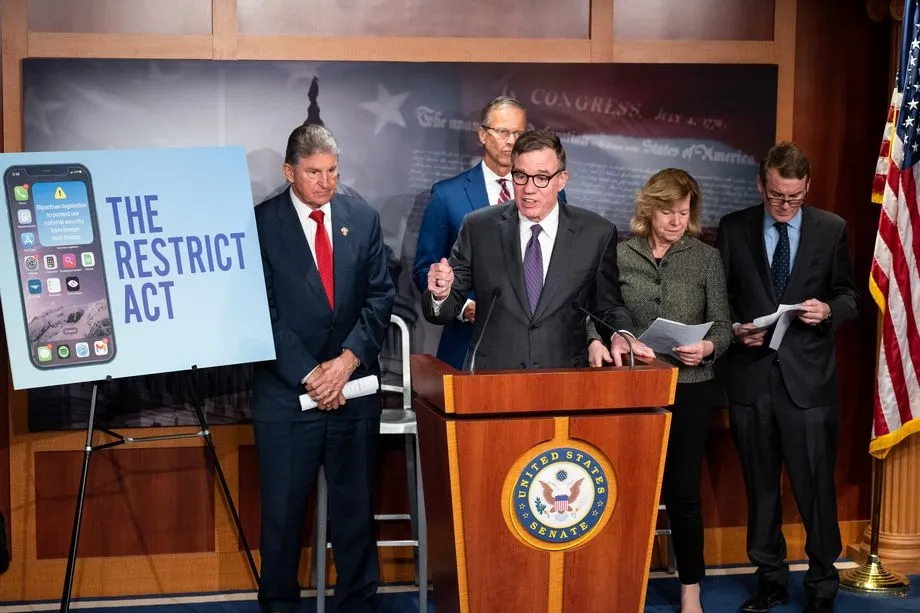
The newly proposed RESTRICT ACT - is being advertised as a TikTok Ban, but is much broader than that, carries a $1M Fine and up to 20 years in prison️! It is unconstitutional and would create massive legal restrictions on the open source movement and free speech throughout the internet.
The Bill was proposed by: Senator Warner, Senator Thune, Senator Baldwin, Senator Fischer, Senator Manchin, Senator Moran, Senator Bennet, Senator Sullivan, Senator Gillibrand, Senator Collins, Senator Heinrich, and Senator Romney. It has broad support across Senators of both parties.
Corrupt politicians will not protect us. They are part of the problem. We must build, support, and learn how to use censorship resistant tools in order to defend our natural rights.
The RESTRICT Act, introduced by Senators Warner and Thune, aims to block or disrupt transactions and financial holdings involving foreign adversaries that pose risks to national security. Although the primary targets of this legislation are companies like Tik-Tok, the language of the bill could potentially be used to block or disrupt cryptocurrency transactions and, in extreme cases, block Americans’ access to open source tools or protocols like Bitcoin.
The Act creates a redundant regime paralleling OFAC without clear justification, it significantly limits the ability for injured parties to challenge actions raising due process concerns, and unlike OFAC it lacks any carve-out for protected speech. COINCENTER ON THE RESTRICT ACT
If you found this post helpful support my work with bitcoin.

-
 @ 6c05c73e:c4356f17
2025-05-21 14:58:29
@ 6c05c73e:c4356f17
2025-05-21 14:58:29Investir não é coisa de rico, é coisa de gente esperta! 🚀
Mano, saca só: a real é que investir não é sobre ser rico ou ter uma grana absurda guardada. É sobre entender que o seu dinheiro pode trabalhar pra você enquanto você vive a sua vida.
A real da real: A maioria da galera só pensa em guardar o que sobra no fim do mês, né? Mas a parada é outra: o certo é separar uma parte pra investir assim que o dinheiro entra. Mesmo que seja pouquinho, tipo 50 conto por mês, o hábito é o que vai construir resultado.
E relaxa! Não precisa ser nada complicado nem arriscado. Tem investimento pra todo tipo de pessoa, desde os mais conservadores até os mais arrojados.
Por que começar agora?
O importante é dar o primeiro passo, começar o quanto antes. Quanto mais cedo você começar, mais o tempo vai jogar a seu favor. E o tempo, no fim das contas, é o que faz a mágica acontecer com os juros compostos. Paciência é a chave!
Mudando a mentalidade
Primeiro de tudo, vamos mudar a mentalidade! Esquece essa ideia de que investir é só pra quem entende tudo de economia ou pra quem já tem muita grana. É só uma forma de fazer o seu dinheiro trabalhar por você.
Como começar?
- Separe uma grana assim que receber: Ao invés de guardar o que sobra, já separa um valor assim que o dinheiro entra na conta. Pode ser pouco, tipo 50 reais, mas o importante é criar o hábito.
- Tenha objetivos claros: Quer criar uma reserva de emergência? Fazer aquela viagem dos sonhos? Pensar na aposentadoria? Ter objetivos claros vai te dar motivação pra investir.
- Escolha o tipo de investimento certo pra você: Tem investimento seguro pra quem tem medo e opção mais arriscada pra quem curte adrenalina. Pesquisa e vê qual se encaixa no seu perfil.
Cuidado com as furadas! 🚨
- Fuja de pirâmides: Promessas de dinheiro fácil? Desconfia!
- Não siga dica de qualquer blogueiro: Faça sua pesquisa e entenda onde você está colocando seu dinheiro.
- Tirar a grana da poupança: Deixar tudo parado na poupança achando que tá bem é deixar dinheiro na mesa.
A real sobre investir:
- Constância é mais importante que valor: É melhor investir um pouco todo mês do que muito de vez em quando.
- Investir é sobre disciplina, não sobre grana: Organização e planejamento são mais importantes do que ter muito dinheiro.
Então é isso, mano! Sem termos complicados, na moralzinha, pra galera sair daqui querendo pelo menos começar a investir. Lembre-se: seu único adversário é você mesmo. Bora fazer o dinheiro trabalhar pra gente! 😎
-
 @ dfa02707:41ca50e3
2025-05-21 14:38:33
@ dfa02707:41ca50e3
2025-05-21 14:38:33Contribute to keep No Bullshit Bitcoin news going.
- This release introduces Payjoin v2 functionality to Bitcoin wallets on Cake, along with several UI/UX improvements and bug fixes.
- The Payjoin v2 protocol enables asynchronous, serverless coordination between sender and receiver, removing the need to be online simultaneously or maintain a server. This simplifies privacy-focused transactions for regular users.
"I cannot speak highly enough of how amazing it has been to work with @bitgould and Jaad from the@payjoindevkit team, they're doing incredible work. None of this would be possible without them and their tireless efforts. PDK made it so much easier to ship Payjoin v2 than it would have been otherwise, and I can't wait to see other wallets jump in and give back to PDK as they implement it like we did," said Seth For Privacy, VP at Cake Wallet.
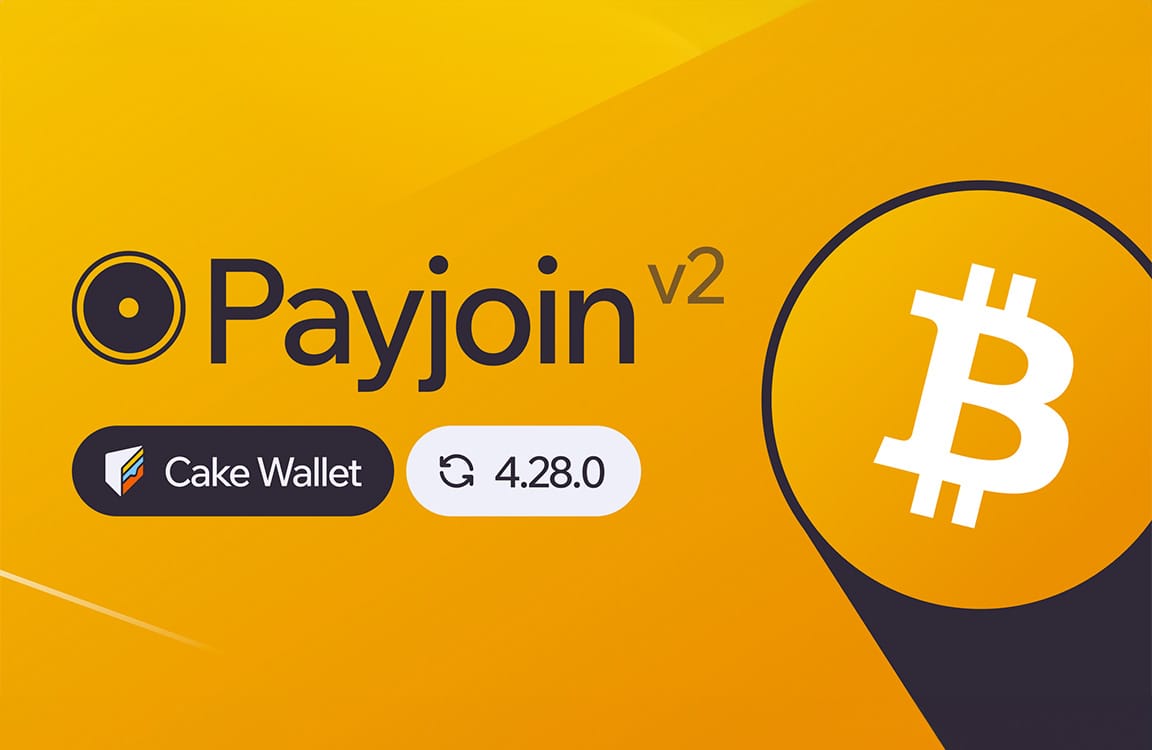
How to started with Payjoin in Cake Wallet:
- Open the app menu sidebar and click
Privacy. - Toggle the
Use Payjoinoption. - Now on your receive screen you'll see an option to copy a Payjoin URL

- Bull Bitcoin Wallet v0.4.0 introduced Payjoin v2 support in late December 2024. However, the current implementations are not interoperable at the moment, an issue that should be addressed in the next release of the Bull Bitcoin Wallet.
- Cake Wallet was one of the first wallets to introduce Silent Payments back in May 2024. However, users may encounter sync issues while using this feature at present, which will be resolved in the next release of Cake Wallet.
What's new
- Payjoin v2 implementation.
- Wallet group improvements: Enhanced management of multiple wallets.
- Various bug fixes: improving overall stability and user experience.
- Monero (XMR) enhancements.
Learn more about using, implementing, and understanding BIP 77: Payjoin Version 2 using the
payjoincrate in Payjoin Dev Kit here. -
 @ 0e9491aa:ef2adadf
2025-05-21 18:01:16
@ 0e9491aa:ef2adadf
2025-05-21 18:01:16
@matt_odell don't you even dare not ask about nostr!
— Kukks (Andrew Camilleri) (@MrKukks) May 18, 2021
Nostr first hit my radar spring 2021: created by fellow bitcoiner and friend, fiatjaf, and released to the world as free open source software. I was fortunate to be able to host a conversation with him on Citadel Dispatch in those early days, capturing that moment in history forever. Since then, the protocol has seen explosive viral organic growth as individuals around the world have contributed their time and energy to build out the protocol and the surrounding ecosystem due to the clear need for better communication tools.
nostr is to twitter as bitcoin is to paypal
As an intro to nostr, let us start with a metaphor:
twitter is paypal - a centralized platform plagued by censorship but has the benefit of established network effects
nostr is bitcoin - an open protocol that is censorship resistant and robust but requires an organic adoption phase
Nostr is an open communication protocol that can be used to send messages across a distributed set of relays in a censorship resistant and robust way.
- Anyone can run a relay.
- Anyone can interact with the protocol.
- Relays can choose which messages they want to relay.
- Users are identified by a simple public private key pair that they can generate themselves.Nostr is often compared to twitter since there are nostr clients that emulate twitter functionality and user interface but that is merely one application of the protocol. Nostr is so much more than a mere twitter competitor. Nostr clients and relays can transmit a wide variety of data and clients can choose how to display that information to users. The result is a revolution in communication with implications that are difficult for any of us to truly comprehend.
Similar to bitcoin, nostr is an open and permissionless protocol. No person, company, or government controls it. Anyone can iterate and build on top of nostr without permission. Together, bitcoin and nostr are incredibly complementary freedom tech tools: censorship resistant, permissionless, robust, and interoperable - money and speech protected by code and incentives, not laws.
As censorship throughout the world continues to escalate, freedom tech provides hope for individuals around the world who refuse to accept the status quo. This movement will succeed on the shoulders of those who choose to stand up and contribute. We will build our own path. A brighter path.
My Nostr Public Key: npub1qny3tkh0acurzla8x3zy4nhrjz5zd8l9sy9jys09umwng00manysew95gx
If you found this post helpful support my work with bitcoin.

-
 @ e39333da:7c66e53a
2025-05-21 14:26:08
@ e39333da:7c66e53a
2025-05-21 14:26:08::youtube{#prPOncMkV6c}
Tara Gaming has announced The Age of Bhaarat, a dark fantasy action RPG, with a cinematic and gameplay trailer, showcasing what seems like early footage of the game. The game will release on PC via Steam.
-
 @ 0e9491aa:ef2adadf
2025-05-21 18:01:16
@ 0e9491aa:ef2adadf
2025-05-21 18:01:16

"Privacy is necessary for an open society in the electronic age. Privacy is not secrecy. A private matter is something one doesn't want the whole world to know, but a secret matter is something one doesn't want anybody to know. Privacy is the power to selectively reveal oneself to the world." - Eric Hughes, A Cypherpunk's Manifesto, 1993
Privacy is essential to freedom. Without privacy, individuals are unable to make choices free from surveillance and control. Lack of privacy leads to loss of autonomy. When individuals are constantly monitored it limits our ability to express ourselves and take risks. Any decisions we make can result in negative repercussions from those who surveil us. Without the freedom to make choices, individuals cannot truly be free.
Freedom is essential to acquiring and preserving wealth. When individuals are not free to make choices, restrictions and limitations prevent us from economic opportunities. If we are somehow able to acquire wealth in such an environment, lack of freedom can result in direct asset seizure by governments or other malicious entities. At scale, when freedom is compromised, it leads to widespread economic stagnation and poverty. Protecting freedom is essential to economic prosperity.
The connection between privacy, freedom, and wealth is critical. Without privacy, individuals lose the freedom to make choices free from surveillance and control. While lack of freedom prevents individuals from pursuing economic opportunities and makes wealth preservation nearly impossible. No Privacy? No Freedom. No Freedom? No Wealth.
Rights are not granted. They are taken and defended. Rights are often misunderstood as permission to do something by those holding power. However, if someone can give you something, they can inherently take it from you at will. People throughout history have necessarily fought for basic rights, including privacy and freedom. These rights were not given by those in power, but rather demanded and won through struggle. Even after these rights are won, they must be continually defended to ensure that they are not taken away. Rights are not granted - they are earned through struggle and defended through sacrifice.
If you found this post helpful support my work with bitcoin.

-
 @ eb0157af:77ab6c55
2025-05-21 13:53:05
@ eb0157af:77ab6c55
2025-05-21 13:53:05Bitcoin adoption will come through businesses: neither governments nor banks will lead the revolution.
In recent years, it’s undeniable that Bitcoin has ceased to be just a radical idea born from the minds of cypherpunks. It is now recognized across the board as a global asset, discussed in the upper echelons of finance, accepted even on Wall Street, purchased by banking groups and included as a “strategic reserve” by some nations.
However, the general perception that hovers today regarding Bitcoin’s diffusion is still that of minimal adoption, almost insignificant. Bitcoin exists, certainly, but in fact it is not being used. It is rarely possible to pay in satoshis in commercial establishments. Demand is still extremely low.
Furthermore, the debate on Bitcoin is still practically absent: excluding some local events, some niche media outlets or some timid discussion, today Bitcoin is in fact excluded from general interest. The level of understanding and knowledge of the phenomenon is certainly still very low.
Yet, Bitcoin represents an unprecedented technological improvement, capable of solving many problems inherent in the fiat system in which we live. What could facilitate its diffusion?
Bitcoin becomes familiar when businesses adopt it
When talking about Bitcoin adoption, many look to States. They imagine governments that legislate or accumulate Bitcoin as a “strategic reserve,” or banks perceived as forward-thinking that would lead technological change, opening up to innovation. But the reality is different: bureaucracy, political constraints, and fear of losing control inherently prevent States and central banks from being pioneers.
What really drives Bitcoin adoption are not States, but businesses. It is the forward-looking entrepreneurs, innovative startups and – eventually – even large multinational companies that decide to integrate Bitcoin into their operating systems that drive adoption. Indeed, the business world has always played a key role in the adoption of new technologies. This was the case, for example, with the internet, e-commerce, mobile telephony, and the cloud. It will also be the case with Bitcoin.
Unlike a State, when a company adopts Bitcoin, it does so for concrete reasons: efficiency, savings, protection, access to new markets, independence from traditional banking circuits, or bureaucratic streamlining. It is a rational choice, not an ideological one, dictated by the intent to improve one’s competitiveness against the competition to survive in the market.
What is currently missing to facilitate adoption is, in all likelihood, a significant number of businesses that have decided to integrate Bitcoin into their company systems.
Bitcoin becomes “normal” when it is integrated into the operational flow of businesses. Holding and framing bitcoin on the balance sheet, paying an invoice, paying salaries to employees in satoshis, making value transfers globally thanks to the blockchain, allowing customers to pay via Lightning Network… when all this becomes possible with the same simplicity with which we use the euro or the dollar, Bitcoin stops being alternative and becomes the standard.
Businesses are not just users. They are adoption multipliers. When a company chooses Bitcoin, it is automatically proposing it to customers, employees, suppliers, and institutional stakeholders. Each business adoption equals tens, hundreds, or thousands of new eyes on Bitcoin.
People, after all, trust what they see every day: if your trusted restaurant accepts bitcoin, or if your favorite e-commerce platform uses it to receive international payments, or if your colleague receives it as a salary, then Bitcoin no longer appears to be a mysterious object. It finally begins to be perceived as a real, useful, and functioning tool.
The integration of a technology in companies helps make it understandable, accessible, and legitimate in the eyes of the public. This is how distrust is overcome: by making Bitcoin visible in daily life.
Bitcoin and businesses today
A River Financial report estimates that as of May 2025, only 5% of bitcoin is currently owned by private businesses. A still very small number.

According to research by River, in May 2025 businesses hold just over a million btc (about 5% of available monetary units). More than two-thirds of bitcoin (68.2%) are in the hands of private individuals.
To promote Bitcoin adoption, it is necessary today to support businesses in integrating this standard, leveraging all its enormous opportunities. Among others, this technology allows for fast, economical, and global payments. It eliminates intermediaries, increases transparency and security in value transfers. It removes bureaucratic frictions and allows opening up to a new global market.
Every sector can benefit from Bitcoin: e-commerce, tourism, industry, restaurants, professional services, or any other business. Bitcoin revolutionizes the concept of money, and money is a transversal working tool.
We are still at the beginning, but several signals are encouraging. According to a study by Bitwise and reported by Atlas21, in the first quarter of 2025, a growing number of US companies (+16.11% compared to the previous one) are including Bitcoin in their balance sheets, not just as a financial bet, but as a long-term strategy to protect their assets and access a decentralized monetary system to transfer value worldwide without resorting to financial intermediaries.
Who is driving the change?
Echoing the words of Roy Sheinfeld, CEO of Breez, the true potential of Bitcoin will be unleashed first and foremost from the work of developers, the true architects in designing and refining tools that are increasingly simple and intuitive to use for anyone, regardless of level of expertise. It is the developers – Roy rightly argued – who will enable us to “conquer the world.”
But probably that’s not enough: the next step is to make Bitcoin a globally accepted technological standard, changing its perception towards the general public. And this is where businesses come into play.
Guided by the market, technological innovation, and the desire to meet user demands, entrepreneurs today represent the fulcrum to accelerate the monetary transition from the current fiat system towards the Bitcoin standard. It is entrepreneurs who transform innovations from opportunities for a few to a reality shared by many.
The adoption of Bitcoin will therefore not arise from a sudden event, nor from the exclusive fruit of enthusiasts’ enthusiasm or from arbitrary political choices decreed by States or regulators.
The future of Bitcoin is built in the places where value is created every day: in companies, in their systems, and in their strategic decisions.
“If we conquer developers, we conquer the world. If we conquer businesses, we conquer adoption.”
The post The key to Bitcoin adoption is businesses appeared first on Atlas21.
-
 @ 9c3a0089:c6f201fb
2025-05-21 13:51:11
@ 9c3a0089:c6f201fb
2025-05-21 13:51:11What allows one person to engage in cruel acts more easily than another?
What allows one person to engage in any activity more easily than another?
Inclination vs. Aversion.
To what extent are inclinations and aversions an expression of an individuals biology/genetics vs. social conditioning?
If inclination toward cruelty is a result of social conditioning why is it present so consistently across time and location? Why do attempts to condition people away from cruelty and toward kindness ultimately fail when stress tested by simple opportunity?
Humans have a fairly consistent history of cruelty with comically varied excuses for the behavior which are sometimes near opposites. I suspect the details of circumstance and varying excuses are not the cause of cruelty.
Biology/genetics seems to be the answer but as with all traits there must be outliers. It seems inclination toward cruelty is the norm with aversion rarer and aversion along with the courage to stand against cruel acts very rare.
I fear we have been telling false tales of why we engage in cruelty on both small and large scale because the truth is unpleasant. Particularity when outliers with a strong aversion to cruelty see cruel acts and must tell themselves a story that accounts for how a human like themselves could do such things so easily(not realizing they are an outlier) leading to all kinds of creativity in both Religious Myth and fiction.
I think for 1000s of years we have placed blame on evil supernatural forces, gods, demons, devils etc. And more recently on religion, mind virus, mass psychosis, bad leaders or an evil few among the otherwise good majority etc.
I fear the truth is simply that the reason people throughout history so easily engage in cruel acts when the opportunity arises is because the large majority of humans are inclined to do so and are fairly comfortable with inflicting suffering on others. Particularly when they feel safe from consequence and they perceive that doing so strengthens their social standing or that not doing so would weaken it(survival for a social creature).
Unfortunately this makes good sense from a survival standpoint. And fortunately or unfortunately the rule of law and threat of consequence keeps this inclination hidden allowing any society to always believe maybe they and the people around them are the good guys when in truth it is fear that keeps them in check until it doesn’t time and time again.
Do we choose to go forward like this?
Will the meek ever inherit the Earth? Do we need to give it to them?
-
 @ e97aaffa:2ebd765d
2025-05-21 13:16:45
@ e97aaffa:2ebd765d
2025-05-21 13:16:45- Índole ou característica de quem é austero;
- Rigor ou rigidez; designação de severidade;
- Inexistência de adornos ou adereços;
- (Economia) Moderação do que é gasto;
- (Economia) Política do governo que tem como finalidade reduzir os gastos públicos.
(Etm. do latim: austeritāte)
Antes da crise da dívida soberana, raramente os portugueses ouviam, ou realmente sabiam o significado da palavra. Depois da crise, para os portugueses essa palavra representa muito mais que apenas 11 caracteres, é uma cicatriz para muitas gerações, foi traumatizante.
Na época, o limite da yield da dívida soberana a 10 anos era os 7%, assim que superou, o governo teve que pedir assistência financeira ao FMI. A partir desse momento, a palavra Austeridade nunca mais saiu do léxico dos português.
A crise não foi apenas em Portugal, afetou também Irlanda, Grécia e Espanha, ficaram conhecidos como PIGS.
Se essa crise da dívida soberana demonstrou a fragilidade da UE, estamos a falar de pequenas/médias economias, o que acontecerá se isto se repetir mas nas grandes economias?
Hoje em dia, a yield portuguesa (3.1%) é melhor que a maioria das grandes potências econômicas, a ironia do destino.
- Reino Unido: 4.7%
- EUA: 4.5%
- Austrália: 4.5%
- Itália: 3.6%
- França: 3.3%

-
 @ 0e9491aa:ef2adadf
2025-05-21 18:01:15
@ 0e9491aa:ef2adadf
2025-05-21 18:01:15
Bank run on every crypto bank then bank run on every "real" bank.
— ODELL (@ODELL) December 14, 2022
Good morning.
It looks like PacWest will fail today. It will be both the fifth largest bank failure in US history and the sixth major bank to fail this year. It will likely get purchased by one of the big four banks in a government orchestrated sale.
March 8th - Silvergate Bank
March 10th - Silicon Valley Bank
March 12th - Signature Bank
March 19th - Credit Suisse
May 1st - First Republic Bank
May 4th - PacWest Bank?PacWest is the first of many small regional banks that will go under this year. Most will get bought by the big four in gov orchestrated sales. This has been the playbook since 2008. Follow the incentives. Massive consolidation across the banking industry. PacWest gonna be a drop in the bucket compared to what comes next.
First, a hastened government led bank consolidation, then a public/private partnership with the remaining large banks to launch a surveilled and controlled digital currency network. We will be told it is more convenient. We will be told it is safer. We will be told it will prevent future bank runs. All of that is marketing bullshit. The goal is greater control of money. The ability to choose how we spend it and how we save it. If you control the money - you control the people that use it.
If you found this post helpful support my work with bitcoin.

-
 @ 8aa70f44:3073d1a6
2025-05-21 13:07:14
@ 8aa70f44:3073d1a6
2025-05-21 13:07:14Earlier this year I launched the asknostr.site project which has been a great journey and learning experience. I had wanted to write down my goals and ideas with the project but didn't get to it yet. Primal launching the article editor was a trigger for me to go for it.
Ever since I joined Nostr i was looking for ways to apply my skillset solve a problem and help with adoption. Around Christmas I figured that a Quora/Stackoverflow alternative is something that needs to exist on Nostr.
Before I knew it I had a pretty decent prototype. And because the network already had so much awesome content, contributors and authors I was never discouraged by the challenge that kills so many good ideas -> "Where do I get the first users?".
Since the initial announcement I have received so much encouragement through zaps, likes, DM's, and maybe most of all seeing the increase in usage of the site and #asknostr content kept me going.
Current State
The current version of the site is stable and most bugs are hashed out. After logging in (remote signer, extension or nsec) you can engage with content through votes, comments and replies. Or simply ask a new question.
All content is stored in the site's own private relay and preprocessed/computed into a single data store (postgres) so the site is fast, accessible and crawl-able.
The site supports browsing hashtags, voting/commenting on answers, asking new questions and every contributor get their own profile (example). At the time of writing the site has 41k questions, almost 200k replies/comments and upwards of 5 million sats purely for #asknostr content.
What to expect/On my list
There are plenty of things and UI bugs that need love and between writing the draft of this post and hitting publish I shipped 3 minor bug fixes. Little by little, bit by bit...
In addition to all those small details here is an overview of the things on my own wish list:
-
Inline Zaps: Ability to zap from the asknostr.site interface. Click the zap button, specify or pick the number of sats zap away.
-
Contributor Rank: A leaderboard to add some gamification. More recognition to those nostriches that spend their time helping other people out
-
Search by Keyword: Search all content by keywords. Experiment with the index to show related questions or answers
-
Better User Profiles: Improve the user profile so it shows all the profile questions and answers. Quick buttons to follow or zap that person. Better insights in the topics (hashtags) the profile contributes to
-
Bookmarks: Ability to bookmark questions and answers. Increase bookmark weight as a signal to rank answers.
-
Smarter Scoring: Tune how answers are scored (winning answer formula). Perhaps give more weight to the question author or use WoT. Not sure yet.
All of this is happening at some point so follow me if you want to stay up to date.
Goals
To manage expectations and keep me focussed I write down the mid and long term goals of the project.
Long term
Call me cheesy but I believe that humanity will flourish through an open web and sound money. My own journey started from with bitcoin but if you asked me today if it's BTC or nostr that is going to have the most impact I wouldn't know what to answer. Chicken or egg?
The goal of the project is to offer an open platform that empowers individuals to ask questions, share expertise and access high-quality information across different topics. The project empowers anyone to monetize their experience creating a sustainable ecosystem that values and rewards knowledge sharing. This will ultimately democratize access to knowledge for all.
Mid term
The project can help a lot with onboarding new users onto the network. Once we start to rank on certain topics we can get a piece of the search traffic pie (StackOverflows 12 million, and Quora 150 million visitors per month) which is a great way to expose people to the power of the network.
First time visitors do not need to know about nostr or zaps to receive value. They can browse around, discover interesting content and perhaps even create a profile without even knowing they are on Nostr now.
Gradually those users will understand the value of the network through better rankings (zaps beats likes), a cross-client experience and a profile that can be used on any nostr site or app.
In order for the site to do that we need to make sure content is browsable by language, (sub)topics and and we double down on 'the human touch' with real contributors and not LLMs.
Short Term Goal
The first goal is to make the site really good and an important resource for existing Nostr users. Enable visitors to search and discover what they are interested in. Integrate within the existing nostr eco system with 'open in' functionality and quick links to interesting projects (followerpacks?)
One of things i want to get right is to improve user retention by making the whole Q\&A experience more sticky. I want to run some experiments (bots, award, summaries) to get more people to use asknostr.site more often and come back.
What about the name?
Finally the big question: What about the asknostr.site name? I don't like the name that much but it's what people know. I think there is a high chance that people will discover Nostr apps like Olas, Primal or Damus without needing to know what NOSTR is or means.
Therefore I think there is a good chance that the project won't be called asknostr.site forever. I guess it all depends on where we all take this.
Onwards!
-
-
 @ 0e9491aa:ef2adadf
2025-05-21 18:01:15
@ 0e9491aa:ef2adadf
2025-05-21 18:01:15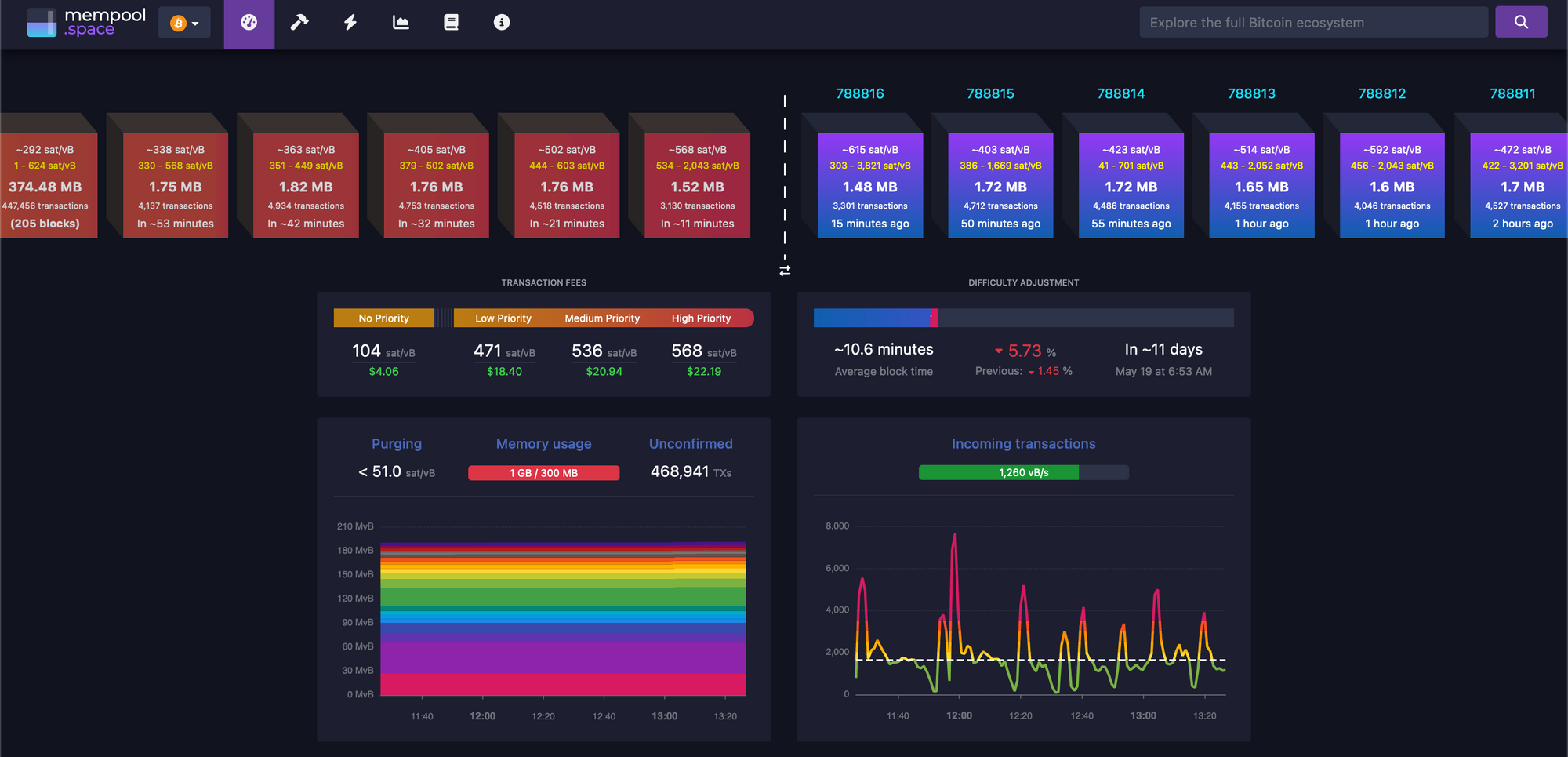
There must be a limit to how much data is transferred across the bitcoin network in order to keep the ability to run and use your own node accessible. A node is required to interact with the global bitcoin network - if you do not use your own node then you must trust someone else's node. If nodes become inaccessible to run then the network will centralize around the remaining entities that operate them - threatening the censorship resistance at the core of bitcoin's value prop. The bitcoin protocol uses three main mechanisms to keep node operation costs low - a fixed limit on the amount of data in each block, an automatic difficulty adjustment that regulates how many blocks are produced based on current mining hash rate, and a robust dynamic transaction fee market.
Bitcoin transaction fees limit network abuse by making usage expensive. There is a cost to every transaction, set by a dynamic free market based on demand for scarce block space. It is an incredibly robust way to prevent spam without relying on centralized entities that can be corrupted or pressured.
After the 2017 bitcoin fee spike we had six years of relative quiet to build tools that would be robust in a sustained high fee market. Fortunately our tools are significantly better now but many still need improvement. Most of the pain points we see today will be mitigated.
The reality is we were never going to be fully prepared - pressure is needed to show the pain points and provide strong incentives to mitigate them.
It will be incredibly interesting to watch how projects adapt under pressure. Optimistic we see great innovation here.
_If you are willing to wait for your transaction to confirm you can pay significantly lower fees. Learn best practices for reducing your fee burden here.
My guide for running and using your own bitcoin node can be found here._
If you found this post helpful support my work with bitcoin.

-
 @ 0e9491aa:ef2adadf
2025-05-21 18:01:15
@ 0e9491aa:ef2adadf
2025-05-21 18:01:15
I often hear "bitcoin doesn't interest me, I'm not a finance person."
Ironically, the beauty of sound money is you don't have to be. In the current system you're expected to manage a diversified investment portfolio or pay someone to do it. Bitcoin will make that optional.
— ODELL (@ODELL) September 16, 2018
At first glance bitcoin often appears overwhelming to newcomers. It is incredibly easy to get bogged down in the details of how it works or different ways to use it. Enthusiasts, such as myself, often enjoy going down the deep rabbit hole of the potential of bitcoin, possible pitfalls and theoretical scenarios, power user techniques, and the developer ecosystem. If your first touch point with bitcoin is that type of content then it is only natural to be overwhelmed. While it is important that we have a thriving community of bitcoiners dedicated to these complicated tasks - the true beauty of bitcoin lies in its simplicity. Bitcoin is simply better money. It is the best money we have ever had.
Life is complicated. Life is hard. Life is full of responsibility and surprises. Bitcoin allows us to focus on our lives while relying on a money that is simple. A money that is not controlled by any individual, company, or government. A money that cannot be easily seized or blocked. A money that cannot be devalued at will by a handful of corrupt bureaucrat who live hundreds of miles from us. A money that can be easily saved and should increase in purchasing power over time without having to learn how to "build a diversified stock portfolio" or hire someone to do it for us.
Bitcoin enables all of us to focus on our lives - our friends and family - doing what we love with the short time we have on this earth. Time is scarce. Life is complicated. Bitcoin is the most simple aspect of our complicated lives. If we spend our scarce time working then we should be able to easily save that accrued value for future generations without watching the news or understanding complicated financial markets. Bitcoin makes this possible for anyone.
Yesterday was Mother's Day. Raising a human is complicated. It is hard, it requires immense personal responsibility, it requires critical thinking, but mothers figure it out, because it is worth it. Using and saving bitcoin is simple - simply install an app on your phone. Every mother can do it. Every person can do it.
Life is complicated. Life is beautiful. Bitcoin is simple.
If you found this post helpful support my work with bitcoin.

-
 @ cae03c48:2a7d6671
2025-05-21 13:00:00
@ cae03c48:2a7d6671
2025-05-21 13:00:00Bitcoin Magazine

$10.4B Bitcoin Firm Unchained Announces First Regulated Bitcoin-Native Trust CompanyToday, the State of Wyoming has officially chartered Gannett Trust Company, the first bitcoin-native trust company in the United States, according to a press release sent to Bitcoin Magazine. Backed by Unchained, a leader in bitcoin financial services, Gannett Trust is purpose-built to serve individuals, family offices, and businesses integrating bitcoin into estate and inheritance plans, investment portfolios, trusts, and treasury strategies.
The launch of Gannett Trust directly addresses a growing need for secure, compliant, bitcoin-native solutions for long-term wealth management. Estimates say around 3.7 million bitcoin may be lost forever, largely due to poor planning and the absence of trusted custodial tools. Gannett Trust seeks to prevent future loss by offering a suite of fiduciary services tailored to the unique needs of bitcoin holders. Gannett Trust will offer both qualified custody and non-custodial configurations, enabling clients to manage, protect, and transfer their bitcoin with confidence. Gannett Trust advances Unchained’s long-term vision of building a durable foundation for multigenerational Bitcoin wealth.
“Bitcoin is becoming a pillar of long-term wealth,” said CEO of Unchained Joe Kelly. “With Gannett Trust, we’re combining the regulatory clarity of a trust company with the proven security of Unchained’s collaborative custody – a major step forward for bitcoin as a generational asset that holders have been waiting for.”
Prioritizing sovereignty, control, compliance, Gannett Trust aims to equip families and businesses with clear, tax-optimized strategies tailored to every aspect of bitcoin-based planning and wealth management.
“Most trust companies don’t understand bitcoin, and most crypto custodians don’t offer true fiduciary services,” said CEO of Gannett Trust Joshua Preston. “Gannett Trust bridges the gap – giving existing bitcoin holders and those interested in allocating bitcoin a path to protect and grow their legacy.”
With the launch of Gannett Trust, Unchained adds another layer to its bitcoin-native infrastructure, contributing to the development of institutional tools designed to support the long-term custody and management of bitcoin wealth.
For more information about Gannett Trust, visit here.
This post $10.4B Bitcoin Firm Unchained Announces First Regulated Bitcoin-Native Trust Company first appeared on Bitcoin Magazine and is written by Oscar Zarraga Perez.
-
 @ 0e9491aa:ef2adadf
2025-05-21 18:01:15
@ 0e9491aa:ef2adadf
2025-05-21 18:01:15Will not live in a pod.
Will not eat the bugs.
Will not get the chip.
Will not get a blue check.
Will not use CBDCs.Live Free or Die.
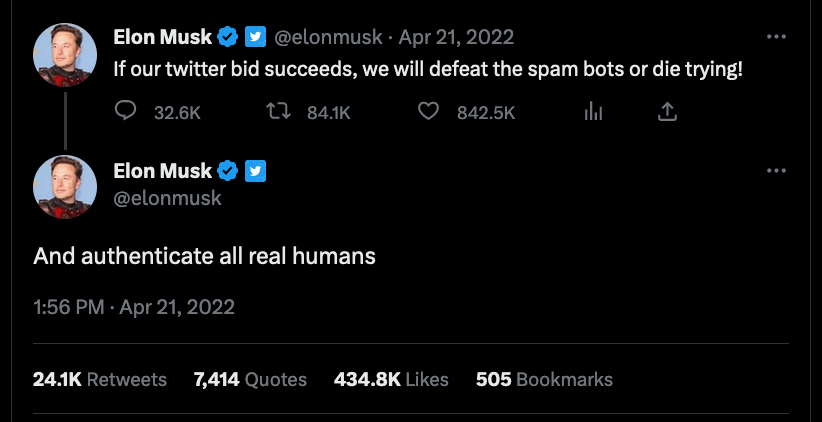
Why did Elon buy twitter for $44 Billion? What value does he see in it besides the greater influence that undoubtedly comes with controlling one of the largest social platforms in the world? We do not need to speculate - he made his intentions incredibly clear in his first meeting with twitter employees after his takeover - WeChat of the West.
To those that do not appreciate freedom, the value prop is clear - WeChat is incredibly powerful and successful in China.
To those that do appreciate freedom, the concern is clear - WeChat has essentially become required to live in China, has surveillance and censorship integrated at its core, and if you are banned from the app your entire livelihood is at risk. Employment, housing, payments, travel, communication, and more become extremely difficult if WeChat censors determine you have acted out of line.
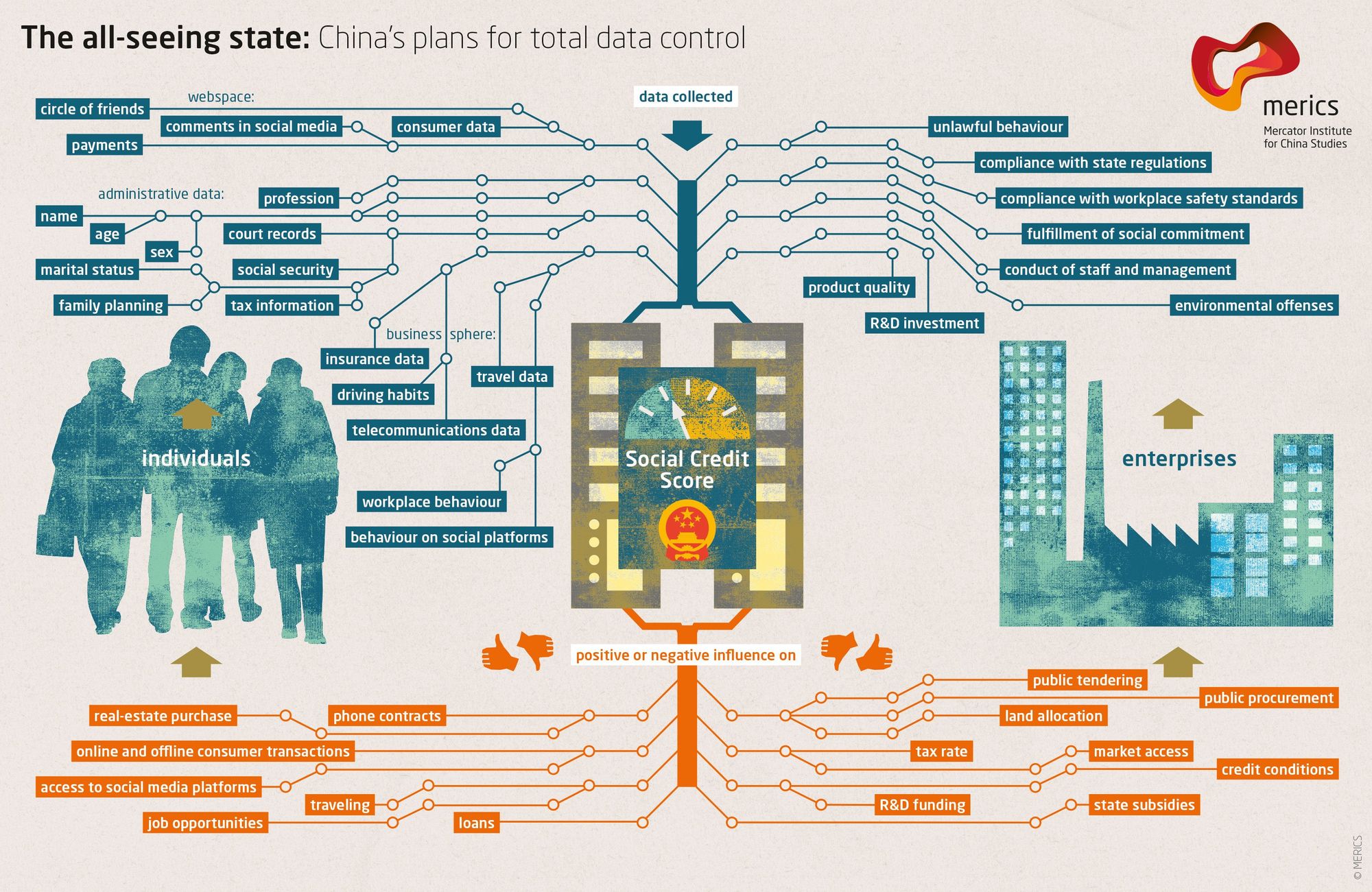
The blue check is the first step in Elon's plan to bring the chinese social credit score system to the west. Users who verify their identity are rewarded with more reach and better tools than those that do not. Verified users are the main product of Elon's twitter - an extensive database of individuals and complete control of the tools he will slowly get them to rely on - it is easier to monetize cattle than free men.
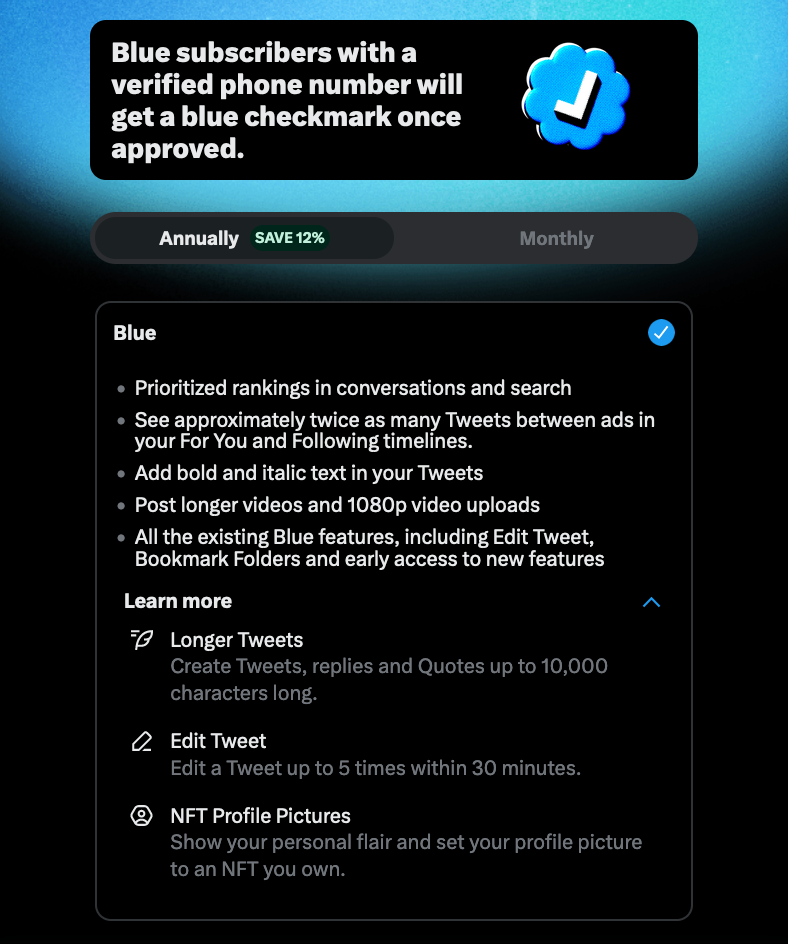
If you cannot resist the temptation of the blue check in its current form you have already lost - what comes next will be much darker. If you realize the need to resist - freedom tech provides us options.
If you found this post helpful support my work with bitcoin.

-
 @ 0e9491aa:ef2adadf
2025-05-21 18:01:14
@ 0e9491aa:ef2adadf
2025-05-21 18:01:14
Nostr is an open communication protocol that can be used to send messages across a distributed set of relays in a censorship resistant and robust way.
If you missed my nostr introduction post you can find it here. My nostr account can be found here.
We are nearly at the point that if something interesting is posted on a centralized social platform it will usually be posted by someone to nostr.
We are nearly at the point that if something interesting is posted exclusively to nostr it is cross posted by someone to various centralized social platforms.
We are nearly at the point that you can recommend a cross platform app that users can install and easily onboard without additional guides or resources.
As companies continue to build walls around their centralized platforms nostr posts will be the easiest to cross reference and verify - as companies continue to censor their users nostr is the best censorship resistant alternative - gradually then suddenly nostr will become the standard. 🫡
Current Nostr Stats
If you found this post helpful support my work with bitcoin.

-
 @ eb0157af:77ab6c55
2025-05-21 12:43:37
@ eb0157af:77ab6c55
2025-05-21 12:43:37The exchange reveals the extent of the breach that occurred last December as federal authorities investigate the recent data leak.
Coinbase has disclosed that the personal data of 69,461 users was compromised during the breach in December 2024, according to documentation filed with the Maine Attorney General’s Office.
The disclosure comes after Coinbase announced last week that a group of hackers had demanded a $20 million ransom, threatening to publish the stolen data on the dark web. The attackers allegedly bribed overseas customer service agents to extract information from the company’s systems.
Coinbase had previously stated that the breach affected less than 1% of its user base, compromising KYC (Know Your Customer) data such as names, addresses, and email addresses. In a filing with the U.S. Securities and Exchange Commission (SEC), the company clarified that passwords, private keys, and user funds were not affected.
Following the reports, the SEC has reportedly opened an official investigation to verify whether Coinbase may have inflated user metrics ahead of its 2021 IPO. Separately, the Department of Justice is investigating the breach at Coinbase’s request, according to CEO Brian Armstrong.
Meanwhile, Coinbase has faced criticism for its delayed response to the data breach. Michael Arrington, founder of TechCrunch, stated that the stolen data could cause irreparable harm. In a post on X, Arrington wrote:
“The human cost, denominated in misery, is much larger than the $400m or so they think it will actually cost the company to reimburse people. The consequences to companies who do not adequately protect their customer information should include, without limitation, prison time for executives.”
Coinbase estimates the incident could cost between $180 million and $400 million in remediation expenses and customer reimbursements.
Arrington also condemned KYC laws as ineffective and dangerous, calling on both regulators and companies to better protect user data:
“Combining these KYC laws with corporate profit maximization and lax laws on penalties for hacks like these means these issues will continue to happen. Both governments and corporations need to step up to stop this. As I said, the cost can only be measured in human suffering.”
The post Coinbase: 69,461 users affected by December 2024 data breach appeared first on Atlas21.
-
 @ 9223d2fa:b57e3de7
2025-05-21 12:16:33
@ 9223d2fa:b57e3de7
2025-05-21 12:16:334,065 steps
-
 @ 2e8970de:63345c7a
2025-05-21 12:06:12
@ 2e8970de:63345c7a
2025-05-21 12:06:12https://x.com/Google/status/1924893837295546851
compare it to Will Smith eating Spaghetti from 2 years ago:
The end of objective truth from video evidence is nearing. In a sense we are retvrning to 1999.
https://stacker.news/items/985441
-
 @ 0e9491aa:ef2adadf
2025-05-21 18:01:14
@ 0e9491aa:ef2adadf
2025-05-21 18:01:14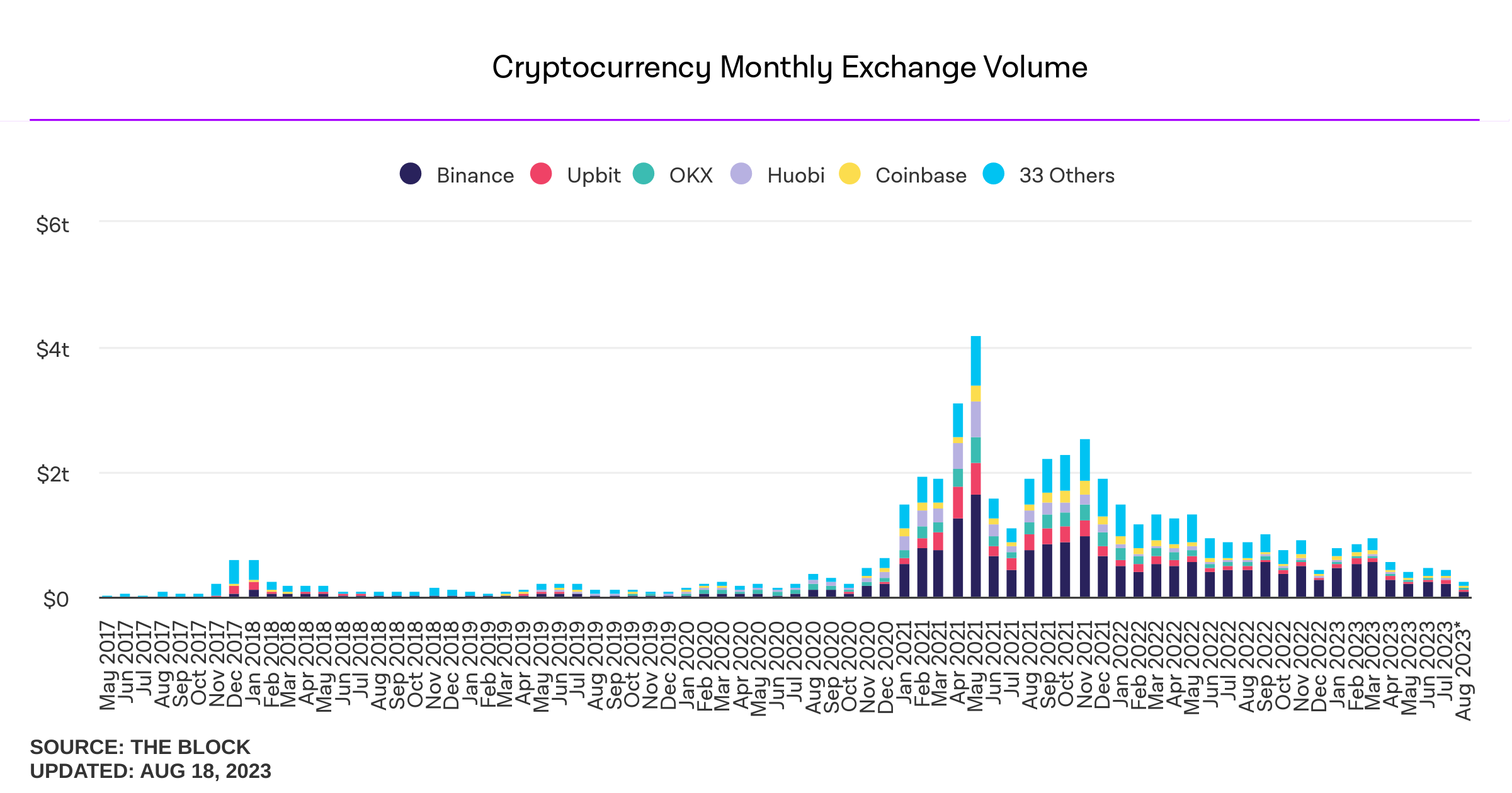
Influencers would have you believe there is an ongoing binance bank run but bitcoin wallet data says otherwise.
- binance wallets are near all time highs
- bitfinex wallets are also trending up
- gemini and coinbase are being hit with massive withdrawals thoughYou should not trust custodians, they can rug you without warning. It is incredibly important you learn how to hold bitcoin yourself, but also consider not blindly trusting influencers with a ref link to shill you.
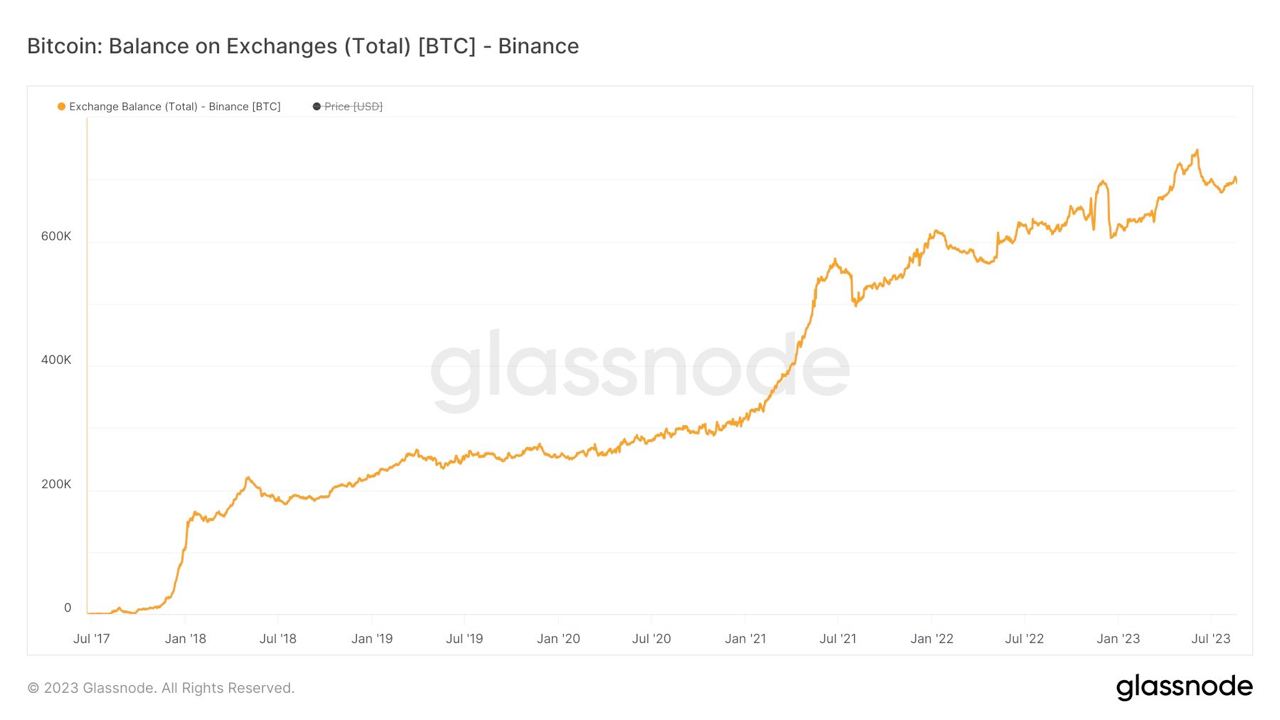
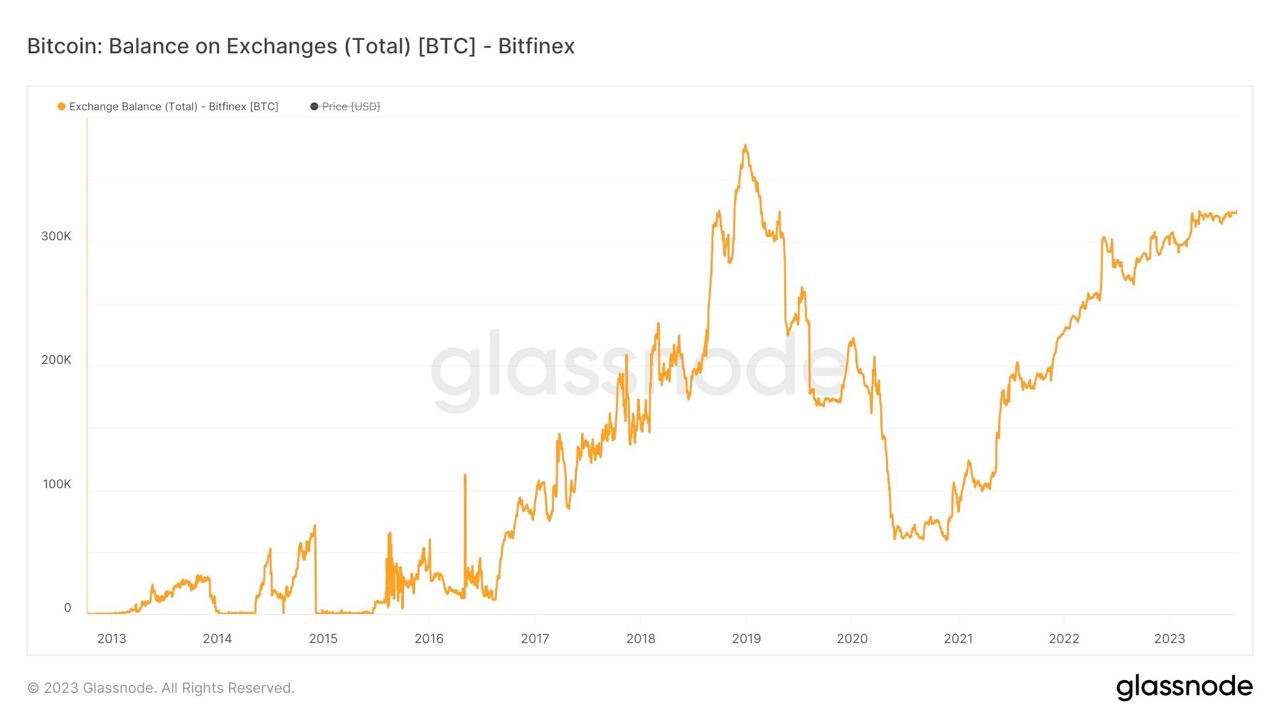
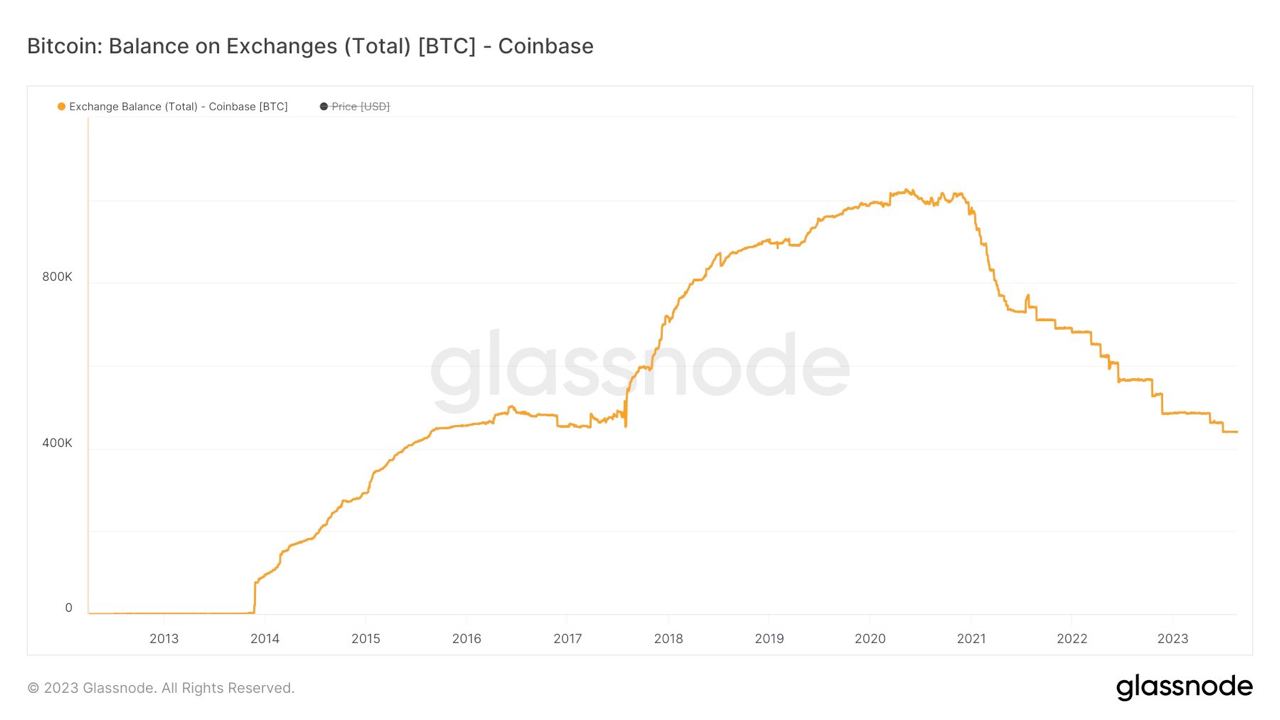
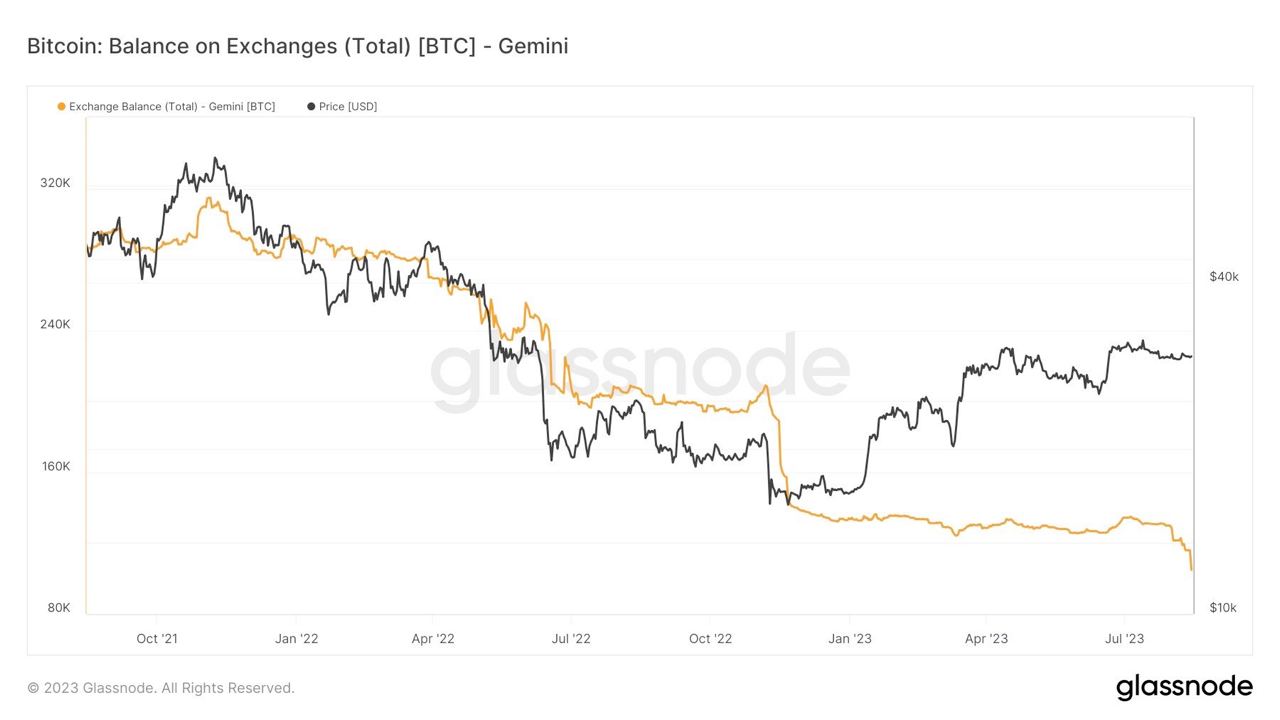
If you found this post helpful support my work with bitcoin.

-
 @ ecda4328:1278f072
2025-05-21 11:44:17
@ ecda4328:1278f072
2025-05-21 11:44:17An honest response to objections — and an answer to the most important question: why does any of this matter?
Last updated: May 21, 2025\ \ 📄 Document version:\ EN: https://drive.proton.me/urls/A4A8Y8A0RR#Sj2OBsBYJFr1\ RU: https://drive.proton.me/urls/GS9AS1NB30#ZdKKb5ackB5e
\ Statement: Deflation is not the enemy, but a natural state in an age of technological progress.\ Criticism: in real macroeconomics, long-term deflation is linked to depressions.\ Deflation discourages borrowers and investors, and makes debt heavier.\ Natural ≠ Safe.
1. “Deflation → Depression, Debt → Heavier”
This is true in a debt-based system. Yes, in a fiat economy, debt balloons to the sky, and without inflation it collapses.
But Bitcoin offers not “deflation for its own sake,” but an environment where you don’t need to be in debt to survive. Where savings don’t melt away.\ Jeff Booth said it clearly:
“Technology is inherently deflationary. Fighting deflation with the printing press is fighting progress.”
You don’t have to take on credit to live in this system. Which means — deflation is not an enemy, but an ally.
💡 People often confuse two concepts:
-
That deflation doesn’t work in an economy built on credit and leverage — that’s true.
-
That deflation itself is bad — that’s a myth.
📉 In reality, deflation is the natural state of a free market when technology makes everything cheaper.
Historical example:\ In the U.S., from the Civil War to the early 1900s, the economy experienced gentle deflation — alongside economic growth, employment expansion, and industrial boom.\ Prices fell: for example, a sack of flour cost \~$1.00 in 1865 and \~$0.50 in 1895 — and there was no crisis, because wages held and productivity increased.
Modern example:\ Consumer electronics over the past 20–30 years are a vivid example of technological deflation:\ – What cost $5,000 in 2000 (e.g., a 720p plasma TV) now costs $300 and delivers 10× better quality.\ – Phones, computers, cameras — all became far more powerful and cheaper at the same time.\ That’s how tech-driven deflation works: you get more for less.
📌 Bitcoin doesn’t make the world deflationary. It just doesn’t fight against deflation, unlike the fiat model that fights to preserve its debt pyramid.\ It stops punishing savers and rewards long-term thinkers.
Even economists often confuse organic tech deflation with crisis-driven (debt) deflation.
\ \ Statement: We’ve never lived in a truly free market — central banks and issuance always existed.\ Criticism: ideological statement.\ A truly “free” market is utopian.\ Banks and monetary issuance emerged in response to crises.\ A market without arbiters is not always fair, especially under imperfect competition.
2. “The Free Market Is a Utopia”
Yes, “pure markets” are rare. But what we have today isn’t regulation — it’s centralized power in the hands of central banks and cartels.
Bitcoin offers rules without rulers. 21 million. No one can change the issuance. It’s not ideology — it’s code instead of trust. And it has worked for 15 years.
💬 People often say that banks and centralized issuance emerged as a response to crises — as if the market couldn’t manage on its own.\ But if a system needs to be “rescued” again and again through money printing… maybe the problem isn’t freedom, but the system itself?
📌 Crises don’t disprove the value of free markets. They only reveal how fragile a system becomes when the price of money is set not by the market, but by a boardroom vote.\ Bitcoin doesn’t magically eliminate crises — it removes the root cause: the ability to manipulate money in someone’s interest.
\ \ Statement: Inflation is an invisible tax, especially on the poor and working class.\ Criticism: partly true: inflation can reduce debt burden, boost employment.\ The state indexes social benefits. Under stable inflation, compensators can work. Under deflation, things might be worse (mass layoffs, defaults).
3. “Inflation Can Help”
Theoretically — yes. Textbooks say moderate inflation can reduce debt burdens and stimulate consumption and jobs.\ But in practice — it works as a stealth tax, especially on those without assets. The wealthy escape — into real estate, stocks, funds.\ But the poor and working class lose purchasing power because their money is held in cash — and cash devalues.
💬 As Lyn Alden says:
“When your money can’t hold value, you’re forced to become an investor — even if you just want to save and live.”
The state may index pensions or benefits — but always with a lag, and always less than actual price increases.\ If bread rises 15% and your payment increase is 5%, you got poorer, even if the number on paper went up.
💥 We live in an inflationary system of everything:\ – Inflationary money\ – Inflationary products\ – Inflationary content\ – And now even inflationary minds
🧠 This is more than just rising prices — it’s a degradation of reality perception. You’re always rushing, everything loses meaning.\ But when did the system start working against you?
📉 What went wrong after 1971?
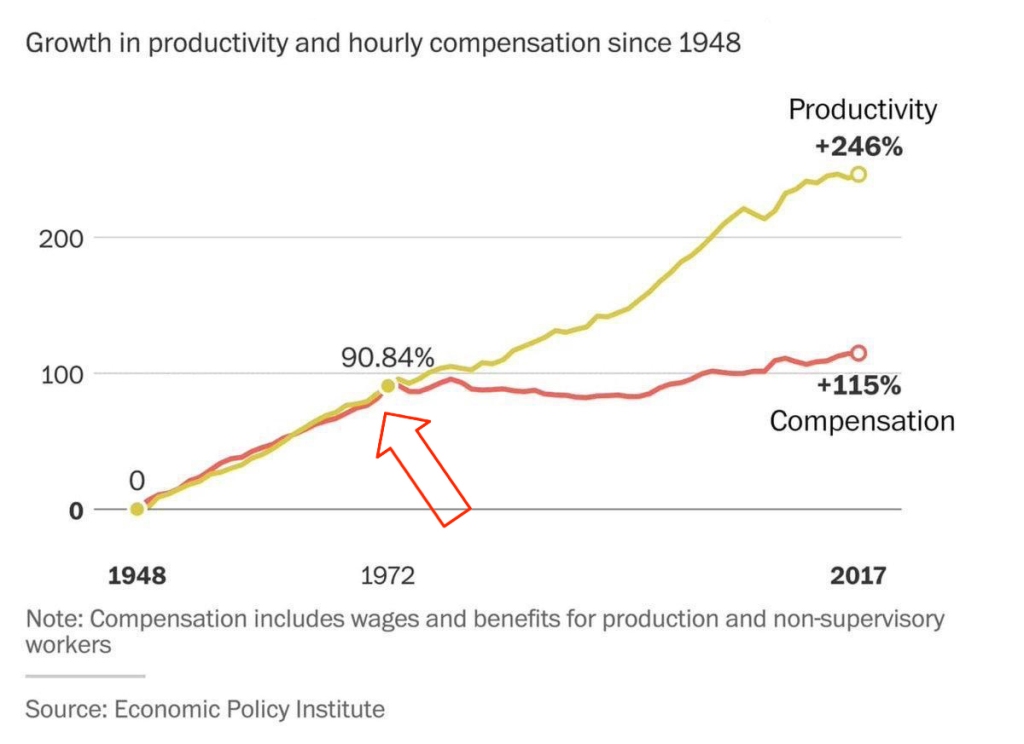 This chart shows that from 1948 to the early 1970s, productivity and wages grew together.\
But after the end of the gold standard in 1971 — the connection broke. Productivity kept rising, but real wages stalled.
This chart shows that from 1948 to the early 1970s, productivity and wages grew together.\
But after the end of the gold standard in 1971 — the connection broke. Productivity kept rising, but real wages stalled.👉 This means: you work more, better, faster — but buy less.
🔗 Source: wtfhappenedin1971.com
When you must spend today because tomorrow it’ll be worth less — that’s rewarding impulse and punishing long-term thinking.
Bitcoin offers a different environment:\ – Savings work\ – Long-term thinking is rewarded\ – The price of the future is calculated, not forced by a printing press
📌 Inflation can be a tool. But in government hands, it became a weapon — a slow, inevitable upward redistribution of wealth.
\ \ Statement: War is not growth, but a reallocation of resources into destruction.
Criticism: war can spur technological leaps (Internet, GPS, nuclear energy — all from military programs). "Military Keynesianism" was a real model.
4. “War Drives R&D”
Yes, wars sometimes give rise to tech spin-offs: Internet, GPS, nuclear power — all originated from military programs.
But that doesn’t make war a source of progress — it makes tech a byproduct of catastrophe.
“War reallocates resources toward destruction — not growth.”
Progress doesn’t happen because of war — it happens despite it.
If scientific breakthroughs require a million dead and burnt cities — maybe you’ve built your economy wrong.
💬 Even Michael Saylor said:
“If you need war to develop technology — you’ve built civilization wrong.”
No innovation justifies diverting human labor, minds, and resources toward destruction.\ War is always the opposite of efficiency — more is wasted than created.
🧠 Bitcoin, on the other hand, is an example of how real R&D happens without violence.\ No taxes. No army. Just math, voluntary participation, and open-source code.
📌 Military Keynesianism is not a model of progress — it’s a symptom of a sick monetary system that needs destruction to reboot.
Bitcoin shows that coordination without violence is possible.\ This is R&D of a new kind: based not on destruction, but digital creation.
Statement: Bitcoin isn’t “Gold 1.0,” but an improved version: divisible, verifiable, unseizable.
Criticism: Bitcoin has no physical value; "unseizability" is a theory;\ Gold is material and autonomous.
5. “Bitcoin Has No Physical Value”
And gold does? Just because it shines?
Physical form is no guarantee of value.\ Real value lies in: scarcity, reliable transfer, verifiability, and non-confiscatability.
Gold is:\ – Hard to divide\ – Hard to verify\ – Expensive to store\ – Easy to seize
💡 Bitcoin is the first store of value in history that is fully free from physical limitations, and yet:\ – Absolutely scarce (21M, forever)\ – Instantly transferable over the Internet\ – Cryptographically verifiable\ – Controlled by no government
🔑 Bitcoin’s value lies in its liberation from the physical.\ It doesn’t need to be “backed” by gold or oil. It’s backed by energy, mathematics, and ongoing verification.
“Price is what you pay, value is what you get.” — Warren Buffett
When you buy bitcoin, you’re not paying for a “token” — you’re gaining access to a network of distributed financial energy.
⚡️ What are you really getting when you own bitcoin?\ – A key to a digital asset that can’t be faked\ – The ability to send “crystallized energy” anywhere on Earth (it takes 10 minutes on the base L1 layer, or instantly via the Lightning Network)\ – A role in a new accounting system that runs 24/7/365\ – Freedom: from banks, borders, inflation, and force
📉 Bitcoin doesn’t require physical value — because it creates value:\ Through trust, scarcity, and energy invested in mining.\ And unlike gold, it was never associated with slavery.
Statement: There’s no “income without risk” in Bitcoin: just hold — you preserve; want more — invest, risk, build.
Criticism: contradicts HODL logic; speculation remains dominant behavior.
6. “Speculation Dominates”
For now — yes. That’s normal for the early phase of a new technology. Awareness doesn’t come instantly.
What matters is not the motive of today’s buyer — but what they’re buying.
📉 A speculator may come and go — but the asset remains.\ And this asset is the only one in history that will never exist again. 21 million. Forever.
📌 Look deeper. Bitcoin has:\ – No CEO\ – No central issuer\ – No inflation\ – No “off switch”\ 💡 It was fairly distributed — through mining, long before ASICs existed. In the early years, bitcoin was spent and exchanged — not hoarded. Only those who truly believed in it are still holding it today.
💡 It’s not a stock. Not a startup. Not someone’s project.\ It’s a new foundation for trust.\ It’s opting out of a system where freedom is a privilege you’re granted under conditions.
🧠 People say: “Bitcoin can be copied.”\ Theoretically — yes.\ Practically — never.
Here’s what you’d need to recreate Bitcoin:\ – No pre-mine\ – A founder who disappears and never sells\ – No foundation or corporation\ – Tens of thousands of nodes worldwide\ – 701 million terahashes of hash power\ – Thousands of devs writing open protocols\ – Hundreds of global conferences\ – Millions of people defending digital sovereignty\ – All that without a single marketing budget
That’s all.
🔁 Everything else is an imitation, not a creation.\ Just like you can’t “reinvent fire” — Bitcoin can only exist once.
Statements:\ **The Russia's '90s weren’t a free market — just anarchic chaos without rights protection.\ **Unlike fiat or even dollars, Bitcoin is the first asset with real defense — from governments, inflation, even thugs.\ *And yes, even if your barber asks about Bitcoin — maybe it's not a bubble, but a sign that inflation has already hit everyone.
Criticism: Bitcoin’s protection isn’t universal — it works only with proper handling and isn’t available to all.\ Some just want to “get rich.”\ None of this matters because:
-
Bitcoin’s volatility (-30% in a week, +50% in a month) makes it unusable for price planning or contracts.
-
It can’t handle mass-scale usage.
-
To become currency, geopolitical will is needed — and without the first two, don’t even talk about the third.\ Also: “Bitcoin is too complicated for the average person.”
7. “It’s Too Complex for the Masses”
It’s complex — if you’re using L1 (Layer 1). But even grandmas use Telegram. In El Salvador, schoolkids buy lunch with Lightning. My barber installed Wallet of Satoshi in minutes right in front of me — and I now pay for my haircut via Lightning.
UX is just a matter of time. And it’s improving. Emerging tools:\ Cashu, Fedimint, Fedi, Wallet of Satoshi, Phoenix, Proton Wallet, Swiss Bitcoin Pay, Bolt Card / CoinCorner (NFC cards for Lightning payments).
This is like the internet in 1995:\ It started with modems — now it’s 4K streaming.
💸 Now try sending a regular bank transfer abroad:\ – you need to type a long IBAN\ – add SWIFT/BIC codes\ – include the recipient’s full physical address (!), compromising their privacy\ – sometimes add extra codes or “purpose of payment”\ – you might get a call from your bank “just to confirm”\ – no way to check the status — the money floats somewhere between correspondent/intermediary banks\ – weekends or holidays? Banks are closed\ – and don’t forget the limits, restrictions, and potential freezes
📌 With Bitcoin, you just scan a QR code and send.\ 10 minutes on-chain = final settlement.\ Via Lightning = instant and nearly free.\ No bureaucracy. No permission. No borders.
8. “Can’t Handle the Load”
A common myth.\ Yes, Bitcoin L1 processes about 7 transactions per second — intentionally. It’s not built to be Visa. It’s a financial protocol, just like TCP/IP is a network protocol. TCP/IP isn’t “fast” or “slow” — the experience depends on the infrastructure built on top: servers, routers, hardware. In the ’90s, it delivered text. Today, it streams Netflix. The protocol didn’t change — the stack did.
Same with Bitcoin: L1 defines rules, security, finality.\ Scaling and speed? That’s the second layer’s job.
To understand scale:
| Network | TPS (Transactions/sec) | | --- | --- | | Visa | up to 24,000 | | Mastercard | \~5,000 | | PayPal | \~193 | | Litecoin | \~56 | | Ethereum | \~20 | | Bitcoin | \~7 |
\ ⚡️ Enter Lightning Network — Bitcoin’s “fast lane.”\ It allows millions of transactions per second, instantly and nearly free.
And it’s not a sidechain.
❗️ Lightning is not a separate network.\ It uses real Bitcoin transactions (2-of-2 multisig). You can close the channel to L1 at any time. It’s not an alternative — it’s a native extension built into Bitcoin.\ Also evolving: Ark, Fedimint, eCash — new ways to scale and add privacy.
📉 So criticizing Bitcoin for “slowness” is like blaming TCP/IP because your old modem won’t stream YouTube.\ The protocol isn’t the problem — it’s the infrastructure.
🛡️ And by the way: Visa crashes more often than Bitcoin.
9. “We Need Geopolitical Will”
Not necessarily. All it takes is the will of the people — and leaders willing to act. El Salvador didn’t wait for G20 approval or IMF blessings. Since 2001, the country had used the US dollar as its official currency, abandoning its own colón. But that didn’t save it from inflation or dependency on foreign monetary policy. In 2021, El Salvador became the first country to recognize Bitcoin as legal tender. Since March 13, 2024, they’ve been purchasing 1 BTC daily, tracked through their public address:
🔗 Address\ 📅 First transaction
This policy became the foundation of their Strategic Bitcoin Reserve (SBR) — a state-led effort to accumulate Bitcoin as a national reserve asset for long-term stability and sovereignty.
Their example inspired others.
In March 2025, U.S. President Donald Trump signed an executive order creating the Strategic Bitcoin Reserve of the USA, to be funded through confiscated Bitcoin and digital assets.\ The idea: accumulate, don’t sell, and strategically expand the reserve — without extra burden on taxpayers.
Additionally, Senator Cynthia Lummis (Wyoming) proposed the BITCOIN Act, targeting the purchase of 1 million BTC over five years (\~5% of the total supply).\ The plan: fund it via revaluation of gold certificates and other budget-neutral strategies.
📚 More: Strategic Bitcoin Reserve — Wikipedia
👉 So no global consensus is required. No IMF greenlight.\ All it takes is conviction — and an understanding that the future of finance lies in decentralized, scarce assets like Bitcoin.
10. “-30% in a week, +50% in a month = not money”
True — Bitcoin is volatile. But that’s normal for new technologies and emerging money. It’s not a bug — it’s a price discovery phase. The world is still learning what this asset is.
📉 Volatility is the price of entry.\ 📈 But the reward is buying the future at a discount.
As Michael Saylor put it:
“A tourist sees Niagara Falls as chaos — roaring, foaming, spraying water.\ An engineer sees immense energy.\ It all depends on your mental model.”
Same with Bitcoin. Speculators see chaos. Investors see structural scarcity. Builders see a new financial foundation.
💡 Now consider gold:
👉 After the gold standard was abandoned in 1971, the price of gold skyrocketed from around \~$300 to over $2,700 (adjusted to 2023 dollars) by 1980. Along the way, it experienced extreme volatility — with crashes of 40–60% even amid the broader uptrend.\ 💡 (\~$300 is the inflation-adjusted equivalent of about $38 in 1971 dollars)\ 📈 Source: Gold Price Chart — Macrotrends\ \ Nobody said, “This can’t be money.” \ Because money is defined not by volatility, but by scarcity, adoption, and trust — which build over time.
📊 The more people save in Bitcoin, the more its volatility fades.
This is a journey — not a fixed state.
We don’t judge the internet by how it worked in 1994.\ So why expect Bitcoin to be the “perfect currency” in 2025?
It grows bottom-up — without regulators’ permission.\ And the longer it survives, the stronger it becomes.
Remember how many times it’s been declared dead.\ And how many times it came back — stronger.
📊 Gold vs. Bitcoin: Supply Comparison
This chart shows the key difference between the two hard assets:
🔹 Gold — supply keeps growing.\ Mining may be limited, but it’s still inflationary.\ Each year, there’s more — with no known cap: new mines, asteroid mining, recycling.
🔸 Bitcoin — capped at 21 million.\ The emission schedule is public, mathematically predictable, and ends completely around 2140.
🧠 Bottom line:\ Gold is good.\ Bitcoin is better — for predictability and scarcity.
💡 As Saifedean Ammous said:
“Gold was the best monetary good… until Bitcoin.”
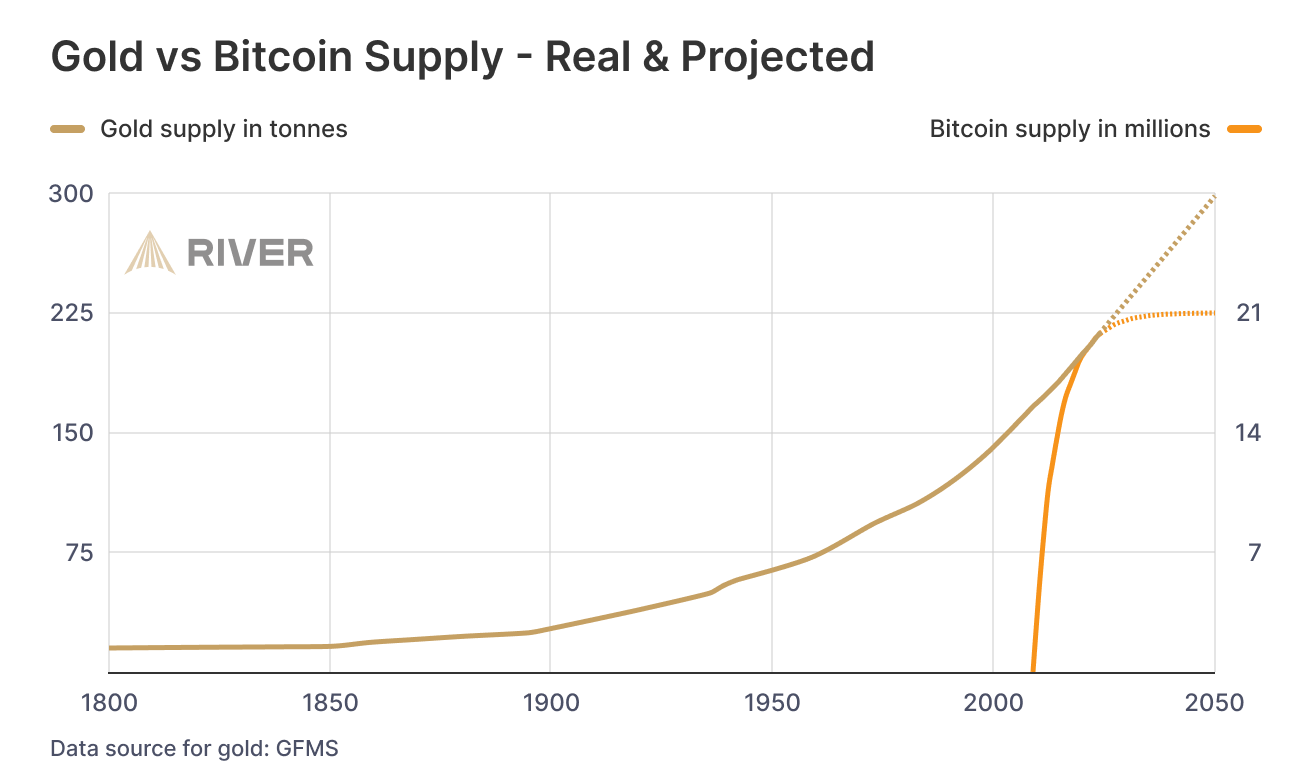 ### While we argue — fiat erodes every day.
### While we argue — fiat erodes every day.No matter your view on Bitcoin, just show me one other asset that is simultaneously:
– immune to devaluation by decree\ – impossible to print more of\ – impossible to confiscate by a centralized order\ – impossible to counterfeit\ – and, most importantly — transferable across borders without asking permission from a bank, a state, or a passport
💸 Try sending $10,000 through PayPal from Iran to Paraguay, or Bangladesh to Saint Lucia.\ Good luck. PayPal doesn't even work there.
Now open a laptop, type 12 words — and you have access to your savings anywhere on Earth.
🌍 Bitcoin doesn't ask for permission.\ It works for everyone, everywhere, all the time.
📌 There has never been anything like this before.
Bitcoin is the first asset in history that combines:
– digital nature\ – predictable scarcity\ – absolute portability\ – and immunity from tyranny
💡 As Michael Saylor said:
“Bitcoin is the first money in human history not created by bankers or politicians — but by engineers.”
You can own it with no bank.\ No intermediary.\ No passport.\ No approval.
That’s why Bitcoin isn’t just “internet money” or “crypto” or “digital gold.”\ It may not be perfect — but it’s incorruptible.\ And it’s not going away.\ It’s already here.\ It is the foundation of a new financial reality.
🔒 This is not speculation. This is a peaceful financial revolution.\ 🪙 This is not a stock. It’s money — like the world has never seen.\ ⛓️ This is not a fad. It’s a freedom protocol.
And when even the barber starts asking about Bitcoin — it’s not a bubble.\ It’s a sign that the system is breaking.\ And people are looking for an exit.
For the first time — they have one.
💼 This is not about investing. It’s about the dignity of work.
Imagine a man who cleans toilets at an airport every day.
Not a “prestigious” job.\ But a crucial one.\ Without him — filth, bacteria, disease.
He shows up on time. He works with his hands.
And his money? It devalues. Every day.
He doesn’t work less — often he works more than those in suits.\ But he can afford less and less — because in this system, honest labor loses value each year.
Now imagine he’s paid in Bitcoin.
Not in some “volatile coin,” but in hard money — with a limited supply.\ Money that can’t be printed, reversed, or devalued by central banks.
💡 Then he could:
– Stop rushing to spend, knowing his labor won’t be worth less tomorrow\ – Save for a dream — without fear of inflation eating it away\ – Feel that his time and effort are respected — because they retain value
Bitcoin gives anyone — engineer or janitor — a way out of the game rigged against them.\ A chance to finally build a future where savings are real.
This is economic justice.\ This is digital dignity.
📉 In fiat, you have to spend — or your money melts.\ 📈 In Bitcoin, you choose when to spend — because it’s up to you.
🧠 In a deflationary economy, both saving and spending are healthy:
You don’t scramble to survive — you choose to create.
🎯 That’s true freedom.
When even someone cleaning floors can live without fear —\ and know that their time doesn’t vanish... it turns into value.
🧱 The Bigger Picture
Bitcoin is not just a technology — it’s rooted in economic philosophy.\ The Austrian School of Economics has long argued that sound money, voluntary exchange, and decentralized decision-making are prerequisites for real prosperity.\ Bitcoin doesn’t reinvent these ideas — it makes them executable.
📉 Inflation doesn’t just erode savings.\ It quietly destroys quality of life.\ You work more — and everything becomes worse:\ – food is cheaper but less nutritious\ – homes are newer but uglier and less durable\ – clothes cost more but fall apart in months\ – streaming is faster, but your attention span collapses\ This isn’t just consumerism — it’s the economics of planned obsolescence.
🧨 Meanwhile, the U.S. debt has exceeded 3x its GDP.\ And nobody wants to buy U.S. bonds anymore — so the U.S. has to buy its own debt.\ Yes: printing money to buy the IOUs you just printed.\ This is the endgame of fiat.
🎭 Bonds are often sold as “safe.”\ But in practice, they are a weapon — especially abroad.\ The U.S. and IMF give loans to developing countries.\ But when those countries can’t repay (due to rigged terms or global economic headwinds), they’re forced to sell land, resources, or strategic assets.\ Both sides lose: the debtor collapses under the weight of debt, while the creditor earns resentment and instability.\ This isn’t cooperation — it’s soft colonialism enabled by inflation.
📌 Bitcoin offers a peaceful exit.\ A financial system where money can’t be created out of thin air.\ Where savings work.\ Where dignity is restored — even for those who clean toilets.
-
-
 @ 0e9491aa:ef2adadf
2025-05-21 18:01:14
@ 0e9491aa:ef2adadf
2025-05-21 18:01:14
For years American bitcoin miners have argued for more efficient and free energy markets. It benefits everyone if our energy infrastructure is as efficient and robust as possible. Unfortunately, broken incentives have led to increased regulation throughout the sector, incentivizing less efficient energy sources such as solar and wind at the detriment of more efficient alternatives.
The result has been less reliable energy infrastructure for all Americans and increased energy costs across the board. This naturally has a direct impact on bitcoin miners: increased energy costs make them less competitive globally.
Bitcoin mining represents a global energy market that does not require permission to participate. Anyone can plug a mining computer into power and internet to get paid the current dynamic market price for their work in bitcoin. Using cellphone or satellite internet, these mines can be located anywhere in the world, sourcing the cheapest power available.
Absent of regulation, bitcoin mining naturally incentivizes the build out of highly efficient and robust energy infrastructure. Unfortunately that world does not exist and burdensome regulations remain the biggest threat for US based mining businesses. Jurisdictional arbitrage gives miners the option of moving to a friendlier country but that naturally comes with its own costs.
Enter AI. With the rapid development and release of AI tools comes the requirement of running massive datacenters for their models. Major tech companies are scrambling to secure machines, rack space, and cheap energy to run full suites of AI enabled tools and services. The most valuable and powerful tech companies in America have stumbled into an accidental alliance with bitcoin miners: THE NEED FOR CHEAP AND RELIABLE ENERGY.
Our government is corrupt. Money talks. These companies will push for energy freedom and it will greatly benefit us all.
Microsoft Cloud hiring to "implement global small modular reactor and microreactor" strategy to power data centers: https://www.datacenterdynamics.com/en/news/microsoft-cloud-hiring-to-implement-global-small-modular-reactor-and-microreactor-strategy-to-power-data-centers/
If you found this post helpful support my work with bitcoin.

-
 @ 9ca447d2:fbf5a36d
2025-05-21 11:20:44
@ 9ca447d2:fbf5a36d
2025-05-21 11:20:44JPMorgan Chase, the biggest bank in the U.S., is now allowing its clients to buy bitcoin — a big change of heart for an institution whose CEO, Jamie Dimon, has been a long-time critic of the scarce digital asset.
Dimon made the announcement on the bank’s investor day, which came as a shift in JPMorgan’s approach to digital assets. “We are going to allow you to buy it,” he said. “We’re not going to custody it. We’re going to put it in statements for clients.”
That means clients can buy BTC through JPMorgan but the bank won’t hold or store the digital asset. Instead it will provide access and include the BTC purchases in client statements.
According to multiple reports and posts, JPMorgan has been blocking transactions from digital asset exchanges, with several people complaining about their experience on social media.


There is even an official notice on the company’s UK website that explicitly says customers cannot use their funds to purchase digital assets.

JPMorgan Chase UK website — Source
It’s a big change because Dimon has been one of Bitcoin’s biggest critics. Over the years he’s called it “worthless”, a “fraud” and even compared it to a “pet rock”.
He’s repeatedly expressed concern over digital assets’ use in illegal activities such as money laundering, terrorism, sex trafficking and tax evasion. A role that his critics say the U.S. dollar is playing on a much larger scale.
Related: Jamie Dimon Would “Close Down” Bitcoin If He Had Government Role
“The only true use case for it is criminals, drug traffickers … money laundering, tax avoidance,” he told lawmakers during a Senate hearing in 2023. At the 2024 World Economic Forum in Davos, he doubled down, “Bitcoin does nothing. I call it the pet rock.”
Despite his personal views, Dimon says the bank is responding to client demand. “I don’t think you should smoke, but I defend your right to smoke,” he said. “I defend your right to buy bitcoin.”
It’s worth noting JPMorgan isn’t fully embracing digital assets. The bank won’t be offering direct custody services or launching its own exchange.
Instead, it’s offering access to digital asset exchanges. There are even reports that the bank also plans to facilitate access to bitcoin ETFs and possibly other investment vehicles. Until recently, JPMorgan had limited its bitcoin exposure to futures-based products.
Other big financial firms have already taken similar steps.
Morgan Stanley, for example, has been offering some clients access to bitcoin ETFs since August 2024. Its CEO, Ted Pick, said earlier this year that the firm is working closely with regulators to explore ways to get into the digital assets space.
Dimon does like blockchain, though — the technology that underpins it. JPMorgan has its own blockchain projects including JPM Coin and recently ran a test transaction on a public blockchain of tokenized U.S. Treasuries.
Many criticize this view, saying that the most powerful aspect of Bitcoin is its decentralization. So, a centralized blockchain is just useless. This might be the reason Dimon has grown weary of all JPMorgan’s blockchain initiatives, because they offered nothing of value.
He said he might have given blockchain too much credit during his investor day comments: “We have been talking about blockchain for 12 to 15 years,” he said. “We spend too much on it. It doesn’t matter as much as you all think.”
-
 @ 662f9bff:8960f6b2
2025-05-21 11:09:22
@ 662f9bff:8960f6b2
2025-05-21 11:09:22Issue 11 already - I will be including numbers going forward to make past letters easier to find and refer to. The past two weeks I have been on vacation - my first real vacation is a couple of years. Monday I am back to work for a bit. I have decided to work from here rather than subject myself to more international travel - we are still refugees from the insanity in Hong Kong. We really have been relaxing and enjoying life on the island. Levada hikes and Jeep tours!
220415 Jeep tour - Cabo Girao, Porto Moniz, Fanal and Ponto do Sol - Madeira
We had plenty of time to relax and enjoy life. Madeira is a fantastic place to visit with lots to see and do and even more weather!. I did think that HK was mountainous - but Madeira is next level! Portuguese is also something else; have not yet made much progress but we did not try much and English will generally suffice. As you see in the video above, Madeira is getting serious about attracting Digital Nomads and as you will see below they have forward-thinking local government - exactly as foreseen in my top book pick - The Sovereign Indvidual.
I did get to read quite a lot of interesting books and material - will be sharing insights below and going forward. Happy to discuss too - that offer is still open.
Among other things I got to appreciate more the Apple ecosystem and the seamless integration between Mac, iPhone and iPad - in combination with working with no/limited WiFi and using tethering from my CalyxOS Pixel. Strong privacy is important and Apple scores reasonably well - though you will want to take some additional precautions, I have been enjoying reading my kindle on all platforms and listening to the audio-books with reading-location syncing (fantastic). I am considering sharing tips and tricks on secure setups as well as aspects that I find particularly useful - do talk to me if you have questions or suggestions.
Bitcoin BTC
Given how important Bitcoin already is and will become I think it is right that I should include a section here with relevant news, insights and provocations to discuss. Note that Bitcoin is different from "Crypto"; do not get them mixed up!
-
Madeira is not just trying to be friendly to digital nomads - photo above and Ponto do Sol. Last week the President of the Government of Madeira, Miguel Albuquerque attended the Miami conference to announce that his government will “work to create a fantastic environment for bitcoin in Madeira.” This is part of the Game Theory of Bitcoin Adoption by Nation States
-
Announcing Taro, Multi-Asset Bitcoin & Lightning** **- this has potential to be something really big. It complements, and may even be better than, Jack Mallers' Strike. Their Blog post is here and the Wiki with the detailed specification is here.
-
Michael Saylor is one of today's pre-eminent thinkers and communicators. Listen and learn from his revcent interview with Lex Friedman.
-
SLP365 Anita Posch - Bitcoin For Fairness in Zimbabwe and Zambia — A great interview by Stephan Livera. Key takeaways: Learn how to use it before you really need it. if it works in Zimbabwe and Namibia it will work anywhere It’s still early and governments will give no help; rather they will be busy putting sticks in the wheels and sand in the gears…
-
For those who look for education on Bitcoin - a starting point can be Anita Posch's The Art of (L)earning Bitcoin with many useful resources linked.
Discovery of the week - Obsidian
For years I have been an avid notetaker. I caught the bug when I did Electronic Engineering at Southampton University and we had to keep a "lab book". Ever since then in my professional work I kept a notebook and took daily notes. Recently this evolved into taking notes on computer. With the arrival of online working and screen-sharing such notes can be very useful and this unleased new value in note-taking.
For personal notes I found great value with Apple Notes - a tool that has improved dramatically in recent years and works perfectly on Mac, iPhone and iPad. However, like many notetakers I often felt that I was "missing a trick". The reality is that searching and retrieval is not as easy as you want it to be and it's hard to reassemble and repurpose your collected information into new output.
In recent years I have considered using several tools but found none of them compelling enough to put in the time to learn and adopt. There is also the fear of "lock in" and endless subscriptions to pay - as anyone who has used Evernote will know!
Big thank you to Rachel for this one. She did get me thinking and encouraged me to give Obsidian another try - I had looked at it last year but it felt overwhelming compared to Apple Notes - I could never have imagined how great it could be!
The absolute best overview of Obsidian and how to use it is FromSergio - his playlist is required watching. Particular highlights:
-
Kindle Highlights - this is a superbly useful feature that normally you can only get with a subscription service - do buy the developer a coffee!
-
No Lock-in - your files are simple markdown and you have full control
-
Works perfectly on Mac and iPhones using iCloud - no annoying sync subscription to pay for
-
It's free for personal use - no payment or annoying subscription
-
Lots of high quality training material readily available and a great community of people to help you
Reading
-
Empires Rise and Fall this extracts and summarises from John Glubb's paper of nearly 100 years ago, The Fate of Empires - I think you call that foresight! I do identify with his frustrations about how history has been taught considering how important it is to learn from past generations.
-
The Sovereign Individual is required reading for everyone - I did dip back into it a few times over the last week or so, making Kindle highlights that magically sync into Obsidian - how great is that! If you read nothing else, read chapter 7.
-
From Paris to Karachi – Regime Change is In the Air - Tom Luongo is a most interesting character and he does speak his mind. Read and consider. You might prefer to listen to him discussing with Marty.
-
Aleks Svetski: The Remnant, The Parasite & The Masses - inspired by the incredible 1930’s essay by Albert J Nock; Isaiah’s Job. Aleks discusses this in his Wake Up podcast - also recommended.
-
In my TBR queue (to be read): Atlas Shrugged by Ayn Rand - I must admit, I am in intrigued by Odolena's review in addition to Aleks' recommendation.
-
I also think that I need to restart on (and finish) Foundation by Isaac Asimov - after watching Odolena's review of it!
-
...and I need to add Meditations by Marcus Aurelius - again inspired by Odolena's review and I have seen others recommend it too!
Watching and Listening
-
Joe Blogs: Who is BUYING Russian Oil Now? Can Europe really change SUPPLIERS & are SANCTIONS Working? - do stop and think - in who's name are the governments implementing all these extreme measures - go back and re-read section "So what can you do about it?" in issue 9
-
Rupert Murdochizing The Internet — The Cyberlaw Podcast — whether you agree with him or not Stewart Baker is just the best podcast provocateur!
-
AntiWarhol, Culture Creation, & The Pop Art Syndicate — One of The Higherside Chats - perhaps this might open your mind and make you question some things. The rabbit hole goes deep.
-
How Britain's Bankers Made Billions From The End Of Empire. At the demise of British Empire, City of London financial interests created a web of offshore secrecy jurisdictions that captured wealth from across the globe and hid it behind obscure financial structures in a web of offshore islands.
-
Secret City - A film about the City of London, the Corporation that runs it.
-
How things get Re-Priced when a Currency Fails — An important explainer from Joe Brown of The Heresy Financial Podcast — keep an eye out for signs!
-
E76: Elon vs. Twitter — the All-In Podcast. I do not agree with all these boyz say but it is interesting to listen to see how the Silicon Valley types think. David Sacks nails it, and Chamath is not far behind! If you were in any doubt as to how corrupt things are this should put you right!
For those who prefer a structured reading list, check References
That's it!
No one can be told what The Matrix is.\ You have to see it for yourself.**
Do share this newsletter with any of your friends and family who might be interested.
You can also email me at: LetterFrom@rogerprice.me
💡Enjoy the newsletters in your own language : Dutch, French, German, Serbian, Chinese Traditional & Simplified, Thai and Burmese.
-
-
 @ 0e9491aa:ef2adadf
2025-05-21 18:01:13
@ 0e9491aa:ef2adadf
2025-05-21 18:01:13
Humanity's Natural State Is Chaos
Without order there is chaos. Humans competing with each other for scarce resources naturally leads to conflict until one group achieves significant power and instates a "monopoly on violence."Power Brings Stability
Power has always been the key means to achieve stability in societies. Centralized power can be incredibly effective in addressing issues such as crime, poverty, and social unrest efficiently. Unfortunately this power is often abused and corrupted.Centralized Power Breeds Tyranny
Centralized power often leads to tyrannical rule. When a select few individuals hold control over a society, they tend to become corrupted. Centralized power structures often lack accountability and transparency, and rely too heavily on trust.Distributed Power Cultivates Freedom
New technology that empowers individuals provide us the ability to rebuild societies from the bottom up. Strong individuals that can defend and provide for themselves will help build strong local communities on a similar foundation. The result is power being distributed throughout society rather than held by a select few.In the short term, relying on trust and centralized power is an easy answer to mitigating chaos, but freedom tech tools provide us the ability to build on top of much stronger distributed foundations that provide stability while also cultivating individual freedom.
The solution starts with us. Empower yourself. Empower others. A grassroots freedom tech movement scaling one person at a time.
If you found this post helpful support my work with bitcoin.

-
 @ 8bad92c3:ca714aa5
2025-05-21 11:00:34
@ 8bad92c3:ca714aa5
2025-05-21 11:00:34Marty's Bent

If you do one thing today, take the time to spend an hour to watch this YouTube video. As someone creating content who has become very cognizant of the effects of the algorithm and the pressures to cater to it, this video was unexpectedly and incredibly satisfying. We're coming up on the eight year anniversary of this newsletter and the podcast that accompanies it and over that eight year period, the pressures to compete in the world of ever increasing digital soy slop grow at an accelerating rate.
If you've seen our YouTube channel recently, you'll probably notice that we've bent the knee to the thumbnail and title clickbait game in an attempt to get our content out to a wider audience. This is something I've held out on for many years now at this point, but recently became convinced that it's something we simply have to do if we want to get our message out to a wider audience. As I write this, I'm thinking that maybe the fact that we have to do that in the first place says something about the content we're putting out there and whether or not it is actually valuable. But I do think the high velocity trash economy becoming completely saturated with digital soy slop has made it so people who truly want to get their message out have to play that game.
I want to make one thing clear. I certainly do not think I'm an artist, but I do like to think that over the last eight years we've been putting out information via content mediums that is valuable to you, dear reader. However, the informational content we put out there, particularly the audio and video content, is put on platforms where it is forced to compete with others who cater to the lowest common denominators of dopamine hijacking and in-group signaling that draws the masses like moths to a flame.
If you haven't watched the YouTube video yet, which I'm assuming 99.9% of you haven't, this may seem like a nonsensical ramble. So, I'll keep this one short and urge you to go watch the social commentary from comedian Jarrett Moore about the state of art, "content" and its effect on culture as it stands today. I'm assuming this isn't too much of a spoiler alert, but the situation is pretty dire. The world needs better art and people who are willing to support artists who are truly creative and take risks. This has nothing to do with bitcoin. But I think it highlights an interesting part of our society that is deteriorating at a rapid clip. And it's something that all of us should feel compelled to attend to lest we speed run into Idiocracy.
It made me feel uneasy about parts of my approach to this business, and that's a good thing.
Don't forget to buy a Bitkey!
Iran's Nuclear Ambitions Create a "Never-Ending Crisis"
In our latest discussion, energy expert Dr. Anas Alhajji described what he called Iran's "never-ending crisis" – a thesis he first published over 20 years ago that has proven remarkably accurate. As Alhajji explained, this crisis persists because of a fundamental contradiction: the U.S. sees any Iranian nuclear program (even peaceful) as strengthening a hostile regime, while Iran views nuclear energy as essential for domestic stability and economic survival.
"Iran is not going to negotiate over the bomb. They want to drag everything for the longest period until they get the bomb." - Dr. Anas Alhajji
What's particularly concerning is Iran's resilience against sanctions. Alhajji detailed how Iran has masterfully circumvented oil export restrictions through China, using a dedicated Chinese bank to process payments outside the international system. Iran's leadership appears willing to endure temporary geopolitical losses in Syria, Lebanon, and potentially Yemen, calculating that obtaining nuclear weapons will fundamentally transform regional politics and their treatment by the United States.
Check out the full podcast here for more on Trump's Middle East strategy, the future of BRICS, and critical challenges facing global energy infrastructure.
Headlines of the Day
Standard Chartered Predicts Bitcoin Will Reach $500K by 2028 - via X
Lummis: Genius Act Makes US Leader in Digital Asset Policy - via X
Get our new STACK SATS hat - via tftcmerch.io
Jake Tapper's Admission on Biden's Decline Sparks Media Ethics Debate - via X
Take the First Step Off the Exchange
Bitkey is an easy, secure way to move your Bitcoin into self-custody. With simple setup and built-in recovery, it’s the perfect starting point for getting your coins off centralized platforms and into cold storage—no complexity, no middlemen.
Take control. Start with Bitkey.
Use the promo code *“TFTC20”* during checkout for 20% off
Ten31, the largest bitcoin-focused investor, has deployed 158,469 sats | $150.00M across 30+ companies through three funds. I am a Managing Partner at Ten31 and am very proud of the work we are doing. Learn more at ten31.vc/invest.
Final thought...
My oldest is already at the "faking sick to get out of school" stage and I'm extremely proud.
Get this newsletter sent to your inbox daily: https://www.tftc.io/bitcoin-brief/
Subscribe to our YouTube channels and follow us on Nostr and X:
@media screen and (max-width: 480px) { .mobile-padding { padding: 10px 0 !important; } .social-container { width: 100% !important; max-width: 260px !important; } .social-icon { padding: 0 !important; } .social-icon img { height: 32px !important; width: 32px !important; } .icon-cell { padding: 0 4px !important; } } .mj-column-per-33-333333333333336 { width: 25% !important; max-width: 25%; } .moz-text-html .mj-column-per-33-333333333333336 { width: 25% !important; max-width: 25%; } /* Helps with rendering in various email clients */ body { margin: 0 !important; padding: 0 !important; -webkit-text-size-adjust: 100% !important; -ms-text-size-adjust: 100% !important; } img { -ms-interpolation-mode: bicubic; } /* Prevents Gmail from changing the text color in email threads */ .im { color: inherit !important; }
-
 @ 70c48e4b:00ce3ccb
2025-05-21 10:52:12
@ 70c48e4b:00ce3ccb
2025-05-21 10:52:12Dear readers,
“The direct use of force is such a poor solution to any problem, it is generally employed only by small children and large nations.” — David Friedman
What If we could enforce promises without force?
David Friedman, in his book The Machinery of Freedom, tosses out a pretty wild idea: that people can build systems of cooperation and justice without needing a government at all. These systems rely on voluntary agreements, social reputation, and mutual incentives. In such a world, contracts hold value because honoring a promise brings greater rewards than breaking it.
From Friedman to Bitcoin
https://i.ytimg.com/vi/e8zsFTV94bw/maxresdefault.jpg
This vision shaped the thinking behind Angor, a funding tool built on Bitcoin. Friedman’s ideas showed that systems of cooperation could work without central authority, and Bitcoin now provides the foundation to build them. It records transactions in a public and tamper-proof way. With features like Taproot, people can set clear rules for funding and accountability. Angor uses these tools to help founders and backers create agreements that are transparent and easy to verify.
The result is a new kind of marketplace where follow-through is visible, and reputation becomes a real asset. Instead of relying on enforcement from above, trust is earned through action and built into the system itself.
What happens after the project succeeds?
One important question kept returning throughout our work: what happens after a project succeeds? The founder raises the funds, delivers the product, and begins earning revenue. What mechanism ensures that revenue is shared as promised? How can investors protect their interests in an environment that relies on voluntary structure rather than external authority?
To explore possible answers, we looked at how libertarian thinkers approach contracts in stateless systems.
How libertarian thinkers approach contracts without the state?
Friedman, along with other libertarian thinkers like Murray Rothbard and Bruce Benson, describes voluntarily created legal systems where people make binding agreements and use private mechanisms to enforce them. These mechanisms include:
• Reputational risk • Collateralized performance • Community arbitration • Decentralized insuranceSuch tools can replace state-backed enforcement when trust is earned and incentives are aligned.
If founders are anonymous:
When a founder chooses to remain pseudonymous, legal enforcement is not available. In this case, the agreement between the founder and investor can rely on cryptographic mechanisms such as performance bonds, revenue proofs, and public reputation systems.
- Performance Bonds
• Founders deposit additional Bitcoin into a separate, time-locked contract. As they meet revenue-sharing milestones, they are allowed to unlock specific portions of this bond.
• If a revenue allocation is missed or a deadline passes without fulfillment, the contract redirects the bond to investors through a Taproot clause i.e. a feature in Bitcoin that lets you set up ‘if-this-then-that’ rules directly into a transaction, but privately. This creates a clear and automatic consequence, reinforcing accountability through financial incentives.
- Revenue Proofs and Oracles
• Most founders, especially those running small businesses like cafes, games, or services, do not earn revenue in Bitcoin. Their income flows through fiat systems, which means automatic on-chain revenue streaming is not an option. The only way to maintain transparency is to prove income after the fact. This starts with exporting a sales report from a platform such as Stripe, Revolut, or a point-of-sale system. The founder hashes the file and posts that hash to the Bitcoin blockchain as a timestamped public reference.
• An oracle plays the role of a neutral verifier. This could be a trusted accountant or an observer chosen by the investor community. Their job is simple: compare the actual report with the hash recorded on-chain. If the data matches, the oracle signs a message that triggers the revenue-share payout using a Discreet Log Contract (DLC).
A DLC is similar to a smart contract, but built for Bitcoin. It allows two parties to agree on a specific outcome, such as how much revenue was made, and only releases funds when that outcome is confirmed by the oracle.
This process does not depend on central enforcement. Instead, it works through mutual agreement and the oracle’s reputation, or any collateral they may have provided in advance.
- Reputation as collateral
• Every revenue-share payout is recorded on the Bitcoin blockchain, making it publicly visible and verifiable. Community-run indexers can scan the chain and track whether a founder consistently delivers payments on time. This performance history is then summarized into what is known as a “contract streak,” which refers to the number of consecutive payouts completed without delay.
• These streaks are published as signed events through protocols like Nostr, allowing anyone to verify a founder’s track record. A strong, uninterrupted streak builds credibility and can improve the chances of raising funds for future projects. In contrast, a broken streak signals risk, which discourages new investment and reduces access to support from the Angor community.
If founders are public:
When a founder uses a real identity, the parties can combine legal agreements with on-chain contracts. These hybrid arrangements allow for tools like enforceable smart contracts, voluntary arbitration, and potentially community-backed insurance.
- Legally binding smart contracts
• This type of agreement formally identifies the founder’s legal entity and clearly links it to specific Taproot addresses used in the project. It outlines the rules for revenue sharing, describes what constitutes a breach, and specifies how disputes should be resolved. Because it is a formal legal document, it can be enforced in any relevant jurisdiction where the founder has a presence or assets.
- Private arbitration
• During the contract setup, both parties can agree to a neutral arbitrator who will step in if a dispute arises. If a revenue payout is delayed or missed, the arbitrator reviews all relevant data, including on-chain records, oracle confirmations, and supporting documentation. Based on this evidence, the arbitrator issues a decision that determines whether funds should be released, held, or redirected. This method provides a clear resolution process without involving courts, while still maintaining a fair and structured outcome.
- Equity sharing and traditional securities
• When founders are publicly identified and operating under a registered entity, they can also offer equity in the company as part of the funding arrangement. This can take the form of direct share issuance, convertible notes, or tokenized equity, depending on jurisdictional frameworks and investor preferences.
While Angor does not facilitate equity transfers directly, the on-chain agreement can reference these arrangements clearly. Investors may receive shares documented in a cap table, with accompanying legal agreements that govern dividend rights, voting power, or exit terms.
This method provides a more conventional form of investor alignment and is often well-understood by experienced backers. It can also be combined with on-chain revenue-sharing mechanisms to create hybrid models that balance transparency with long-term equity value.
Final Thought: Alignment Over Authority
The ideas in The Machinery of Freedom show how people can build cooperative systems without relying on centralized authority. Angor puts those ideas into action by applying them to decentralized crowdfunding. Each campaign becomes a contract. Each payout becomes a public signal of integrity. Reputation is built over time, through visible and verifiable performance.
This approach shifts enforcement from force to alignment. It rewards honesty and transparency while making misuse costly. By designing systems where trust is earned through action and recorded on-chain, we move toward a more resilient model of funding. This model is grounded in consent, shaped by shared incentives, and supported by the open logic of Bitcoin.
Bitcoin itself works this way. Miners follow the rules not because they are told to, but because breaking them wastes energy, time, and opportunity. The cost of cheating is built into the system. Angor adopts the same principle: integrity is not enforced from above, it is embedded in the architecture.
If you are building on Angor or exploring similar ideas, reach out. The tools are evolving, and the community is growing.
https://docs.angor.io/images/tools/hub.png
Have you tried Angor yet?
Thank you & Ciao. Guest writer: Paco nostr:npub1v67clmf4jrezn8hsz28434nc0y5fu65e5esws04djnl2kasxl5tskjmjjk
-
 @ eb0157af:77ab6c55
2025-05-21 18:01:12
@ eb0157af:77ab6c55
2025-05-21 18:01:12Legal developments show that prosecutors may have concealed evidence in the case against the Tornado Cash mixer.
The legal case involving the Tornado Cash mixer may be at a turning point. Roman Storm’s legal team, one of the platform’s developers, has asked the court to reconsider the motion to dismiss the case, arguing that the prosecution deliberately withheld evidence favorable to the defense. These documents, originating from the Financial Crimes Enforcement Network (FinCEN) and dating back to 2023, would demonstrate that non-custodial cryptocurrency mixers like Tornado Cash do not fall under the legal definition of a “money transmitting business.”
According to a letter dated May 16 addressed to Judge Katherine Polk Failla, prosecutors were aware of FinCEN’s guidelines on cryptocurrency mixers but nonetheless proceeded with charges against the developers of both Samourai Wallet and Tornado Cash. The prosecution denies having withheld evidence, claiming it provided the FinCEN communications within the established deadlines during the discovery phase.

Source: Court Listener
Similarities with the Samourai Wallet case
Storm’s defense team cited the same legal documents and arguments presented by the attorneys for the Samourai Wallet developers in a legal letter dated May 5. The attorneys wrote:
“The disclosures in the Samourai case reveal that the government, at the very least, played fast and loose and, at worst, affirmatively misled this Court with its arguments about FinCEN guidance when responding to the motions to dismiss and to compel discovery.”
Although on April 28, federal judge Robert Pitman issued a ruling denying the Office of Foreign Assets Control (OFAC) the ability to reimpose sanctions on Tornado Cash — setting a legal precedent for cases involving non-custodial mixers — federal prosecutors are nonetheless moving forward with the case against Storm, albeit with modified charges.
The post Tornado Cash case: new evidence reveals potential procedural misconduct appeared first on Atlas21.
-
 @ da8b7de1:c0164aee
2025-05-21 10:30:07
@ da8b7de1:c0164aee
2025-05-21 10:30:07„Európának a tettek mezejére kell lépnie a nukleáris energia támogatásában” – mondja a brüsszeli iparági csoport új vezetője
A cikk fő témája, hogy az európai nukleáris ipar új vezetője, Emmanuel Brutin (Nucleareurope), nagyobb elkötelezettséget vár el az Európai Bizottságtól a nukleáris energia támogatásában. Bár pozitív jelek mutatkoznak a nukleáris energia iránti nyitottság terén, Brutin szerint a gyakorlatban még mindig jelentős akadályok vannak, például a finanszírozási forrásokhoz való hozzáférésben és a projektengedélyezések lassúságában.
Főbb pontok:
- Politikai nyitottság, de gyakorlati akadályok: Az EU-ban nőtt a nukleáris energia elismerése, például bekerült a fenntartható befektetési taxonómiába és a Net-Zero Industry Act-be. Ugyanakkor a nukleáris energia továbbra is kizárt több fontos finanszírozási eszközből, mint az InvestEU vagy a Just Transition Fund.
- Technológiai semlegesség szükségessége: Brutin hangsúlyozza, hogy az EU-nak nemcsak nem szabad hátráltatnia a nukleáris energiát, hanem aktívan támogatnia is kellene, különösen a Clean Industrial Deal és az Affordable Energy Action Plan keretében.
- Finanszírozás és engedélyezés: A nukleáris ágazat számára kulcsfontosságú a finanszírozáshoz való jobb hozzáférés, mivel a beruházások tőkeigényesek. Brutin szerint gyorsítani kellene a nukleáris projektek engedélyezését, és lazítani az állami támogatási szabályokon.
- Stratégiai jelentőség: Európa teljes nukleáris értéklánccal rendelkezik, ami stratégiai autonómiát jelent, különösen a jelenlegi geopolitikai környezetben.
- Új PINC dokumentum: Nyáron várható a frissített PINC (Illustrative Nuclear Programme), amelynek konkrét lépéseket kell tartalmaznia a nukleáris beruházások támogatására.
- Iparági igények: Az energiaintenzív iparágak (pl. acél, cement) számára nem az energiaforrás típusa számít, hanem a megbízható, olcsó és dekarbonizált villamosenergia-ellátás.
- Tanulás a múlt hibáiból: Brutin elismeri, hogy a nukleáris projektek Európában gyakran szenvedtek késésektől és költségtúllépésektől, de az iparág dolgozik ezek megoldásán.
Forrás:
NucNet:
"Europe Must 'Walk The Talk' On Support For Nuclear Energy, Says New Head Of Brussels Industry Group"
Megjelenés dátuma: 2025. május 20.
Elérhető: NucNet honlapján -
 @ c239c0f9:fa4a5015
2025-05-21 10:25:04
@ c239c0f9:fa4a5015
2025-05-21 10:25:04Block:#897676- May 2025It's again that time of the month, time to catch up with the latest features and trends that are shaping the future of Bitcoin—the very first and most commented insights from around SN cypherspace. Every issue arrives with expert analysis, in-depth interview, and breaking news of the most significant advancements in the Bitcoin layer two solutions.
Two new things this month:
A)zaps to these posts will be split to the top contributor to this territoryB)As have stacked some cowboy credits lately, I'll give them away to the stackers commenting below anything meaningful, feedback to this newsletter, or suggestions to improve the territorySubscribe to the territory and make sure you don’t miss anything about the Bitcoin Revolution!
Now let's focus on the top five items for each category, an electrifying selection that hope you'll be able to read before next edition.
Happy Zapping!
Top ~Lightning posts
Most zapranked posts this month:
-
Liquidity requirements for Lightning payments: Ark servers and LSPs compared by @supratic 409 sats \ 8 comments \ 12 May
-
Wallet of Satoshi is coming back to US with non-custodial wallet by @k00b 906 sats \ 18 comments \ 18 May
-
How to offer Submarine Swaps — Electrum Documentation by @f321x7 836 sats \ 5 comments \ 13 May
-
Parallel channels are a mess - a rant by @C_Otto 1918 sats \ 5 comments \ 1 May
-
LNBig insight about running a LN node by @DarthCoin 1244 sats \ 10 comments \ 23 Apr
Top posts by comments
Excluding the ones already mentioned above, you can see them all here (excluding those already listed above):
-
I believe CoinOS will resolve itself, but this screenshot is a rug pull 💨 by @realBitcoinDog 411 sats \ 73 comments \ 13 May
-
CoinOS having some issues by @StillStackinAfterAllTheseYears 268 sats \ 24 comments \ 10 May
-
BOLT12 Suggestions? by @metadavid 516 sats \ 16 comments \ 28 Apr
-
Phoenix Wallet - Swap In by @02b58a1376 256 sats \ 15 comments \ 25 Apr
-
Clearnet+Tor LND in Docker with wireguard VPS for privacy by @klk 696 sats \ 14 comments \ 27 Apr
Top ~Lightning Boosts
Check them all here.
-
What is the Right LSP for You? [VIDEO] by @Jestopher_BTC 667 sats \ 30k boost \ 3 comments \ 15 May
-
Things Bitcoiners Don’t Want To Hear (2020) by @k00b 1553 sats \ 20k boost \ 15 comments \ 10 May
-
Liquidity Subscriptions: Automated Liquidity for Merchants by @Jestopher_BTC 448 sats \ 10k boost \ 4 comments \ 8 May lightning
Don't miss...
Lightning Network : our high-maintenance crazy-ex by @avbpod
Coinbase announces L402 copycat "x402" by @bounty_hunter
15% of Coinbase’s Bitcoin transactions run on the Lightning Network by @south_korea_ln
An Exposition of Pathfinding Strategies Within Lightning Network Clients by @supratic
How to censor users in cashu? by @kpa
@darthcoin by @Thecanadian88
Cashu Highlights Q1 by @supratic
Top Lightning posts outside ~Lightning
This month best posts about the Lightning Network outside ~Lightning territory:
-
Ultimate guide to LN routing and fee management. by @javier 21.6k sats \ 39 comments \ 6 May on
~bitcoin -
Mobile (non-phone) Lightning Wallet? by @jasonb 565 sats \ 36 comments \ 30 Apr on
~bitcoin -
Robosats Guide by @siggy47 33k sats \ 27 comments \ 22 Apr on
~bitcoin_beginners -
LNemail: Private Disposable Email via Lightning by @lnemail 2758 sats \ 22 comments \ 18 May on
~privacy -
Another explanation of how Ark works 1329 sats \ 10 comments \ @k00b 21 May on
~bitcoin
Forever top ~Lightning posts
La crème de la crème... check them all here. Nothing has changed this month!
-
👨🚀 We're releasing 𝗔𝗟𝗕𝗬 𝗚𝗢 - the easiest lightning mobile wallet by @Alby 29.2k sats \ 41 comments \ @Alby 25 Sep 2024 on
~lightning -
Building Self Custody Lightning in 2025 by @k00b 2303 sats \ 8 comments \ 22 Jan on
~lightning -
Lightning Wallets: Self-Custody Despite Poor Network - Apps Tested in Zimbabwe by @anita 72.8k sats \ 39 comments \ 28 Jan 2024 lightning on
~lightning -
How to Attach Your self-hosted LNbits wallet to SEND/RECEIVE sats to/from SN by @supratic 1765 sats \ 18 comments \ 23 Sep 2024 on
~lightning -
A Way to Use Stacker News to improve your Zap Receiving by @bzzzt 1652 sats \ 22 comments \ 15 Jul 2024 on
~lightning
Forever top Lightning posts outside ~Lightning
Ek's post rise at #5, congrats!
-
Rethinking Lightning by @benthecarman 51.7k sats \ 140 comments \ 6 Jan 2024 on
~bitcoin -
Lightning Everywhere by @TonyGiorgio 12k sats \ 27 comments \ 24 Jul 2023 on
~bitcoin -
Lightning is dead, long live the Lightning! by @supertestnet and zaps forwarded to @anita (50%) @k00b (50%) 6321 sats \ 28 comments \ @tolot 27 Oct 2023 on
~bitcoin -
Bisq2 adds lightning by @supertestnet 3019 sats \ 47 comments \ 19 Aug 2024 on
~bitcoin -
Lightning Prediction Market MVP - delphi.market by @ek 34.1k sats \ 59 comments \ 4 Dec 2023 on
~bitcoin
-
-
 @ eb0157af:77ab6c55
2025-05-21 18:01:11
@ eb0157af:77ab6c55
2025-05-21 18:01:11A group of users has filed a class action lawsuit against Coinbase, claiming that its identity verification checks violate the state’s biometric privacy law.
According to plaintiffs Scott Bernstein, Gina Greeder, and James Lonergan in the lawsuit filed on May 13 in a federal court, Coinbase’s “indiscriminate collection” of facial biometric data for Know Your Customer (KYC) requirements breaches Illinois’ Biometric Information Privacy Act (BIPA).
The group argued that the exchange failed to notify users in writing about the collection, storage, or sharing of their biometric data, as well as the purpose and retention schedule for such data. “Coinbase does not publicly provide a retention schedule or guidelines for permanently destroying Plaintiffs’ biometric identifiers as specified by BIPA,” they alleged.
The complaint claims that Coinbase requires users to verify their identity by uploading a government-issued ID and a selfie, which is then sent to third-party facial recognition software to scan and extract facial geometry. This process captures biometric identifiers without the users’ informed written consent, thus violating BIPA, according to the lawsuit.
Additionally, the group alleged that Coinbase unlawfully shared biometric data with third-party verification providers such as Jumio, Onfido, Au10tix, and Solaris without users’ consent. “Coinbase ‘obtains’ biometric data in violation of [BIPA] because it explicitly directed the Third Party Verification Providers to use its software to verify and authenticate users, including Plaintiffs, and its software does so by collecting biometric data,” the complaint read.
The group also stated that over 10,000 individuals have filed arbitration demands on these issues with the American Arbitration Association, but Coinbase allegedly refused to pay the required arbitration fees, causing the claims to be dismissed.
Legal demands
The lawsuit brings three counts of biometric privacy law violations and one count of consumer fraud under the Illinois Consumer Fraud and Deceptive Business Practices Act. The group seeks $5,000 for each intentional or reckless violation, $1,000 for each negligent violation, along with injunctive relief and litigation costs.
Coinbase was also recently hit by at least six lawsuits following the May 15 disclosure that some of its customer support agents were allegedly bribed to leak user data.
The post Lawsuit against Coinbase for biometric privacy violations in Illinois appeared first on Atlas21.
-
 @ eb0157af:77ab6c55
2025-05-21 18:01:10
@ eb0157af:77ab6c55
2025-05-21 18:01:10According to CEO Jamie Dimon, the banking giant will open the door to spot Bitcoin ETFs.
As reported by CNBC, JPMorgan has announced that it will allow its clients to buy Bitcoin, without offering custody services. The bank will give clients access to exchange-traded funds (spot ETFs) on Bitcoin, according to sources familiar with the matter.
During a recent investor event, CEO Jamie Dimon confirmed that the bank will open up to Bitcoin for its clients, while refraining from taking on the responsibility of asset custody. “I am not a fan” of Bitcoin, Dimon clarified during the event.
This decision marks a shift from the position Dimon held in 2017, when he labeled Bitcoin a “fraud,” compared it to the tulip mania bubble, and predicted its imminent collapse. At the time, Dimon had even threatened to fire any JPMorgan employee caught trading Bitcoin, calling such activity “stupid” and against company policy.
Despite this operational turnaround, Dimon continues to personally maintain a skeptical stance toward the cryptocurrency. In a 2024 interview with CNBC, he stated he no longer wanted to discuss Bitcoin publicly, emphasizing that, in his view, it lacks “intrinsic value” and is used for criminal activities such as sex trafficking, money laundering, and ransomware.
These comments from Dimon contrast with the recent optimism shown by JPMorgan analysts regarding Bitcoin’s market prospects. According to reports from the bank, Bitcoin could continue gaining ground at the expense of gold in the second half of the year, driven by rising corporate demand and growing support from various U.S. states.
The post JPMorgan to allow clients to buy Bitcoin ETFs: no custody services appeared first on Atlas21.
-
 @ eb0157af:77ab6c55
2025-05-21 18:01:09
@ eb0157af:77ab6c55
2025-05-21 18:01:09A Chinese printer company inadvertently distributed malware that steals Bitcoin through its official drivers, resulting in the theft of over $950,000.
According to local media outlet Landian News, a Chinese printer manufacturer was found to have unknowingly distributed malware designed to steal Bitcoin through its official device drivers.
Procolored, a Shenzhen-based printer company, distributed malware capable of stealing Bitcoin alongside the official drivers for its devices. The company reportedly used USB devices to spread infected drivers and uploaded the compromised software to globally accessible cloud storage services.
Crypto security and compliance firm SlowMist explained how the malware works in a post on X:
 The official driver provided by this printer carries a backdoor program. It will hijack the wallet address in the user's clipboard and replace it with the attacker's address: 1BQZKqdp2CV3QV5nUEsqSg1ygegLmqRygj
The official driver provided by this printer carries a backdoor program. It will hijack the wallet address in the user's clipboard and replace it with the attacker's address: 1BQZKqdp2CV3QV5nUEsqSg1ygegLmqRygj  According to @MistTrack_io, the attacker has stolen 9.3086… https://t.co/DHCkEpHhuH pic.twitter.com/W1AnUpswLU
According to @MistTrack_io, the attacker has stolen 9.3086… https://t.co/DHCkEpHhuH pic.twitter.com/W1AnUpswLU— MistTrack
 (@MistTrack_io) May 19, 2025
(@MistTrack_io) May 19, 2025The consequences of the breach have been significant, with a total of 9.3 BTC stolen — equivalent to over $950,000.
The issue was first flagged by YouTuber Cameron Coward, whose antivirus software detected malware in the drivers during a test of a Procolored UV printer. The software identified both a worm and a trojan virus named Foxif.
When contacted, Procolored denied the accusations, dismissing the antivirus warning as a false positive. Coward then turned to Reddit, where he shared the issue with cybersecurity professionals, drawing the attention of security firm G Data.
G Data’s investigation revealed that most of Procolored’s drivers were hosted on the MEGA file-sharing platform, with uploads dating back to October 2023. Their analysis confirmed the presence of two separate malware strains: the Win32.Backdoor.XRedRAT.A backdoor and a crypto-stealer designed to replace clipboard wallet addresses with those controlled by the attacker.
G Data reached out to Procolored, which stated that it had removed the infected drivers from its storage as of May 8 and had re-scanned all files. The company attributed the malware to a supply chain compromise, saying the malicious files were introduced via infected USB devices before being uploaded online.
Landian News recommended that users who downloaded Procolored drivers in the past six months “immediately run a full system scan using antivirus software.” However, given that antivirus tools are not always reliable, the Chinese media outlet suggested that a full system reset is the safest option when in doubt.
The post Bitcoin malware discovered: Chinese printer manufacturer involved appeared first on Atlas21.
-
 @ cefb08d1:f419beff
2025-05-21 10:15:18
@ cefb08d1:f419beff
2025-05-21 10:15:18Cat angels are the reason there are no mice angels.
Mel Brooks
https://stacker.news/items/985375
-
 @ eb0157af:77ab6c55
2025-05-21 10:09:10
@ eb0157af:77ab6c55
2025-05-21 10:09:10A new study reveals: 4 out of 5 Americans would like the US to convert some of its gold into Bitcoin.
A recent survey conducted by the Nakamoto Project revealed that a majority of Americans support converting a portion of the United States’ gold reserves into Bitcoin. The survey, carried out online by Qualtrics between February and March 2025, involved 3,345 participants with demographic characteristics representative of US census standards. Most respondents expressed a desire to convert between 1% and 30% of the gold reserves into BTC.
Troy Cross, co-founder of the Nakamoto Project, stated:
“When given a slider and asked to advise the US government on the right proportion of Bitcoin and gold, subjects were very reluctant to put that slider on 0% Bitcoin and 100% gold. Instead, they settled around 10% Bitcoin.”
One significant finding from the research is the correlation between age and openness to Bitcoin: younger respondents showed a greater inclination toward the cryptocurrency compared to older generations.
A potential US strategy
Bo Hines, a White House advisor, is promoting an initiative for the Treasury Department to acquire Bitcoin by selling off a portion of its gold. Under the proposed plan, the government could acquire up to 1 million BTC over the next five years.
To finance these purchases, the government plans to sell Federal Reserve gold certificates. The proposal aligns with Senator Cynthia Lummis’ 2025 Bitcoin Act, which aims to declare Bitcoin a critical national strategic asset.
Currently, the United States holds 8,133 metric tons of gold, valued at over $830 billion, and about 200,000 BTC, valued at $21 billion.
The post The majority in the US wants to convert part of the gold reserves into Bitcoin appeared first on Atlas21.
-
 @ ffbcb706:b0574044
2025-05-21 09:59:14
@ ffbcb706:b0574044
2025-05-21 09:59:14Just a client name test
-
 @ 3fa9f42b:00d5e778
2025-05-21 09:56:23
@ 3fa9f42b:00d5e778
2025-05-21 09:56:23S689 đang ngày càng khẳng định vị thế của mình như một nền tảng kỹ thuật số uy tín và thân thiện với người dùng tại thị trường Việt Nam. Với giao diện hiện đại, tinh gọn và dễ sử dụng, S689 tạo cảm giác thoải mái ngay từ lần đầu truy cập. Tất cả các yếu tố từ thiết kế, bố cục, màu sắc đến cách bố trí các chức năng đều được tối ưu để phục vụ nhu cầu truy cập nhanh chóng và thuận tiện. Người dùng có thể sử dụng S689 trên nhiều thiết bị khác nhau như điện thoại thông minh, máy tính bảng hay laptop mà không gặp khó khăn về tương thích hay tốc độ tải trang. Hệ thống tìm kiếm nhanh, điều hướng mượt mà và khả năng cá nhân hóa nội dung theo sở thích giúp S689 trở thành một lựa chọn lý tưởng cho những ai tìm kiếm sự linh hoạt và hiệu quả trong trải nghiệm số hằng ngày. Không chỉ đơn thuần là một nền tảng trực tuyến, S689 còn là cầu nối mang đến sự tiện nghi, kết nối người dùng với các nội dung chất lượng và phù hợp với nhu cầu cá nhân.
Một trong những điểm mạnh nổi bật của S689 chính là khả năng vận hành ổn định và độ bảo mật cao. Nền tảng được xây dựng trên nền tảng công nghệ tiên tiến, luôn cập nhật các tiêu chuẩn kỹ thuật mới để đảm bảo hiệu suất hoạt động mượt mà và ổn định nhất. Người dùng không phải lo lắng về gián đoạn dịch vụ hay những lỗi kỹ thuật gây ảnh hưởng đến trải nghiệm. Sự an toàn thông tin cá nhân luôn được đặt lên hàng đầu, với các biện pháp bảo mật đa lớp, mã hóa dữ liệu và kiểm soát truy cập chặt chẽ. Chính sách bảo mật minh bạch và hệ thống giám sát tự động giúp người dùng yên tâm khi sử dụng S689 trong thời gian dài. Bên cạnh đó, đội ngũ chăm sóc khách hàng chuyên nghiệp của S689 hoạt động liên tục 24/7 để hỗ trợ người dùng giải quyết mọi vấn đề một cách nhanh chóng, từ các thắc mắc kỹ thuật cho đến hỗ trợ về thông tin tài khoản. Nhờ đó, S689 không chỉ đảm bảo chất lượng dịch vụ mà còn tạo được sự tin tưởng tuyệt đối từ cộng đồng người dùng.
Không dừng lại ở việc xây dựng một nền tảng kỹ thuật số chất lượng, S689 còn chú trọng phát triển một cộng đồng tương tác tích cực và sôi động. Các hoạt động sự kiện, ưu đãi định kỳ và chương trình tặng thưởng cho người dùng thân thiết giúp tạo ra sự gắn bó lâu dài giữa người dùng và nền tảng. Sự tương tác không chỉ đơn thuần mang tính cá nhân mà còn mở rộng ra thành các kết nối cộng đồng, nơi người dùng có thể chia sẻ kinh nghiệm, hỗ trợ nhau và cùng nhau trải nghiệm tiện ích trên nền tảng. Điều này giúp S689 không chỉ là một công cụ sử dụng đơn lẻ, mà còn là một phần của cuộc sống kỹ thuật số hiện đại, nơi mà mỗi người dùng đều cảm nhận được giá trị và sự quan tâm. Với định hướng phát triển bền vững, lấy người dùng làm trung tâm, S689 tiếp tục mở rộng quy mô, cải tiến chất lượng và ứng dụng công nghệ tiên tiến để phục vụ tốt hơn nhu cầu ngày càng đa dạng của người sử dụng. Đây chính là lý do S689 đang ngày càng được yêu thích và tin dùng rộng rãi trên thị trường hiện nay.
-
 @ eb0157af:77ab6c55
2025-05-21 18:01:08
@ eb0157af:77ab6c55
2025-05-21 18:01:08Vivek Ramaswamy’s company bets on distressed bitcoin claims as its Bitcoin treasury strategy moves forward.
Strive Enterprises, an asset management firm co-founded by Vivek Ramaswamy, is exploring the acquisition of distressed bitcoin claims, with particular interest in around 75,000 BTC tied to the Mt. Gox bankruptcy estate. This move is part of the company’s broader strategy to build a Bitcoin treasury ahead of its planned merger with Asset Entities.
According to a document filed on May 20 with the Securities and Exchange Commission, Strive has partnered with 117 Castell Advisory Group to “identify and evaluate” distressed Bitcoin claims with confirmed legal judgments. Among these are approximately 75,000 BTC connected to Mt. Gox, with an estimated market value of $8 billion at current prices.
Essentially, Strive aims to acquire rights to bitcoins currently tied up in legal disputes, which can be purchased at a discount by those willing to take on the risk and wait for eventual recovery.
In a post on X, Strive’s CFO, Ben Pham, stated:
“Strive intends to use all available mechanisms, including novel financial strategies not used by other Bitcoin treasury companies, to maximize its exposure to the asset.”
The company also plans to buy cash at a discount by merging with publicly traded companies holding more cash than their stock value, using the excess funds to purchase additional Bitcoin.
Mt. Gox, the exchange that collapsed in 2014, is currently in the process of repaying creditors, with a deadline set for October 31, 2025.
In its SEC filing, Strive declared:
“This strategy is intended to allow Strive the opportunity to purchase Bitcoin exposure at a discount to market price, enhancing Bitcoin per share and supporting its goal of outperforming Bitcoin over the long run.”
At the beginning of May, Strive announced its merger plan with Asset Entities, a deal that would create the first publicly listed asset management firm focused on Bitcoin. The resulting company aims to join the growing number of firms adopting a Bitcoin treasury strategy.
The corporate treasury trend
Strive’s initiative to accumulate bitcoin mirrors that of other companies like Strategy and Japan’s Metaplanet. On May 19, Strategy, led by Michael Saylor, announced the purchase of an additional 7,390 BTC for $764.9 million, raising its total holdings to 576,230 BTC. On the same day, Metaplanet revealed it had acquired another 1,004 BTC, increasing its total to 7,800 BTC.
The post Bitcoin in Strive’s sights: 75,000 BTC from Mt. Gox among its targets appeared first on Atlas21.
-
 @ eb0157af:77ab6c55
2025-05-21 18:01:07
@ eb0157af:77ab6c55
2025-05-21 18:01:07According to the ECB Executive Board member, the launch of the digital euro depends on the timing of the EU regulation.
The European Central Bank (ECB) is making progress in preparing for the digital euro. According to Piero Cipollone, ECB Executive Board member and coordinator of the project, the technical phase “is proceeding quickly and on schedule,” but moving to operational implementation still requires political approval of the regulation at the European level.
Speaking at the ‘Voices on the Future’ event organized by Ansa and Asvis, Cipollone outlined a possible timeline:
“If the regulation is approved at the start of 2026 — in the best-case scenario for the European legislative process — we could see the first transactions with the digital euro by mid-2028.”
Cipollone also highlighted Europe’s current dependence on electronic payment systems managed by non-European companies:
“Today in Europe, whenever we don’t use cash, any transaction online or at the supermarket has to go through credit cards, with their fees. The payment system relies on companies that aren’t based in Europe. You can see why it would make sense to have a system fully under our control.”
For the ECB board member, the digital euro would act as a direct alternative to cash in the digital world, working like “a banknote you can spend anywhere in Europe for any purpose.”
The digital euro project is part of the ECB’s broader strategy to strengthen the independence of Europe’s financial system. According to Cipollone and the Central Bank, Europe’s digital currency would be a key step toward greater autonomy in electronic payments, reducing reliance on infrastructure and services outside the European Union.
The post ECB: digital euro by mid-2028, says Cipollone appeared first on Atlas21.
-
 @ fa984bd7:58018f52
2025-05-21 09:51:34
@ fa984bd7:58018f52
2025-05-21 09:51:34This post has been deleted.
-
 @ eb0157af:77ab6c55
2025-05-21 18:01:06
@ eb0157af:77ab6c55
2025-05-21 18:01:06A new study reveals: 4 out of 5 Americans would like the US to convert some of its gold into Bitcoin.
A recent survey conducted by the Nakamoto Project revealed that a majority of Americans support converting a portion of the United States’ gold reserves into Bitcoin. The survey, carried out online by Qualtrics between February and March 2025, involved 3,345 participants with demographic characteristics representative of US census standards. Most respondents expressed a desire to convert between 1% and 30% of the gold reserves into BTC.
Troy Cross, co-founder of the Nakamoto Project, stated:
“When given a slider and asked to advise the US government on the right proportion of Bitcoin and gold, subjects were very reluctant to put that slider on 0% Bitcoin and 100% gold. Instead, they settled around 10% Bitcoin.”
One significant finding from the research is the correlation between age and openness to Bitcoin: younger respondents showed a greater inclination toward the cryptocurrency compared to older generations.
A potential US strategy
Bo Hines, a White House advisor, is promoting an initiative for the Treasury Department to acquire Bitcoin by selling off a portion of its gold. Under the proposed plan, the government could acquire up to 1 million BTC over the next five years.
To finance these purchases, the government plans to sell Federal Reserve gold certificates. The proposal aligns with Senator Cynthia Lummis’ 2025 Bitcoin Act, which aims to declare Bitcoin a critical national strategic asset.
Currently, the United States holds 8,133 metric tons of gold, valued at over $830 billion, and about 200,000 BTC, valued at $21 billion.
The post The majority in the US wants to convert part of the gold reserves into Bitcoin appeared first on Atlas21.
-
 @ cefb08d1:f419beff
2025-05-21 09:02:28
@ cefb08d1:f419beff
2025-05-21 09:02:28https://www.youtube.com/watch?v=OOmr2s-JPXo
The GWM Catch Up Day 3: Men's Quarterfinalists Locked, The Box delivers for pro surfing’s faithful:
https://www.youtube.com/watch?v=Owe-rjECP3M
The Box dishes West Oz power, Main Break decides last Quarters draws I Stone & Wood Post Show Day 3:
https://www.youtube.com/watch?v=qN3oi4kOGAA
Men 16 Round Results:
Source: https://www.worldsurfleague.com/events/2025/ct/326/western-australia-margaret-river-pro/results?roundId=24776
https://stacker.news/items/985339
-
 @ eb0157af:77ab6c55
2025-05-21 18:01:05
@ eb0157af:77ab6c55
2025-05-21 18:01:05The exchange reveals the extent of the breach that occurred last December as federal authorities investigate the recent data leak.
Coinbase has disclosed that the personal data of 69,461 users was compromised during the breach in December 2024, according to documentation filed with the Maine Attorney General’s Office.
The disclosure comes after Coinbase announced last week that a group of hackers had demanded a $20 million ransom, threatening to publish the stolen data on the dark web. The attackers allegedly bribed overseas customer service agents to extract information from the company’s systems.
Coinbase had previously stated that the breach affected less than 1% of its user base, compromising KYC (Know Your Customer) data such as names, addresses, and email addresses. In a filing with the U.S. Securities and Exchange Commission (SEC), the company clarified that passwords, private keys, and user funds were not affected.
Following the reports, the SEC has reportedly opened an official investigation to verify whether Coinbase may have inflated user metrics ahead of its 2021 IPO. Separately, the Department of Justice is investigating the breach at Coinbase’s request, according to CEO Brian Armstrong.
Meanwhile, Coinbase has faced criticism for its delayed response to the data breach. Michael Arrington, founder of TechCrunch, stated that the stolen data could cause irreparable harm. In a post on X, Arrington wrote:
“The human cost, denominated in misery, is much larger than the $400m or so they think it will actually cost the company to reimburse people. The consequences to companies who do not adequately protect their customer information should include, without limitation, prison time for executives.”
Coinbase estimates the incident could cost between $180 million and $400 million in remediation expenses and customer reimbursements.
Arrington also condemned KYC laws as ineffective and dangerous, calling on both regulators and companies to better protect user data:
“Combining these KYC laws with corporate profit maximization and lax laws on penalties for hacks like these means these issues will continue to happen. Both governments and corporations need to step up to stop this. As I said, the cost can only be measured in human suffering.”
The post Coinbase: 69,461 users affected by December 2024 data breach appeared first on Atlas21.
-
 @ f6488c62:c929299d
2025-05-21 08:52:36
@ f6488c62:c929299d
2025-05-21 08:52:36ปี 2568 ตลาดคริปโตยังคงเต็มไปด้วยความร้อนแรงและโอกาส Bitcoin พุ่งแตะ 106,595.5 ดอลลาร์ (ณ วันที่ 21 พ.ค. 2568) ขณะที่เหรียญมีมอย่าง KPEPE ก็กลายเป็นที่จับตามองของเหล่านักลงทุนรายใหญ่ แต่ท่ามกลางกระแสความร้อนแรง คำถามสำคัญยังคงอยู่: ตลาดคริปโตอยู่ช่วงไหนของวัฏจักร? และโอกาสใหญ่กำลังมาหรือใกล้จบลงแล้ว?
หนึ่งในเสียงที่ดังที่สุดในชุมชนคริปโตตอนนี้คือชื่อที่หลายคนอาจยังไม่รู้จักแน่ชัด – James Wynn เขาโพสต์ข้อความเมื่อวันที่ 31 มีนาคม 2568 ว่า
“The best is yet to come.” หรือ “สิ่งที่ดีที่สุดยังมาไม่ถึง” – คำพูดที่จุดประกายความหวังในชุมชนนักเทรดทั่วโลก
แม้เขาจะถูกยกย่องว่าเป็น “วาฬคริปโต” จากการถือครองมูลค่ามหาศาล แต่ในความเป็นจริง เรายังไม่รู้ว่าเขาคือใคร – ชื่อ James Wynn อาจเป็นเพียงนามแฝง หรือ persona บนโลกออนไลน์ก็เป็นได้
ในบทความนี้ เราจะวิเคราะห์มุมมองของเขาอย่างมีวิจารณญาณ พร้อมแนะแนวทางที่นักเทรดควรเตรียมตัวเพื่อคว้าโอกาสในช่วงขาขึ้นนี้
ภาพรวมตลาดคริปโตในปี 2568 ปีนี้ถือเป็นช่วงขาขึ้นที่เกิดจากหลายปัจจัยสำคัญ:
การอนุมัติ Bitcoin Spot ETFs ในสหรัฐฯ
การเข้ารับตำแหน่งของ Donald Trump พร้อมนโยบายที่เป็นมิตรต่อคริปโต เช่น การผลักดันให้ Bitcoin เป็นสินทรัพย์สำรองของชาติ
ปัจจัยเหล่านี้ได้ดึงดูดทั้งนักลงทุนรายย่อยและสถาบันเข้าสู่ตลาด ส่งผลให้ราคาของ BTC และเหรียญมีมอย่าง KPEPE พุ่งสูงขึ้นอย่างรวดเร็ว สะท้อนถึงโมเมนตัมที่ยังคงแข็งแกร่ง
มุมมองจาก ‘James Wynn’: ปลายวัฏจักร? หรือแค่เริ่มต้น? แม้จะไม่มีใครรู้แน่ชัดว่า James Wynn คือใคร แต่เขากลายเป็นบุคคลที่มีอิทธิพลในชุมชนคริปโตจากการเปิดเผยมุมมองที่เฉียบคมและพอร์ตการลงทุนขนาดใหญ่
เขาโพสต์ไว้ว่า
“ถ้าใครคิดว่าเราอยู่ท้ายวัฏจักรแล้ว คุณคิดผิด”
โดยให้เหตุผลหลัก 3 ข้อ:
การพุ่งขึ้นของราคาส่วนใหญ่เกิดจาก ข่าวดีภายนอก เช่น ETF ยังไม่ใช่ "กระแสล้นตลาด"
นโยบายรัฐบาล Trump ส่งผลเชิงจิตวิทยาเชิงบวกต่อทั้งนักลงทุนและตลาด
ยังไม่เกิด Altcoin Season หรืออารมณ์ตลาดช่วง “Euphoria” ตามแผนภาพ Psychology of a Market Cycle
เขาประเมินว่าตลาดน่าจะอยู่ช่วง “Optimism → Thrill” ซึ่งเป็นช่วงกลางของวัฏจักรที่นักลงทุนเริ่มตื่นเต้น แต่ยังไม่ถึงจุดสูงสุด
เขาเป็นใคร? วาฬตัวจริงหรือบุคคลลึกลับ? แม้ James Wynn จะได้รับความสนใจอย่างมาก แต่ตัวตนของเขายังคลุมเครือ:
ไม่มีข้อมูลยืนยันตัวตนชัดเจน
ไม่รู้ว่าเขาเป็นบุคคล กลุ่ม หรือองค์กร
ใช้นามแฝงออนไลน์ และบัญชีเทรดที่ระบุไว้ไม่ผูกกับตัวตนจริง
ถึงอย่างนั้น พฤติกรรมการลงทุนของเขาก็ไม่ธรรมดา:
Long BTC-USD ด้วยเลเวอเรจ 40x กว่า 5,200 BTC (มูลค่ากว่า 546 ล้านดอลลาร์)
Long KPEPE-USD ด้วยเลเวอเรจ 10x มูลค่ากว่า 32.8 ล้านดอลลาร์
รวมกำไรจากการเทรดกว่า 20.2 ล้านดอลลาร์ (ราว 687 ล้านบาท)
ใช้แพลตฟอร์ม Hyperliquid และแสดงจุดยืนต่อต้าน CEX บางแห่งอย่าง Bybit ที่เขาเคยกล่าวหาว่ามีการ manipulate ตลาด
สิ่งที่น่าสนใจคือ Wynn มักจะลดตำแหน่งและล็อกกำไรอย่างเป็นระบบ เช่น วันที่ 20 พ.ค. 2568 เขาลดตำแหน่ง BTC ลง 1,142 BTC และถอน USDC กลับวอลเล็ตส่วนตัว – สะท้อนถึงการบริหารความเสี่ยงที่รอบคอบ
แนวทางสำหรับนักเทรด: ถ้า "สิ่งที่ดีที่สุด" ยังมาไม่ถึง... หากมุมมองของ Wynn ถูกต้อง และตลาดยังไม่ถึงจุดสูงสุด ต่อไปนี้คือตัวอย่างแนวทางที่นักเทรดควรพิจารณา:
🔹 วางแผนรับ pullback: หากอยู่ในช่วง "Thrill" ตลาดอาจมีการพักตัวชั่วคราว – เป็นโอกาสในการ “ซื้อซ้ำ” ก่อนเข้าสู่จุดพีค
🔹 จับตา altcoin season: การที่เหรียญมีมอย่าง KPEPE พุ่งขึ้น อาจเป็นสัญญาณล่วงหน้าของ Altcoin Season ที่กำลังจะเริ่ม – เตรียมลิสต์เหรียญที่มีศักยภาพ
🔹 เน้นการบริหารความเสี่ยง: ใช้ stop-loss และเลเวอเรจอย่างระมัดระวัง อย่าลืมว่าวัฏจักรคริปโตสามารถเปลี่ยนแปลงอย่างรวดเร็ว
🔹 ติดตามความเคลื่อนไหวของวาฬ (แม้จะไม่รู้ว่าเขาคือใคร): เช่น ที่อยู่กระเป๋า 0x5078C2FbeA2B2aD61bcB40BC0233E5Ce56EDb6 ซึ่งเชื่อว่าเป็นของ Wynn – การเคลื่อนไหวของกระเป๋านี้อาจบ่งชี้แนวโน้มตลาดล่วงหน้า
สรุป แม้เราจะยังไม่รู้แน่ชัดว่า James Wynn คือใคร หรือแม้กระทั่งเขามีอยู่จริงหรือไม่ แต่คำพูดของเขาก็สอดคล้องกับทิศทางตลาดในปัจจุบันที่ยังคงอยู่ในขาขึ้น
“The best is yet to come.” – ถ้าเขาพูดถูก โอกาสที่ดีที่สุดในตลาดคริปโตปี 2568 ก็ยังไม่มาถึง
นักเทรดควร:
ติดตามสัญญาณตลาดอย่างรอบคอบ
จัดพอร์ตให้พร้อมสำหรับการเปลี่ยนแปลง
และที่สำคัญ — อย่าหลงกระแส โดยไม่มีแผนรองรับ
วาฬที่แท้จริงอาจไม่มีชื่อเสียง… และนั่นแหละคือสิ่งที่ทำให้พวกเขาน่าจับตายิ่งกว่าใคร
-
 @ eb0157af:77ab6c55
2025-05-21 08:46:31
@ eb0157af:77ab6c55
2025-05-21 08:46:31According to the ECB Executive Board member, the launch of the digital euro depends on the timing of the EU regulation.
The European Central Bank (ECB) is making progress in preparing for the digital euro. According to Piero Cipollone, ECB Executive Board member and coordinator of the project, the technical phase “is proceeding quickly and on schedule,” but moving to operational implementation still requires political approval of the regulation at the European level.
Speaking at the ‘Voices on the Future’ event organized by Ansa and Asvis, Cipollone outlined a possible timeline:
“If the regulation is approved at the start of 2026 — in the best-case scenario for the European legislative process — we could see the first transactions with the digital euro by mid-2028.”
Cipollone also highlighted Europe’s current dependence on electronic payment systems managed by non-European companies:
“Today in Europe, whenever we don’t use cash, any transaction online or at the supermarket has to go through credit cards, with their fees. The payment system relies on companies that aren’t based in Europe. You can see why it would make sense to have a system fully under our control.”
For the ECB board member, the digital euro would act as a direct alternative to cash in the digital world, working like “a banknote you can spend anywhere in Europe for any purpose.”
The digital euro project is part of the ECB’s broader strategy to strengthen the independence of Europe’s financial system. According to Cipollone and the Central Bank, Europe’s digital currency would be a key step toward greater autonomy in electronic payments, reducing reliance on infrastructure and services outside the European Union.
The post ECB: digital euro by mid-2028, says Cipollone appeared first on Atlas21.
-
 @ eb0157af:77ab6c55
2025-05-21 18:01:04
@ eb0157af:77ab6c55
2025-05-21 18:01:04Bitcoin adoption will come through businesses: neither governments nor banks will lead the revolution.
In recent years, it’s undeniable that Bitcoin has ceased to be just a radical idea born from the minds of cypherpunks. It is now recognized across the board as a global asset, discussed in the upper echelons of finance, accepted even on Wall Street, purchased by banking groups and included as a “strategic reserve” by some nations.
However, the general perception that hovers today regarding Bitcoin’s diffusion is still that of minimal adoption, almost insignificant. Bitcoin exists, certainly, but in fact it is not being used. It is rarely possible to pay in satoshis in commercial establishments. Demand is still extremely low.
Furthermore, the debate on Bitcoin is still practically absent: excluding some local events, some niche media outlets or some timid discussion, today Bitcoin is in fact excluded from general interest. The level of understanding and knowledge of the phenomenon is certainly still very low.
Yet, Bitcoin represents an unprecedented technological improvement, capable of solving many problems inherent in the fiat system in which we live. What could facilitate its diffusion?
Bitcoin becomes familiar when businesses adopt it
When talking about Bitcoin adoption, many look to States. They imagine governments that legislate or accumulate Bitcoin as a “strategic reserve,” or banks perceived as forward-thinking that would lead technological change, opening up to innovation. But the reality is different: bureaucracy, political constraints, and fear of losing control inherently prevent States and central banks from being pioneers.
What really drives Bitcoin adoption are not States, but businesses. It is the forward-looking entrepreneurs, innovative startups and – eventually – even large multinational companies that decide to integrate Bitcoin into their operating systems that drive adoption. Indeed, the business world has always played a key role in the adoption of new technologies. This was the case, for example, with the internet, e-commerce, mobile telephony, and the cloud. It will also be the case with Bitcoin.
Unlike a State, when a company adopts Bitcoin, it does so for concrete reasons: efficiency, savings, protection, access to new markets, independence from traditional banking circuits, or bureaucratic streamlining. It is a rational choice, not an ideological one, dictated by the intent to improve one’s competitiveness against the competition to survive in the market.
What is currently missing to facilitate adoption is, in all likelihood, a significant number of businesses that have decided to integrate Bitcoin into their company systems.
Bitcoin becomes “normal” when it is integrated into the operational flow of businesses. Holding and framing bitcoin on the balance sheet, paying an invoice, paying salaries to employees in satoshis, making value transfers globally thanks to the blockchain, allowing customers to pay via Lightning Network… when all this becomes possible with the same simplicity with which we use the euro or the dollar, Bitcoin stops being alternative and becomes the standard.
Businesses are not just users. They are adoption multipliers. When a company chooses Bitcoin, it is automatically proposing it to customers, employees, suppliers, and institutional stakeholders. Each business adoption equals tens, hundreds, or thousands of new eyes on Bitcoin.
People, after all, trust what they see every day: if your trusted restaurant accepts bitcoin, or if your favorite e-commerce platform uses it to receive international payments, or if your colleague receives it as a salary, then Bitcoin no longer appears to be a mysterious object. It finally begins to be perceived as a real, useful, and functioning tool.
The integration of a technology in companies helps make it understandable, accessible, and legitimate in the eyes of the public. This is how distrust is overcome: by making Bitcoin visible in daily life.
Bitcoin and businesses today
A River Financial report estimates that as of May 2025, only 5% of bitcoin is currently owned by private businesses. A still very small number.

According to research by River, in May 2025 businesses hold just over a million btc (about 5% of available monetary units). More than two-thirds of bitcoin (68.2%) are in the hands of private individuals.
To promote Bitcoin adoption, it is necessary today to support businesses in integrating this standard, leveraging all its enormous opportunities. Among others, this technology allows for fast, economical, and global payments. It eliminates intermediaries, increases transparency and security in value transfers. It removes bureaucratic frictions and allows opening up to a new global market.
Every sector can benefit from Bitcoin: e-commerce, tourism, industry, restaurants, professional services, or any other business. Bitcoin revolutionizes the concept of money, and money is a transversal working tool.
We are still at the beginning, but several signals are encouraging. According to a study by Bitwise and reported by Atlas21, in the first quarter of 2025, a growing number of US companies (+16.11% compared to the previous one) are including Bitcoin in their balance sheets, not just as a financial bet, but as a long-term strategy to protect their assets and access a decentralized monetary system to transfer value worldwide without resorting to financial intermediaries.
Who is driving the change?
Echoing the words of Roy Sheinfeld, CEO of Breez, the true potential of Bitcoin will be unleashed first and foremost from the work of developers, the true architects in designing and refining tools that are increasingly simple and intuitive to use for anyone, regardless of level of expertise. It is the developers – Roy rightly argued – who will enable us to “conquer the world.”
But probably that’s not enough: the next step is to make Bitcoin a globally accepted technological standard, changing its perception towards the general public. And this is where businesses come into play.
Guided by the market, technological innovation, and the desire to meet user demands, entrepreneurs today represent the fulcrum to accelerate the monetary transition from the current fiat system towards the Bitcoin standard. It is entrepreneurs who transform innovations from opportunities for a few to a reality shared by many.
The adoption of Bitcoin will therefore not arise from a sudden event, nor from the exclusive fruit of enthusiasts’ enthusiasm or from arbitrary political choices decreed by States or regulators.
The future of Bitcoin is built in the places where value is created every day: in companies, in their systems, and in their strategic decisions.
“If we conquer developers, we conquer the world. If we conquer businesses, we conquer adoption.”
The post The key to Bitcoin adoption is businesses appeared first on Atlas21.

